Risultati: 47

Funzione/Ruolo
Professoressa di Filosofia teoretica all'Università di Modena e Reggio Emilia
Percorso professionale
Carla Bagnoli si laurea in Filosofia all’Università di Firenze e ottiene il dottorato in Filosofia all’Università di Milano. Dal 1993 al 1997 conduce la sua ricerca all’Università di Harvard, come Special Student e poi Visiting Fellow e Teaching Assistant. Dopo un post-doc all’Università di Amsterdam, nel 1998 è assunta dall’Università del Wisconsin come Assistant professor, ottenendo la tenure come Professoressa associata e poi come Professoressa ordinaria (2008).
Già Presidente della Società Italiana di Filosofia Analitica (2016-18), componente del direttivo della European Society of Analytic Philosophy (2017-20), della Società Italiana di Filosofia Teoretica (2018-21) e della Società Italiana Donne in Filosofia SWIP-IT (2018-19).
Ha diretto come Editor in chief la rivista European Journal of Analytic Philosophy (Croazia).
Già componente di commissioni di valutazione per molte istituzioni, fra le quali European Research Council (ERC), Research Council in Humanities della Danimarca e ANVUR; ed esaminatrice esterna in diverse commissioni internazionali (Oxford, Oslo, Aix en Provence, Helsinki, Copenhagen, Tampere, Waterloo CA, Utah).
Risultati scientifici
Carla Bagnoli si occupa di teoria del ragionamento pratico, teoria dell’obbligo, e teoria della responsabilità. È stata una delle prime filosofe ad elaborare il “costruttivismo kantiano” formulato da John Rawls come teoria meta-etica. Ha elaborato una concezione ‘dinamica’ del ragionamento pratico non strumentale, che riconosce un ruolo fondamentale alle emozioni. Ha introdotto in Italia il costruttivismo come interpretazione di Kant e come teoria meta-etica.
Recenti Progetti finanziati
[2021-25] Partner, HORIZON 2020, Partner, Narrating Migrations, P.I. Matteo Al Kalak (Modena).
Parner, PRIN 2017, Participant, Project on Ethics and Science (SH-5), PI Mario De Caro (University of Rome III); https://www.ethicsandtechnology.net/università-vita-salute-san-raffaele.
[2021-25] Grant Swiss National Fund, Partner, project Trust in Institutions, PI Emanuela Ceva, 2021-2025. https://www.unige.ch/entrust/members-and-partners/partners
[2021-22] ANR Grant, Université de Paris 1 Sorbonne, and Columbia University NY, Parner, P.I. Reactive Attitudes, Prof. Laurent Jaffro 2021-22.
[2015-18] Research Grant Time and Agency, CSMN, University of Oslo.
Attività editoriali e pubblicazioni
[2021] Bagnoli C. “Disclaiming responsibility, voicing disagreements, negotiating boundaries”, Oxford Studies in Agency and Responsibility, 7, chapt. 12.
[2021] Bagnoli C. “The practical significance of the categorical imperative”, Oxford Studies in Normative Ethics, 11.
[2020] Bagnoli C. “Equal Standing and Proper Reliance on Others”, Theoria, 86/6: 821-425.
[2019] Bagnoli C. “Authority as a Contingency Plan”, Philosophical Explorations, 22/2: 130-145.
[2019] Bagnoli C. Teoria della responsabilità, Bologna: Il Mulino, Collana: Saggi.
[2018] Bagnoli C. “Claiming responsibility for action under duress”, Ethical Theory and Moral Practice, 21/4: 851-868.
[2017] “Structural Modes of Recognition and Virtual Forms of Empowerment: Towards a New Antimafia Culture”, in The Italian Antimafia, New Media, and the Culture of Legality, ed. by R. Pickering-Iazzi, Toronto: University of Toronto Press, 39-61.
[2013] Bagnoli C. (ed.) Constructivism in Ethics, Cambridge University Press.
[2011] Bagnoli C. (ed.) Morality and the Emotions, Oxford University Press.
[2011] Bagnoli C. “The Exploration of Moral Life”, in Iris Murdoch, Philosopher, J. Broackes ed., Oxford University Press, 193-221.
[2007] Bagnoli C. L’autorità della morale, Milano: Feltrinelli.
[2005] Bagnoli C. “Humanitarian Intervention as a Perfect Duty”, Nomos, 47: 117-148.
Riconoscimenti e premi
[1995-96] Harvard University, Edmund Safra Foundation in Ethics, Junior Fellow, 1995-96
[1999-2000] Research Fellowship, Center for the Twenty Century Studies, University of Wisconsin
[2002-03] UWM Foundation-Graduate School Research Faculty Award
[2002-03] Research Fellowship, Institute for Research in the Humanities, UW-Madison
[2009-10] Research Award, project on Kantian Constructivism, University of Wisconsin
[2015-18] Affiliata al Centre for the Study of the Mind in Nature (centro norvegese di eccellenza)
[2018-19] Visiting Scholar, Oxford Uehiro Centre for Practical Ethics, and Elected Member of the Senior Common Room at New College, University of Oxford
[2018-19] Invited Visitor, Centre for Philosophy of Memory, Université Grenoble Alpes, February 2019.
[2018-19] Visiting Fellowship, Center for Advanced Studies, Ludwig-Maximilians-Universität München.
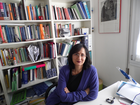
Area Storia e Filosofia
Competenze: cultura politica statunitense, pensiero femminista, politica interna statunitense, storia, storia e politica delle donne negli Stati Uniti
Parole chiave: cittadinanza, delegittimazione, first lady, leadership, liberalismo, presidenza, Stati Uniti
Regione: Emilia-Romagna
Funzione/Ruolo
Coordinatrice del Centro Studi sugli Stati Uniti – LAB-USA e Membro del comitato direttivo dell’Associazione Il Mulino.
Percorso professionale
Dopo la laurea con 110 e lode presso la Facoltà di Lettere dell’Università di Firenze con una tesi in Storia americana, nel 1992 Raffaella Baritono consegue un dottorato di ricerca in Storia delle Americhe presso l’Università di Genova. Nel 1993 ottiene una borsa post-dottorale presso l’Università di Bologna della durata di un biennio. Presso lo stesso ateneo vince il concorso per ricercatrice universitaria per il settore SPS/05, poi, a partire dal 2003, quello per professoressa associata. Conseguita l’abilitazione nazionale, assume infine il ruolo per la prima fascia a partire dal 2019.
Raffaella Baritono ha avuto varie esperienze di ricerca e di formazione all’estero: alla University of Wisconsin, Madison; presso il Salzburg Global Seminar; presso il Fulbright American Studies Institute, organizzato dalla Southern Illinois University e al Roosevelt Institute di New York. Ha trascorso periodi di ricerca a New York, Bloomington (IN), Oxford, Londra, Middelburg (Olanda).
Nel corso della sua carriera ha ricoperto numerose cariche: è stata presidente della Società Italiana delle Storiche e vicepresidente dell’AISNA (Associazione Italiana di Studi Nordamericani). Ha fatto parte del direttivo della SISI (Società di Storia Internazionale) ed ha diretto il CISPEA (Centro Interuniversitario di Storia e Politica Euro-Americana).
Il suo impegno si è manifestato anche in ambito editoriale: ha infatti ricoperto il ruolo di co-direttrice di Ricerche di Storia Politica, riconosciuta come rivista di fascia A per l’area 11 e l’area 14, ed ha fatto parte dei comitati di direzione di Ricerche di Storia Politica e Scienza&Politica per l’editrice Il Mulino. Fa parte dell’Associazione di cultura e di politica dell’omonima editrice.
E’ stata membro del comitato di redazione della rivista Genesis e di quello della collana della Società Italiana delle Storiche, in collaborazione con la casa editrice Viella.
Il suo ruolo mediatico l’ha vista collaboratrice di alcune trasmissioni di argomento storico, e in particolare ha lavorato per “Passato e presente” e in precedenza “Il tempo e la storia”, e “Correva l’anno”, tutte prodotte da Rai 3- Rai storia.
È stata ed è presente come opinionista in varie trasmissioni televisive e radiofoniche, dove interviene su temi legati in particolare alla politica statunitense.
Risultati scientifici
Le principali aree di ricerca di Raffaella Baritono si sono focalizzate fin dall’inizio della sua carriera nelle Scienze sociali e nella costruzione dello Stato negli Stati Uniti. Sempre nell’ambito della storia politica Usa ha studiato la democrazia industriale e quella partecipativa nel progressismo statunitense
Ha approfondito il tema della Democrazia e del pluralismo nel pensiero manageriale di Mary Parker Follett e la leadership femminile nella democrazia ottocentesca negli Stati Uniti. Ha focalizzato la sua ricerca sulle figure delle first ladies nella presidenza americana e in particolare quella di Eleanor Roosevelt, fra liberalismo, internazionalismo e impegno per i diritti umani.
Seguendo sempre il suo interesse per le donne e la loro emancipazione ha studiato la nascita del movimento suffragista americano e in particolare la convenzione di Seneca Falls, il femminismo americano negli anni Sessanta e Settanta e a seguire i movimenti internazionali delle donne e di recente il femminismo afro-americano e post-coloniale.
Attività editoriali e pubblicazioni
Raffaella Baritono è membro del comitato direttivo della rivista Ricerche di Storia Politica e del comitato direttivo della rivista Il Mulino.
(2017) Baritono R., ed., Political History Today: Power, Subjects, Categories, special issue “Ricerche di Storia Politica”.
(2018) Baritono R., «Poverty is an expensive luxury. We cannot afford it»: Eleanor Roosevelt e l’America della Great Depression, in “Storia delle donne”, [S.l.], 3 (17): 229-251.
(2018) Baritono R., Intersectionality: a buzzword or a useful category of analysis?, “Iride”, XXXI (84): 295-305.
(2018) Baritono R., L’enigma ‘Stato’ nella riflessione politica e storiografica statunitense, in “Quaderni di Scienze Politiche Università Cattolica del Sacro Cuore”, VIII (14): 103-128.
(2018) Baritono R., «Dare conto dell’incandescenza». Uno sguardo transatlantico (e oltre) ai femminismi del lungo ’68, “Scienza & Politica”, XXX (59): 17-40.
(2018) Baritono R., Rappresentazioni di genere, diritti delle donne e leadership femminili nei populismi contemporanei, in M. Anselmi, P. Blokker, N. Urbinati (a cura di), Populismo di lotta e di governo, Milano, Feltrinelli: 82-103.
(2019) Baritono R., Smart Government vs. Deep State: State and Nation, Delegitimization and Political Vision, in Barack Obama and Donald Trump’s Presidential Speeches, in U. Rubeo (a cura di), The New Language of American Democracy, “Costellazioni”, III (8): 15-34.
(2020) Baritono R. e Ricciardi M. (a cura di), Strategie dell’ordine: processi, fratture, soggetti, Bologna, Quaderni di Scienza Politica, n. 8.
(2020) Baritono R., Delegitimization and the American presidential campaign (1896-1980), “American Studies in Scandinavia”, 52 (2): 145-162.
(2020) Baritono R., Efficienza, ordine e democrazia nelle scienze sociali americane (1890-1929), in R. Baritono e M. Ricciardi (a cura di), Strategie dell’ordine: processi, fratture, soggetti, Quaderni di Scienza&Politica, (8): 163-185.
(2020) Baritono R., “Mrs. Roosevelt Goes on Tour:” Eleanor Roosevelt’s Soft-Diplomacy during World War II, in D. Fazzi and A. Luscombe, (eds.), The Global Citizen: Eleanor Roosevelt’s Views on Diplomacy and Democracy, New York, Palgrave: 41-61.
(2020) Baritono R., Un paese latecomer? Donne e rappresentanza politica negli Stati Uniti contemporanei in P. Gabrielli (a cura di), Elette ed eletti. Rappresentanza e rappresentazioni di genere nell’Italia Repubblicana, Soveria Mannelli, Rubbettino: 71-88.
Riconoscimenti e premi
Per l'anno 1992, ha vinto il premio "Opera Prima" intitolato alla memoria di Roberto Ruffilli per il volume Oltre la politica. La crisi politico-istituzionale negli Stati Uniti fra Otto e Novecento, Bologna, Il Mulino, 1993.
Nel 2003 vinto il premio ‘Gisa Giani’, promosso dall’Istituto per la cultura e la storia d’impresa (Terni), per il libro La democrazia vissuta. Individualismo e pluralismo nel pensiero di Mary Parker Follett.

Funzione/Ruolo
Ricercatrice integrata CITER (Centro di Ricerca in Teologia e Scienze Religiose dell'Università Cattolica Portoghese).
Professoressa a contratto della Facoltà di Teologia all'Università Cattolica Portoghese di Lisbona.
Percorso professionale
Teresa Bartolomei si laurea in Filosofia del Linguaggio all’Università La Sapienza, Roma. Svolge attività di ricerca nella J.W. Goethe-Universität, a Francoforte, con K.O. Apel, e in seguito come ricercatrice indipendente e pubblicista. Consegue il Dottorato in Teoria della Letteratura all’Università di Lisbona. Dal 2017 è ricercatrice integrata nel Centro di Ricerca in Teologia e Scienze Religiose (CITER) dell’Università Cattolica Portoghese (UCP), dove svolge attività di insegnamento come professoressa a contratto nella Facoltà di Teologia.
Risultati scientifici
Dopo l’attività di ricerca in filosofia del linguaggio con il professor Tullio De Mauro, con cui si è laureata (autori di riferimento: I. Kant, W. von Humboldt; L. Wittgenstein), Teresa Bartolomei ha intrapreso un progetto di ricerca sulla pragmatica trascendentale e l’etica del discorso. Nella sua tesi di dottorato, Figura huius mundi: Figure liriche della temporalità in Emily Dickinson, applica un modello figurale di temporalità ricostruito sulla base delle lettere paoline all’analisi della produzione poetica di E. Dickinson dedicata all’esperienza temporale. In seguito, ha ripreso e sviluppato lo studio dei testi paolini con particolare riferimento alla forma ecclesiale e al suo rapporto con la cittadinanza (Radix Matrix, 2018). Si inserisce nel dibattito attuale sui temi etici legati alla crisi ecologica, alla luce dei testi biblici: nel libro Dove abita la luce (2019), in cui affronta la tematica della crisi ecologica a partire da una rilettura della figura di Noè.
Attività editoriali e pubblicazioni
[2020] Teresa Bartolomei, “Sensibili all’umano. L’attenzione alla cultura comune nell’esercizio del ministero”, in: Rivista del Clero, 12, 2020, pp.879-900.
[2020] Teresa Bartolomei, “A serpente e o bezerro. A idolatria como patologia simbólica. Um ponto de vista bíblico”, in: Ephata, 2, no. 2 (2020), pp. 177-237 (ISSN: 2184-5778), pp.177‑237.
[2019] Teresa Bartolomei, Dove abita la luce? Figure in cammino sulla strada della Parola. Vita e Pensiero. Milano.
[2018] Teresa Bartolomei, Radix, Matrix. Community Belonging and the Ecclesial Form of Universalistic Communitarism. Lisbon: Universidade Católica Editora 2018.
[2018] Teresa Bartolomei, “As comunidades: memória viva das democracias”. In: REVER - Revista de Estudos da Religião, Nr. 3, 2018. Dossier «Religião, memória e identidade na Europa» http://revistas.pucsp.br/rever/article/view/40706 DOI: https://doi.org/10.23925/1677-1222.2018vol18i3a2 .
[2017] Teresa Bartolomei, “IL POETA ALL’INFERNO. L’altro viaggio della poesia”, Humanitas, 72 (1/2017), pp. 116-131.
[2008] Teresa Bartolomei, “Minority Report”, in: Conférence, Nr. 26, Printemps 2008, pp.369-392.
[1994] Teresa Bartolomei, “Das narrative Sinnverstehen und die Grenzen der Hermeneutik“, in: K.O.Apel und M. Kettner (eds.), Mythos Wertfreiheit? Neue Beiträge zur Objektivität in den Human- und Kulturwissenschaften. Campus Verlag, Frankfurt/New York 1994, pp. 133-156.
[1990] AA.VV., Etiche in dialogo: Tesi sulla razionalità pratica. A cura di Teresa Bartolomei Vasconcelos e Marina Calloni. Marietti, Genova 1990.
[1990] Teresa Bartolomei, “La giustezza, la giustizia, e la loro inconciliabilità storica. Sino a che punto l’etica del discorso è e può essere puramente procedurale?”. Introduzione, in: AA.VV., Etiche in dialogo. Tesi sulla razionalità pratica. A cura di Teresa Bartolomei Vasconcelos e Marina Calloni. Marietti, Genova 1990, pp.13-27.
[1987] Teresa Bartolomei, “Il poeta e il boscaiolo. Excursus sul concetto di soggettività in Wilhelm von Humboldt”, in: AA.VV., Le vie di Babele. Percorsi di storiografia linguistica (1600- 1800). A cura di D. Di Cesare e S. Gensini. Marietti, Casale Monferrato 1987, pp.72-81.
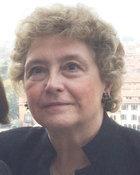
Area Storia e Filosofia
Competenze: storia, storia della storiografia antica, storia del pensiero politico greco, storia politica e istituzionale dell'Atene classica
Parole chiave: Atene classica, democrazia, diritto attico, epidemie nel mondo antico, istituzioni, pensiero politico greco, storiografia
Regione: Lombardia
Funzione/Ruolo
Professoressa ordinaria di Storia greca all'Università Cattolica del Sacro Cuore di Milano e Vicepresidente dell’Istituto Lombardo Accademia di Scienze e Lettere.
Percorso professionale
Laureatasi nel 1978 all'Università Cattolica del Sacro Cuore di Milano Cinzia Bearzot ha lavorato come ricercatrice presso la stessa università a partire dal 1984. Dal 1987 ha ricoperto l’incarico di professoressa associata presso l’Università di Venezia Ca’ Foscari, per poi far ritorno alla Cattolica di Milano nel 1993 prima come associata e in seguito, a partire dal 2021, come professoressa ordinaria di Storia greca. Nell’ateneo milanese è coordinatrice della Scuola di dottorato in “Studi umanistici. Tradizione e contemporaneità” della Facoltà di Lettere e Filosofia.
Bearzot svolge anche attività editoriale, come direttrice della rivista “Erga/Logoi. Rivista di storia, letteratura, diritto e culture dell’antichità” (fascia A Anvur), e della collana “Quaderni di Erga/Logoi”. E’ condirettrice della Rivista “Politica antica” (fascia A Anvur) e fa parte del Comitato scientifico di altre riviste e collane di argomento storico.
Risultati scientifici
I primi studi di Cinzia Bearzot si sono focalizzati sulla figura di Isocrate e sulla democrazia ateniese del IV secolo, con attenzione particolare ai suoi critici. In seguito la sua ricerca si è orientata verso l’analisi della crisi della democrazia ateniese alla fine del V secolo, con particolare attenzione ai fatti visti dal punto di vista degli oppositori (Teramene) e dei sostenitori (Lisia). Nel corso della sua carriera si è anche dedicata a studi di storiografia antica, a temi di diritto attico, di federalismo antico e ha approfondito le relazioni che intercorrevano fra Greci e stranieri.
Attività editoriali e pubblicazioni
[1985] Bearzot C., Focione tra storia e trasfigurazione ideale, Vita & Pensiero.
[1992] Bearzot C., Storia e storiografia ellenistica in Pausania il Periegeta, Il Cardo.
[1993] Bearzot C. (a cura di), Plutarco, Vita di Focione, BUR.
[1997] Bearzot C., Lisia e la tradizione su Teramene. Commento storico alle orazioni XII e XIII del corpus lysiacum, Vita & Pensiero.
[2004] Bearzot C., Federalismo e autonomia nelle Elleniche di Senofonte, Vita & Pensiero.
[2005; 20112; 20153] Bearzot C., Manuale di storia greca, Bologna, Il Mulino, 2005; 20112; 20153.
[2007] Bearzot C., Vivere da democratici. Studi su Lisia e la democrazia ateniese, L’“Erma” di Bretschneider.
[2008] Bearzot C., La giustizia nella Grecia antica, Carocci.
[2009] Bearzot C., La polis greca, Il Mulino.
[2012] Bearzot C., I Greci e gli altri. Convivenza e integrazione, Salerno.
[2013] Bearzot C., Come si abbatte una democrazia. Tecniche di colpo di stato nell’Atene antica, Laterza.
[2014] Bearzot C., Il federalismo greco, Mulino.
Riconoscimenti e premi
Cinzia Bearzot ha ricevuto il Premio per le pubblicazioni di Alta Qualità istituito dall’Università Cattolica del Sacro Cuore per l’anno 2019, con “ À propos du terme ψεῦδος dans l'historiographie ancienne, studio contenuto nel volume Th. Blank, F.K. Maier, Die symphonische Schwestern. Narrative Konstruktion von „Wahrheiten” in der nachklassischen Geschichtsschreibung, Stuttgart 2018, 31-47.

Funzione/Ruolo
Ricercatrice post-doc presso il Centre de Recherche en Éthique (CRÉ), Université de Montréal, Canada.
Percorso professionale
Dopo la laurea triennale in Filosofia presso l’Università di Pisa, Federica Berdini consegue la laurea specialistica in Filosofia presso l’Università Vita-Salute San Raffaele. Durante il dottorato, all’Università di Bologna, svolge periodi di ricerca come Visiting Fellow presso l’Università di Harvard e l’Università di Vienna. Dopo il dottorato è post-doc alla Ludwig-Maximilians-Universität di Monaco e insegna part-time presso la Ted Rogers School of Management della Ryerson University. Svolge anche periodi di ricerca presso l’Università di Toronto e l’Università di Waterloo. Attualmente è ricercatrice post-doc presso il Centre de Recherche en Éthique (CRÉ) dell’Université de Montréal. Fa parte del direttivo della SWIP Italia - Società Italiana per le Donne in Filosofia, che ha contribuito a fondare.
Risultati scientifici
La ricerca di Federica Berdini si concentra principalmente sull’agency umana (capacità di agire), la sua attribuzione intersoggettiva e il suo riconoscimento a livello sociale. In particolare, è interessata ai casi di agency esercitata in condizioni non ideali o da agenti ‘imperfetti’. Nella tesi di dottorato ha esaminato la versione kantiana del costitutivismo in teoria dell’azione, proponendone un ampliamento volto a rendere conto del problema delle cosiddette azioni ‘difettose’ e offrendo un’elucidazione delle norme costitutive dell’agency umana. Con il suo attuale progetto di ricerca Federica Berdini vuole analizzare le nozioni psicologiche di ‘coping’ e di resilienza. Il suo scopo è di indagare le responsabilità (individuali e collettive) in gioco per il superamento di situazioni in cui l’agente si trova a dover far fronte a stress, individuando per esempio se e quando l’agente sia vittima di possibili ingiustizie. Altro filone di studio è quello della giustizia sociale, da un punto di vista intersezionale.
Attività editoriali e pubblicazioni
[2019] Berdini, F. Agency’s Constitutive Normativity: An Elucidation. Journal of Value Inquiry, 53 (4): 487-512.
[2019] Berdini, F. Agency and Authorship: Towards a Socially Situated, Interactionist View. In A. Siegetsleitner et al. (a cura di), Crisis and Critique: Philosophical Analysis and Current Events. Contributions of the Austrian Ludwig Wittgenstein Society, Vol. XXVII, pp. 15-17.
[2013] Berdini, F. Speech Acts and Normativity: A Plea for Inferentialism. Esercizi Filosofici, 8 (2): 71-88.
[2015] Berdini, F. Conversation with Lawrence Blum. APhEx 12.
[2013] Berdini, F., Bianchi, C. J. L. Austin. The Internet Encyclopedia of Philosophy.
[2013] Berdini, F., Bianchi, C. Profilo di John Langshaw Austin. APhEx 7: 674-710.
[2012] Berdini, F. Rationality as the Normative Dimension of Speech Acts. Phenomenology and Mind 2: 200-207.
Riconoscimenti e premi
Nel 2018 riceve il Journal of Value Inquiry Essay Prize dell’American Philosophical Association per il suo articolo “Agency’s Constitutive Normativity: An Elucidation”.
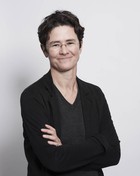
Funzione/Ruolo
Professoressa ordinaria di Filosofia del Linguaggio e Presidente del Consiglio del Corso di Laurea in Filosofia presso la Facoltà di Filosofia dell'Università Vita-Salute San Raffaele di Milano.
Componente del Direttivo della SWIP Italia, Società per le donne in filosofia.
Percorso professionale
Laureata in Filosofia presso l'Università degli Studi di Milano, Claudia Bianchi consegue il dottorato di ricerca in Epistemologia presso il CREA – École Polytechnique di Parigi. Si specializza presso le Università del Piemonte Orientale, di Padova, e di Genova. Dal 2004 è docente di Filosofia del Linguaggio presso la Facoltà di Filosofia dell’Università Vita-Salute San Raffaele e dal 2015 è professoressa ordinaria di Filosofia e Teoria dei linguaggi.
Risultati scientifici
Il suo campo di ricerca è la pragmatica - lo studio dell’uso del linguaggio in concrete situazioni comunicative - e la sua applicazione ai domini dell’epistemologia, dell’etica, della filosofia politica e dei gender studies. Lo scopo della sua indagine è l’elaborazione di teorie comunicative che possano servire da base all’azione politica e alla promozione di cambiamenti sociali. Claudia Bianchi si occupa in particolare di hate speech, epiteti denigratori, e pornografia intesa come forma di linguaggio d’odio.
Attività editoriali e pubblicazioni
È autrice e coautrice di diversi volumi e di numerosi articoli scientifici.
(2021) Bianchi C., Hate speech. Il lato oscuro del linguaggio, Roma-Bari, Laterza.
(2020) Bianchi, C. “Discursive Injustice: The Role of Uptake”, Topoi, DOI: 10.1007/s11245-020-09699-x.
(2019) Bianchi, C. “Asymmetrical Conversations: Acts of Subordination and the Authority Problem”, Grazer Philosophische Studien, Vol. 96, pp. 401-418.
(2019) Cepollaro, B., Sulpizio S. and Bianchi, C. “How bad is to report a slur? An empirical investigation”, Journal of Pragmatics, 146, pp. 32-42.
(2014) Bianchi C. “How to Do Things with (Recorded) Words”, Philosophical Studies, 167, 2, pp. 485-495.
(2014) Bianchi C. “Slurs and appropriation: an echoic account”, Journal of Pragmatics 66, pp. 35-44.
(2013) Bianchi C. "Implicating", in M. Sbisà and K. Turner (eds.) Pragmatics of Speech Actions, Handbooks of Pragmatics (HoPs) Vol. 2, Berlin, Mouton de Gruyter, pp. 83-118.
(2009) Bianchi C., Pragmatica cognitiva. I meccanismi della comunicazione, Roma-Bari, Laterza, 3a edizione 2020.
(2008) Bianchi C. "Indexicals, speech acts and pornography", Analysis, 68, 4, pp. 310-316.
(2006) Bianchi C. "‘Nobody loves me’: Quantification and Context", Philosophical Studies, 130, 2, pp. 377-397.
(2005) Bianchi C. e Vassallo N. (a cura di), Filosofia della comunicazione, Roma-Bari, Laterza, ISBN 88-420-7650-3, 3a edizione 2010.
(2003) Bianchi C., Pragmatica del linguaggio, Roma-Bari, Laterza, 13a edizione 2020.
Riconoscimenti e premi
Nel corso degli anni è stata membro del comitato direttivo della SIFA (Società Italiana di Filosofia Analitica) e del comitato esecutivo della SFL (Società di Filosofia del Linguaggio). Attualmente fa parte del Consiglio direttivo del CRESA, Centro di Ricerca in Epistemologia Sperimentale e Applicata, del Comitato di Direzione dell’Interfaculty centre for gender studies e del Direttivo della SWIP Italia, Società per le donne in filosofia.

Area Storia e Filosofia
Competenze: archivistica, biblioteconomia, emancipazione economica delle donne, storia, storia delle donne e di genere, storia sociale
Parole chiave: archivi, biblioteche scolastiche, empowerment femminile, gender history, public history, storia urbana, uguaglianza di genere
Regione: Puglia
Funzione/Ruolo
Ispettrice onoraria di Archivi, già direttrice presso il Ministero della Cultura. Consulente in beni culturali.
Percorso professionale
Dopo la Laurea in Lingue e letterature straniere, si abilita all’insegnamento negli istituti secondari e si specializza in Biblioteconomia e in Storia Regionale Pugliese presso l’Università del Salento. Vincitrice di concorsi come direttrice coordinatrice di Biblioteca del Ministero della Cultura viene assegnata alle sedi degli Archivi di Stato di Brindisi e Lecce. Svolge attività di docenza presso la Scuola di Specializzazione del MIC (Ministero della Cultura). Avvia percorsi di ricerca sulle fonti archivistiche relative agli studi sociali e di genere, è relatrice in numerosi seminari per l’amministrazione ed in Convegni nazionali ed internazionali; è commissaria in concorsi del Ministero della Cultura, ha la curatela di mostre ed eventi presso Istituzioni civili, scolastiche, e presso le sedi degli Archivi di Stato di Brindisi e Lecce. Promuove la valorizzazione delle fonti e la metodologia della ricerca. Svolge attività di didattica della ricerca documentale. Collabora (incarico di progetto di ricerca sul ruolo sociale femminile tra Otto e Novecento in Terra d’Otranto) con il Dipartimento di Storia, Società e Studi sull’Uomo dell’Università del Salento. Membro del Centro Studi Relazioni Atlantico-Mediterraneo (CESRAM). Membro del Laboratorio di Public History e del comitato provinciale dell’Istituto di Storia del Risorgimento, Membro dell’associazione “Coscienza Civica” e del Comitato di valorizzazione della cultura per la Repubblica presso la Prefettura di Lecce, promuove la cittadinanza attiva, la valorizzazione del ruolo femminile e la sensibilità alla corretta conservazione e valorizzazione del patrimonio civico. Cura progetti, in particolare docufilm, che riguardano la trasmissione dei patrimoni delle comunità nell’area del Salento, privilegiando la divulgazione scientifica della storia di genere. Da oltre dieci anni si occupa di tutela e valorizzazione del patrimonio archivistico di istituzioni civiche, scolastiche e di privati. Dal 2018 è Ispettrice Archivistica onoraria (Ministero della Cultura-Soprintendenza Puglia)
E’ autrice del volume: “ Stampa periodica in Terra d’Otranto: fonte pericolosa per la sicurezza, pregio e rarità per gli archivi”. E’ autrice di oltre cento saggi che per la maggior parte riguardano studi sulle fonti di storia sociale/urbana e di storia di genere.
Risultati scientifici
I suoi principali interessi di ricerca riguardano il ruolo sociale delle donne nello spazio urbano, la partecipazione popolare femminile, la trasmissione e divulgazione del patrimonio storico sociale, la valorizzazione e fruizione delle fonti.
Attività editoriali e pubblicazioni
E’ autrice di numerose pubblicazioni, tra cui le seguenti:
[2021] Bino G. Si tinsero di ‘rosa’ i campi…cento anni fa, in “ Le donne e la guerra” a c. di M. Spedicato e G. Caramuscio, collana della società di Storia Patria sez. di Lecce “ Cultura e Storia”.
[2020] Bino G. Le fonti archivistiche: Spazi temporali e geografici per gli ebrei del Salento in “Eunomia. Rivista semestrale di Storia e Politica Internazionali”, 9(1).
[ 2019] Bino G. Archivi scolastici: memoria sommersa della scuola? in “Eunomia. Rivista semestrale di Storia e Politica Internazionali”, 7(2). Il saggio contiene in appendice un repertorio di inediti profili femminili.
[2019] Bino G. Gli Archivi parlano di donne? Le donne sono nei magazzini di tabacco…in “ Non solo pane, ma diritti. Il contrastato movimento delle tabacchini salentine nel Novecento” a cura di M. Spedicato, Castiglione (LE) Giorgiani editore.
[2018] Bino G. Donne, bambini e anzianiin “La Grande Guerra in Terra d’Otranto: un progetto di Public History”, a cura di G. Iurlano, L. Ingrosso, L. Marulli, Monteroni di Lecce (LE), edizioni Esperidi.
[2017] Bino G. La biblioteca ‘storica’ del liceo ‘P. Siciliani’ in “Patrimonio di carta. Il fondo antico della Biblioteca e l’Archivio storico del Liceo “P. Siciliani” di Lecce a cura di G. Bino, et.al.., Lecce, Grifo.
[2017] Bino G. Biografie di Anna Antonaci, Clementina Fumarola De Pietro e Michela Pastore, in “Salentine. Regine, sante, nobili, borghesi e popolane. Una terra, cento storie”, Lecce, Grifo.
[2017] Bino G. Sulle tracce di Clementina Fumarola De Pietro in “Una vita di impegno civile e sociale: Michele De Pietro e Clementina Fumarola de Pietro”. Ordine degli Avvocati della Provincia di Lecce, Lecce, Grifo.
[2017] Bino G. Donne e regine: Maria e Isabella, storie oltre i tempiin “Isabella de’Clermont. Duchessa di Copertino e Regina di Napoli" a cura di M. Greco. G. Vallone e P. Corsi. Atti del Convegno di studi. Galatina, Panico.
[2016] Bino G. Virago della malavita macchiaiuola: donne fuori dalla società e dalla legge, in “ Eunomia. Rivista semestrale di Storia e Politica Internazionali”, 2.
[2016] G. BINO, Nutrire per nutrirsi. Dalla produzione agraria… tragghiamo quasi tutto lo stock che ci è necessario per vivere, in “ Culturae Loci Conventus”. Omaggio ad Annalisa Bianco, Lecce, Grifo.
[2016] G. BINO, Coi vecchi padri in casa…ed il focolare spento… noi donne andammo sui campi e nelle ‘industrie’…per un tozzo di pane, in “ Eunomia. Rivista semestrale di Storia e Politica Internazionali”, 1.

Area Storia e Filosofia
Competenze: biodiritto, bioetica, filosofia, filosofia analitica, filosofia del diritto
Parole chiave: attivazione e sospensione delle cure, bioetica, Covid-19, diritti umani, fine-vita, morte, multiculturalismo, obiezione di coscienza, qualità del morire, responsabilità, setting di cura, traffico d'organi, vaccini
Regione: Lombardia
Funzione/Ruolo
Professoressa ordinaria di Filosofia del diritto all'Università degli studi di Milano-Bicocca. Presidente di Comitato per l’etica di fine vita (CEF). Coordinatrice Collegio dei docenti della Società italiana di Filosofia del diritto (SIFD).
Percorso professionale
Patrizia Borsellino si laurea a Milano in Filosofia e in seguito a Pavia, in Giurisprudenza.
Svolge attività didattica e di ricerca all'Istituto di Filosofia e Sociologia del diritto della Facoltà di Giurisprudenza dell'Università degli Studi di Milano, quindi all’Università degli Studi dell’Insubria, dove dal 1995 al 2006 insegna Filosofia del diritto e Bioetica (dal 2001). Nel 2004/2005, è stata vice-direttrice del Master in Cure palliative.
Attualmente è professoressa ordinaria di Filosofia del diritto all’Università degli Studi di Milano Bicocca. Fa parte del Collegio dei docenti del Dottorato in Scienze giuridiche, del Comitato scientifico del “Dipartimento di eccellenza per il progetto Law and pluralism”, del Comitato etico dell’Ateneo.
E’ presidente del Comitato per l’etica di fine vita (CEF) con sede a Milano; membro del Comitato scientifico dell’Associazione VIDAS di Milano; membro dell’International Forum of Teachers (IFT) dell’UNESCO Chair in Bioethics, membro del Comitato scientifico dell’Associazione “Avvocatura LGBT Rete Lenford”, del Comitato scientifico del Centro Studi di Etica Pubblica (CeSEP) (Università del San Raffaele di Milano).
Ha ricoperto importanti ruoli in diverse istituzioni: membro del Comitato scientifico del Dottorato in Bioetica all’Università “Alma Mater” di Bologna, vice-presidente della Consulta di Bioetica Onlus, membro del Comitato etico istituito all’Azienda ospedaliera S. Anna di Como, componente del Comitato dei docenti della Scuola italiana di medicina palliativa (S.I.M.P.A).
Fa parte del comitato scientifico e editoriale di diverse riviste, tra cui la Rivista di Filosofia del diritto, Biodiritto-BiolawJournal; La Rivista italiana di cure palliative.
E’ coordinatrice del Collegio dei docenti della Società Italiana di Filosofia del diritto.
Risultati scientifici
Formatasi, negli studi filosofici, alla scuola di Mario dal Pra e, negli studi giuridici, alla scuola di Norberto Bobbio e di Uberto Scarpelli, Patrizia Borsellino ha affrontato in numerosi studi i temi centrali della riflessione filosofico-morale e filosofico-giuridica. Dopo i primi studi sulla configurabilità dell’etica come ambito di razionalità, la ricerca e l’attività didattica sono state svolte con attenzione all’analisi dei concetti giuridici, in tema di norma, ordinamento, di responsabilità e di diritti fondamentali. Oggetto di approfondimento sono state la questione del rapporto tra concezioni morali e soluzioni giuridiche nella cornice dello Stato costituzionale di diritto, il tema dell’obiezione di coscienza e la delineazione dei contorni di una società e di un’organizzazione politico-giuridica qualificabili come “laiche”.
Dagli inizi anni Novanta, ha affiancato un sempre più marcato e approfondito interesse per le questioni della bioetica, basato sulla convinzione che gli interventi bio-medici sull’uomo e sugli esseri viventi abbiano, oltre che implicazioni morali, anche implicazioni giuridiche di rilevanza tale da rientrare nella competenza dei giuristi e da richiedere l’impegno dei filosofi del diritto. La filosofia del diritto ha, infatti, da offrire alla bioetica un ricco patrimonio di riflessione sui modelli di diritto ai quali improntare le scelte normative, nonché sulla questione problema dei rapporti tra il diritto e la morale. I risultati degli studi di Patrizia Borsellino sono affidati a numerose pubblicazioni, oggetto centinaia di interventi e attività formativa in qualificate sedi di dibattito nazionali e internazionali. Tra i molti temi affrontati, la relazione medico-paziente (informazione e consenso all’atto medico, spettanza delle decisioni in relazione ai trattamenti sanitari, decisioni nelle situazioni di incapacità); la responsabilità degli operatori sanitari, le questioni etico-giuridiche di inizio vita (procreazione assistita e aborto) e di fine vita (accanimento terapeutico, rifiuto di cure, eutanasia); le problematiche sollevate dalla sperimentazione clinica e quelle connesse alla configurazione multietnica e multiculturale delle società occidentali; le questioni collegate alla pratica dei trapianti, con particolare attenzione al drammatico problema del “traffico d’organi”.
Attività editoriali e pubblicazioni
(2004) Borsellino P., Bioetica entre autonomia y derecho, Editorial Cajica, Puebla (Mexico).
(2012) Borsellino P., Consenso informato in medicina: aspetti etici e giuridici, Salute e società, XI, 3: 17-41; english version: Informed Consent: Some Philosophical-Legal Concerns, Salute e Società, http://www.francoangeli.it/riviste/sommario.asp?IDRivista=107&lingua=en-
(2014) Borsellino P., Norberto Bobbio metateorico del diritto, Maggioli, Milano.
(2015) Borsellino P., Limitation of the therapeutic effort: ethical and legal justification for withholding and/or withdrawing life sustaining treatments, in Multidisciplinary Respiratory Medecine , 10:5 (17 february).
(2016) Borsellino P., Bobbio filosofo del diritto dei giuristi, in Saporiti M. (a cura di), Norberto Bobbio, rigore intellettuale e impegno civile, Giappichelli Torino: 29-45.
(2016) Borsellino P., La sfida di una buona legge in materia di consenso informato e di volontà anticipate sulle cure, in Biolaw Journal-Rivista di Biodiritto, 3: 93-103.
(2017) Borsellino P., ll rifiuto delle cure e dei trattamenti medici vitali, in Cagnazzo A. (a cura di), Trattato di diritto e bioetica, ESI, Napoli :181-204.
(2018) Borsellino P., Bioetica tra “morali” e diritto. Nuova edizione aggiornata, Raffaello Cortina, Milano 2018.
(2018) Borsellino P., Porciani F., Vite a perdere. I nuovi scenari del traffico d’organi, FrancoAngeli, Milano.
(2019) Borsellino P, Dalla bioetica al biodiritto. Tra cultura e norma, in Rodotà S., Tallacchini M. (a cura di), Ambito e fonti del biodiritto, vol. I del Trattato di biodiritto, diretto da Rodotà S. e Zatti P., Giuffrè, Milano: 149-167.
(2020) Borsellino P., Covid-19. Quali criteri per l’accesso alle cure e la limitazione terapeutica in tempo di emergenza sanitaria?, in Notizie di Politeia, (36)138: 5-25.
(2020) Borsellino P., La sentenza della Corte costituzionale n. 242/2019: presupposti, punti fermi e questioni aperte, in D’Alessadro G., Di Giovine O. (a cura di), La corte costituzionale e il fine vita. Un confronto interdisciplinare sul caso Cappato-Antoniani, Giappichelli, Torino: 39-58.
Riconoscimenti e premi
Nel 2017 ha ricevuto il premio 'Unesco Chair in Bioethics per “I grandi sforzi, la competenza e la passione dimostrata nel comunicare la bioetica in tutto il mondo” (October 19th, 2017).
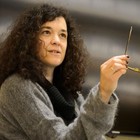
Funzione/Ruolo
Professoressa associata di filosofia e co-direttrice dell’Istituto per gli studi sul genere e la sessualita’ della New School (New York)
Percorso professionale
Chiara Bottici e’ filosofa e scrittrice. Ha insegnato teoria politica alla Goethe Universitaet di Francoforte ed è attualmente titolare di una cattedra in filosofia presso il dipartimento di filosofia della New School for Social Research di New York, oltreche’ direttrice di Gender Studies e dello Gender e Sexualities Studies Institute.
Risultati scientifici
Chiara Bottici si e’ occupata di filosofia delle relazioni internazionali, di teoria critica della società, e, piu’ di recente, di gender studies e femminismo. Oltre alla ricerca in campo filosofico è anche scrittrice.
Attività editoriali e pubblicazioni
Le sue pubblicazioni principali includono, tra gli altri: Men and States (2009, Palgrave), i volumi con Benoit Challand su The Myth of the Clash between Civilizations (2010, Routledge) ed Imagining Europe: Myth, Memory and Identity (Cambridge University Press, 2013), Imaginal Politics (per la serie di teoria critica della Columbia University Press, 2014; traduzione italiana in corso di pubblicazione presso Castelvecchi Editore), il volume Anarchafeminism (Bloomsbury, 2021, traduzione italiana in corso di pubblicazione con Laterza) e A Feminist Mythology (Bloomsbury, 2021, traduzione italiana in corso di pubblicazione con Castelvecchi Editore).

Area Storia e Filosofia
Competenze: filosofia, filosofia della religione, filosofia femminista, filosofia morale, mistica femminile
Parole chiave: Covid-19, Covid-19: effetti sulla vita personale, comunitaria e sociale, diritti umani, diversità e inclusione, etica, femminismo, multiculturalismo, politica delle donne
Regione: Lazio
Funzione/Ruolo
Professoressa di Filosofia Morale, Filosofia della Religione e Filosofia delle Differenze e Direttrice del Dipartimento di Filosofia della Facoltà di Lettereall'Università di Roma Tre. Presidente dell’Osservatorio di Studi di Genere, Parità e Pari Opportunità (GIO) (Sapienza, Tor Vergata, RomaTre).
Percorso professionale
Dopo la laurea in Filosofia Morale presso l’Università Sapienza di Roma (1967), lavora prima come assistente e poi come Professoressa Associata presso la Facoltà di Magistero di Roma e di Professoressa Ordinaria di Filosofia Morale presso l’ateneo Roma Tre, Facoltà Lettere e Filosofia, di cui è Direttrice di Dipartimento dal 1998 al 2006. Negli stessi anni è Delegata del Rettore per le Pari opportunità - Studi di genere. Attualmente è Professoressa senior.
Ha guidato molti progetti di ricerca europei e sviluppato nuovi percorsi didattici come il Corso di perfezionamento post-lauream in Storia e Temi del Pensiero Femminile, diventato poi dal 2001 un Master di II livello “Formatori ed esperti in Pari opportunità” e il Corso di perfezionamento post-lauream in Scienze delle Religioni, trasformatosi poi in Master internazionale.
È stata Presidente della Sezione Romana della Società Filosofica Italiana (SFI), e Vicepresidente del Direttivo della SFI nazionale.
Risultati scientifici
La ricerca di Francesca Brezzi, negli anni 70-90, si concentra su tematiche filosofico-morali, con particolare riferimento alla filosofia francese contemporanea (esistenzialismo, fenomenologia esistenziale, filosofia riflessiva, ermeneutica). Brezzi è una delle massime studiose di Paul Ricoeur, su cui nel 1969 scrive la prima monografia mai redatta e nel 2006 l’importante volume Introduzione a Paul Ricoeur per Laterza. Tra gli altri filosofi che privilegia nei suoi studi emerge E. Lévinas, legato ad altri pensatori, che si considerano eredi della fenomenologia, come Marcel e Ricoeur.
Nell’ambito della Filosofia morale allarga il suo campo di studio al pensiero contemporaneo focalizzandosi da un lato sull’incontro/scontro dell’indagine filosofica con i temi giuridici e politici, dall’altro sul tema della diversità (culturale, religiosa, etnica, di genere), includendo gli interrogativi sui diritti umani. A questi ambiti si aggiunge lo studio del rapporto tra filosofia e mistica, che si inserisce nell’ambito del suo insegnamento di Filosofia della religione. Scrive sulle più importanti pensatrici contemporanee (Simon de Beauvoir, Luce Irigaray, Simone Weil, Edith Stein, Maria Zambrano, Judith Butler, etc.) ma disegna anche nuove mappe di saperi, destrutturando e ristrutturando significati già codificati, risemantizzando campi linguistici, reagendo al vuoto di memoria, all’assenza nella storia, facendo riemergere un continente sommerso, quello che secondo S. Moeller Oikin è "il prisma dell'appartenenza sessuale". Mostra il valore filosofico di figure emarginate tra cui alcune donne mistiche come Angela da Foligno, Maddalena de’ Pazzi e Jeanne Guyon.
A partire dall’Antigone approfondisce molte tematiche attuali sulla cittadinanza delle donne e i diritti umani e si concentra sul rispetto delle diversità culturali nelle società multietniche e soprattutto sul rapporto femminismo - multiculturalismo, ambiti di notevole fecondità educativa, necessari per poter formare cittadini di un mondo complesso e interrelato. Gli ultimi sviluppi sono volti al tema della cittadinanza e dell’identità europea per indagare come fondare, attraverso la combinazione di diritti sociali civili e politici, la capacità politica di agire delle persone (in particolare delle donne e dei movimenti femministi). Una divagazione, ma non troppo, è la sua rilettura del futurismo in Quando il futurismo è donna. Barbara dei colori, testo che indaga sulla presenza delle donne in un movimento così misogino.
I suoi interessi più recenti proseguono sul filone del “pensare altrimenti”, esplorando i rapporti filosofia - letteratura come in Nel labirinto del pensiero. Borges e la filosofia.
Infine nell’opera Gioco senza regole. Homo ludens tra filosofia, letteratura e teologia riprende un suo interesse per il valore filosofico del concetto di gioco.
Attività editoriali e pubblicazioni
È autrice di diversi volumi ed editoriali della rivista B@bel. Collabora con importanti riviste italiane e straniere.
Volumi:
(2005) (2 ed.), Brezzi F., Antigone e la philia. Le passioni tra etica e politica, Franco Angeli, Milano.
(2006) Brezzi F., Introduzione a Ricoeur, Laterza, Bari.
(2009) Brezzi F., Quando il futurismo è donna. Barbara dei colori, Mimesis Milano (ed. francese 2010)
(2009) Brezzi F., Strickland E., Ferrari Occhionero M., Introd.e cura di Equal opportunities and Human Rights, Laterza, Roma.
(2010) Brezzi F., Una voce differente: Diotima presente al Simposio, introduzione e cura a A. Heller, Il Simposio di San Silvestro, Mimesis, Milano.
(2011) Brezzi, M.Teresa Russo, Oltre la società degli individui .Teoria ed etica del dono, Bollati Boringhieri, Torino.
(2012) Brezzi F., Piccolo manuale di Etica, Donzelli editore, Roma.
(2014) Brezzi F., Nel Labirinto del pensiero. Borges e la filosofia, ETS Editori, Pisa.
(2018) Brezzi F., Gioco senza Regole, Castelvecchi editore, Roma.
(2019) Brezzi F., Utopia, come pensare altrimenti, in “Infiniti mondi” 11, pp.85-106.
(2019) Brezzi F., Identità Femminile: differenza, corporeità, vulnerabilità, Edith Stein tra passato e presente, a.c. Angela Ales Bello, Castelvecchi editore, Roma, pp.155-174.
(2020) Brezzi F., Società, democrazia, religione: circolarità vivente, in Esperienza, contingenza valori, Quodlibet, Macerata, pp.41-49.
(2020) Brezzi F., Philia e dono, virtù fragili? dall’identità singolare verso un nuovo legame sociale,in Virtù umane Virtù politiche a cura di G. Cotta, Mimesis, Milano Udine, 2020 pp,197-210.
Riconoscimenti e premi
Ha ricevuto il premio di Filosofia Città di Siracusa nel 2007, e nel 2011 Francesca Brezzi è l’unica donna italiana ad essere inserita nel First Women Inspiring Europe Calendar ideato dall ‘EIGE - European Institute for Gender Equality. Nello stesso anno riceve il premio “Donne Eccellenti di Roma” e uno speciale riconoscimento da parte dell’Istituto politico S. Pio V, con il patrocinio del Parlamento Europeo, della Camera dei Deputati e del Senato della Repubblica, peraver contribuito con la sua attività ad indagare la conoscenza delle diversità culturali in una società multietnica e per aver studiato tematiche relative al rapporto femminismo-multiculturalismo.
Nel 2016 vince il Primo Premio Nazionale di Filosofia Le figure del Pensiero per la Ricerca Accademica e per il Libro Filosofico Nel labirinto del pensiero. Borges e la filosofia e l’anno successivo per la rivista elettronica e cartacea “B@bel, Per pensare le differenze”, da lei ideata e diretta.
Ha fatto parte del comitato scientifico della Fondazione Lelio e Lisli Basso-Isocco e attualmente fa parte del Direttivo del Réseau International des Femmes Philosophes, promosso dall’UNESCO. È stata esperta giudicatrice di progetti Prin del MIUR per molti anni.
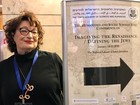
Area Storia e Filosofia
Competenze: storia, storia della stregoneria, storia dell’ebraismo e dei rapporti tra ebrei e cristiani, storia delle donne e di genere, storia delle emozioni, storia delle minoranze religiose, storia dell’ Inquisizione e delle persecuzioni: streghe, ebrei, musulmani, storia sociale dell’età moderna
Parole chiave: diritti, discriminazione, femminismo, Inquisizione, lessico antisemita, multiculturalismo, scritture femminili, uguaglianza
Regione: Lazio
Funzione/Ruolo
Professoressa onoraria di Storia moderna, all'Università di Roma "La Sapienza", Facoltà di Lettere e Filosofia, Dipartimento di Storia culture religioni arte spettacolo (SARAS).
Percorso professionale
Marina Caffiero si laureain Storia Moderna all’Università di Roma La Sapienza ed è ricercatrice dal 1982 nella stessa disciplina. Nel 1992 vince il concorso come Professoressa associata ed è chiamata come docente di Storia Moderna all’ Università di Camerino e poi all’Università di Roma La Sapienza. Nel 2000 vince il concorso per Professoressa ordinaria e da allora insegna Storia Moderna alla Sapienza, nel Dipartimento di Storia Culture Religioni, dove nel corso degli anni ricopre diversi incarichi. Dal 2006 al 2012 è direttrice Direttrice del Dottorato di ricerca in “Società, Politica e Culture dal Medioevo all’età contemporanea” presso il Dipartimento di Storia Moderna e Contemporanea. Dal 2012 al 2016 Direttrice del Dottorato di ricerca in “ Scienze Storiche Antropologiche e Religiose" presso il Dipartimento di Storia, Culture, Religioni. Nel 2016 è fondatrice del "Corso di Alta Formazione di Storia ebraica” che dirige fino al 2018. Nel 2017 è fondatrice del "Corso di Alta Formazione Women, Rights ,Cultures in time and space", che dirige fino al 2018.
Attualmente è professoressa onoraria di Storia Moderna, all'Università di Roma "La Sapienza", Facoltà di Lettere e Filosofia, Dipartimento di Storia culture religioni arte spettacolo (SARAS).
Risultati scientifici
La sua attività di ricerca riguarda soprattutto il campo degli studi di storia religiosa e culturale, in particolare relativamente ai rapporti tra politica e religione nel corso dei processi di secolarizzazione in atto in Italia e in Europa tra XVI e XXI secolo e con specifica attenzione alla storia dei rapporti con le minoranze religiose (Ebrei e Musulmani) , alle problematiche di genere e in particolare alle scritture delle donne.
Attività editoriali e pubblicazioni
Marina Caffiero è la fondatrice e direttrice, dal 2007, della Collana “La memoria restituita. Fonti per la storia delle donne” , pubblicata dalla casa editrice Viella e ora giunta al 15° volume. La Collana pubblica scritture femminili inedite prodotte da donne non letterate dal XV al XXI secolo. Dal 2009 è fondatrice e direttrice della rivista on line “Giornale di storia” (giornaledistoria.net).
Di seguito una selezione scelta delle sue pubblicazioni:
Monografie:
(2000) Caffiero M., Religione e modernità in Italia (secoli XVII-XIX) , Pisa-Roma, IEPI
(2004, 2009) Caffiero M.,Battesimi forzati. Storie di ebrei , cristiani e convertiti nella Roma de papi, Roma Viella.
(2011)- Caffiero M., Forced Baptisms. Histories of Jews, Christians and Converts in papal Rome, tradotto da Y l. Cochrane, University of California Press, Berkeley-los Angeles-London,
(2012) Caffiero M., Legami pericolosi. Ebrei e cristiani tra eresie, libri proibiti e stregoneria, Torino, Einaudi,
(2014, 2015) Caffiero M., Storia degli ebrei nell’Italia moderna. Dal Rinascimento alla Restaurazione, Roma, Carocci,
(2017) Caffiero M., Baptêmes forcés. Histoires de juifs, chrétiens et convertis dans la Rome des papes, Paris, Honoré Champion, 2017
(2019) Caffiero M., Il grande mediatore. Tranquillo Vita Corcos, Un rabbino nella Roma dei papi, Roma, Carocci.
(2020) Caffiero M., Profetesse a giudizio, Donne, religione e potere in età moderna, Brescia, Morcelliana.
Curatele:
(2008) M. Caffiero M., ed. , Rubare le anime. Diario di Anna del Monte ebrea romana, Roma, Viella
(2009), M. Caffiero M., ed., Le radici storiche dell'antisemitismo. Nuove fonti e ricerche, Roma, Viella
(2020) M. Caffiero M., ed., Donne e Inquisizione, Edizioni di storia e letteratura
(2021) M. Caffiero M., ed., L’Inquisizione e gli ebrei. Nuove ricerche, Edizioni di storia e letteratura
Riconoscimenti e premi
2002 La politica della santità. Nascita di un culto nell’età dei Lumi, Laterza, , International prize “Desiderio Pirovano” 2002, Italy;
2005 Battesimi forzati. Storie di ebrei cristiani e convertiti nella Roma dei Papi, Viella 2004: ” Prize of the Presidency of the Council of the Italian Government 2005, Italy
2008 Vero e falso. L’uso politico della storia, Donzelli, 2008: Prize “Renato B. Fabrizi” - ANPI delle Marche 2008, Italy;
2010 Award “Sapienza Ricerca 2010” for the programme “Womens writings (XVth-XXth centuries)", University of Rome Sapienza, Italy.
2015 Storia degli ebrei nell’ Italia moderna , Carocci 2014: " Prize “Benedetto Croce” 2015, Italy.

Funzione/Ruolo
Professoressa ordinaria di Storia Contemporanea presso il Dipartimento di Studi Umanistici dell’Università di Napoli Federico II.
Percorso professionale
Si laurea in Filosofia presso l’Università di Napoli Federico II nel 1985. Consegue il Dottorato di Ricerca in Storia e Civiltà presso l’Istituto Universitario Europeo nel 1992 e il Dottorato in Storia presso la Scuola Superiore in Studi Storici della Repubblica di San Marino nel 1995. Ottiene varie borse di studio postdottorali presso la University of Essex, lo University College London, l’Università di Napoli Federico II, l’Istituto di Storia Economica del Mezzogiorno (CNR) di Napoli. Dal 1998 al 2001 lavora come ricercatrice presso l’Istituto di Studi sulle Società del Mediterraneo del CNR di Napoli e insegna Storia Contemporanea presso l’Università della Calabria. Dal 2002 al 2011 è professoressa associata di Storia Contemporanea presso il Dipartimento di Scienze Politiche dell’Università di Napoli Federico II. Dal 2011 è professoressa ordinaria presso lo stesso ateneo.
È coordinatrice del Dottorato in Global History and Governance della Scuola Superiore Meridionale.
Risultati scientifici
Si è occupata di nobiltà e borghesie nel Mezzogiorno, di migrazioni d'élite, di sociabilità e associazionismo, di networks e minoranze imprenditoriali tra la Restaurazione e la Grande guerra.
Da qualche anno si occupa di storia globale e transnazionale, di migrazioni e stranieri, di diritti umani e di guerre con particolare riferimento al periodo compreso tra la Rivoluzione Francese e la Prima Guerra Mondiale.
Attività editoriali e pubblicazioni
Le sue pubblicazioni più recenti includono:
[2021] War and Citizenship. Enemy Aliens and National Belonging from the French Revolution to the First World War, Cambridge University Press.
[2018] ‘Colonial Subjects and Enemy Aliens: Confinement and Internment in Italy 1911-1919’, in S. Manz, P. Panayi, M. Stibbe (eds.), Internment during the First World War, London, Routledge.
[2017] ‘Subjects, Citizens and Aliens in Time of Upheaval. Naturalizing and Denaturalizing in Europe during WWI’, Journal of Modern History, 89/3.
[2016] ‘La cittadinanza alla prova della Grande Guerra: denaturalizzare I cittadini di nazionalità nemica in Francia’, Contemporanea, 2, 303-322.
[2016] ‘Tra la Sardegna e Katzenau: donne e uomini di nazionalità nemica al confino e nei campi di concentramento’, in S. Bartoloni (a cura di), La grande guerra delle italiane. Mobilitazioni, diritti, trasformazioni, Roma, Viella, pp. 249-270.
[2014] 'Property rights in time of war: sequestration and liquidation of enemy aliens' assets in Britain, Germany and France in the First World War', in Journal of Modern European History 12/4.
[2014] ‘Why and How Italy Invented an Enemy Aliens Problem in the First World War’, War in History, 21/2, pp. 142-169.
[2014] Aliens and Internal Enemies: Internment Practices, Economic Exclusion and Property Rights during the First World War of the Journal of Modern European History 12/4.
[2013] ‘Waging War on Civilians: The Expulsion of Aliens in the Franco-Prussian War’, Past & Present 221.
Riconoscimenti e premi
È stata Visiting Fellow del Minda de Gunzburg Center for European Studies, Harvard University (2009), Visiting Fellow del Freiburg Institute for Advanced Studies (2010-2011), due volte Member della School of Historical Studies, Institute for Advanced Study, Princeton (2011 e 2015), Visiting fellow del Zentrum für Zeithistorische Forschung, Potsdam (2012) e Visiting Fellow del Remarque Institute, New York University (2016).
È membro del Consiglio Scientifico dell’École Française de Rome dal 2017.
Dal 2019 presiede la Società Italiana per lo Studio della Storia Contemporanea.
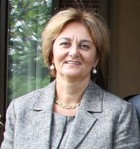
Area Storia e Filosofia
Competenze: diritti umani, filosofia, filosofia politica, filosofia sociale, sfera pubblica, studi di genere, teoria critica
Parole chiave: cittadinanza, Covid-19, Covid-19: impatto sulla cura di prossimità, Covid-19: impatto sulla violenza domestica, giustizia, migrazioni, multiculturalismo, violenza
Regione: Lombardia
Funzione/Ruolo
Professoressa ordinaria di Filosofia Politica e Sociale presso il Dipartimento di Sociologia e Ricerca Sociale dell' Università degli Studi di Milano - Bicocca
Percorso professionale
Marina Calloni si laurea in Filosofia all'Università di Milano, e prosegue gli studi con un dottorato di ricerca in Filosofia all'Università di Pavia e un dottorato di ricerca in Scienze Politiche e Sociali all'Istituto Universitario Europeo di Firenze.
Borsista all'Università di Francoforte, per sei anni è Senior researcher e direttrice dell'International Network for Research on Gender presso il Gender Institute della London School of Economics and Political Science a Londra. Ricopre incarichi didattici nelle università di diverse città europee (Brema, Vienna, Lugano, Hannover, Lodz, Cort, Bucarest, Skopje) e a Kurume, in Giappone. Nel 2011 ha ottenuto una distingueshed chair all’Università di Notre Dame in Indiana, Usa. Ha tenuto conferenze in tutto il mondo, dall’Europa agli Stati Uniti, dalla Russia alla Cina, dal Sudamerica all’Africa.
Dal 2002 è professoressa ordinaria di Filosofia Politica e Sociale presso il Dipartimento di Sociologia e Ricerca Sociale - Università degli Studi di Milano-Bicocca, in qualità di vincitrice del concorso nazionale volto al rientro di studiosi italiani impiegati all'estero (chiamata per chiara fama).
Dal 2016 è vicepresidente della Società Italiana di Filosofia Politica (SIFP), di cui è stata co-fondatrice. Dal 2018 è presidente della Commissionale per l’Abilitazione Scientifica Nazionale (ASN) in filosofia politica. Nel 2020 è stata nominata dal Presidente del Consiglio Giuseppe Conte membro del “Comitato di esperti in materia economica e sociale”, presieduto da Vittorio Colao.
Risultati scientifici
Marina Calloni ha da sempre cercato di far interagire attività di ricerca inter-culturale e multi-disciplinare con modalità d’insegnamento dinamiche e interattive, secondo una prospettiva internazionale e un interesse per le realtà locali, occupandosi in particolar modo di teoria politica, difesa dei diritti umani, questioni di genere.
Ha posto l’Università al centro di progetti di contrasto alla violenza di genere. Nel 2013 ha fondato all’Università di Milano Bicocca il progetto internazionale ADV-Against Domestic Violence, primo centro universitario dedicato a questo tema. Dal 2018 è responsabile del corso “Formare le operatrici /gli operatori sociali per il contrasto alla violenza di genere”, con 101 docenti. È attualmente responsabile scientifica di UNIRE (Università in rete contro la violenza), per la costituzione di una rete di università italiane ed europee, in collaborazione con il MUR e il Consiglio d’Europa. Sul ruolo dell’università è costantemente invitata dalle istituzioni, come nel 2019 dalla Commissione parlamentare di inchiesta su femminicidio, e nel 2018 dal Miur. Dal 2018 collabora con il Consiglio d'Europa per un progetto relativo all'applicazione della Convenzione di Istanbul.
Parallelamente si occupa di storia dell’antifascismo e di donne intellettuali di origine ebraica, e coordina (2019-2020) il progetto Ateneo Razza Istruzione, Le leggi antiebraiche del 1938, curando il sito e l’e-book (https://razzaeistruzione.unimib.it/). Ha diretto ricerche su "Genocidi e crimini di guerra"; "Solidarietà, Umanitarismo e Memoria collettiva" (con "Crimes of War Project"); "Immaginari politici d’Occidente"; “Immaginazione politica e confini dell'alterità ".
L’interesse nel campo dei diritti umani la porta a collaborare con UNHCR per una ricerca sui rifugiati in Italia, sostenendo universitari richiedenti asilo e progetti a favore di studenti della comunità degli Yazidi, vittime delle violenze di Daesh. Ha inoltre sviluppato alcuni studi sulle conseguenze delle nuove guerre, sull’umanitarismo sessuale e il diritto ai resti mortali, in relazione ai morti in mare nel corso dei processi migratori.
Attività editoriali e pubblicazioni
Direttrice della collana “RiGenarAzioni” presso Castelvecchi, è co-fondatrice della rivista Reset. Fra i 240 scritti scientifici in lingue diverse, si segnalano:
[2020] (a cura di), Il ruolo dell’Università nella lotta contro la violenza di genere. Ricerca, didattica e sensibilizzazione pubblica per la prevenzione del fenomeno, Milano: Pearson.
[2020] Women, Minorities, Populism. In: V. Kaul and A. Vajpeyi, (eds.), Minorities and Populism. Comparative Perspectives from South Asia and Europe. Cham: Springer, , 243-264.
[2020] Amelia Rosselli: Pragmatic imagination in exile. In: CPL Editions and Italian Cultural Institute, New York (eds.), Exile and Creativity, New York: CPL Editions, pp. 214-241.
[2019] (con L. Corchia), Zwischen kritischer Theorie und kommunikativer Vernunft: Die Habermas - Rezeption in Italien. In: L. Corchia, S. Müller-Doohm, W. Outhwaite (eds.), Habermas global. Wirkungsgeschichte eines Werks, Berlin: Suhrkamp, pp. 553-586.
[2019] Co-responsabilità multi-livello nell’età dei rischi comuni: Diritto al cibo e dell’ambiente. In: S. Petrucciani (eds.), Macropolitica. I nodi della politica globale, Milano: Mimesis, pp. 115-143.
[2019] Southern Europe: Gender Studies and Institutions in the Euro-Mediterranean Region. In: B. Kortendiek, B. Riegraf, K. Sabisch (eds.), Handbuch Interdisziplinäre Geschlechterforschung - Compendium of Interdisciplinary Gender Studies and Gender Research, Wiesbaden: Springer, vol. 2, pp. 1547-1558.
[2020] La divergente unità della “cosiddetta” Scuola di Francoforte. In: Quaderni di Teoria Sociale, n. 1-2, pp. 197-214.
[2018] Libertà individuale, giustizia sociale e lotta contro ogni oppressione. Il socialismo liberale di Carlo Rosselli. In: Politica & Società, , n. 3, pp. 319-352.
[2018] Diritti umani: sviluppo, responsabilità, sostenibilità, uguaglianza di genere. In: Harvard Business Review Italia, n. 4, pp. 10-13.
[2016] Filosofia sociale, critica pragmatica e discorso pubblico. In: Politica e Società, n. 3, pp. 325-342.
[2016] Nuove guerre trans-nazionali e crisi dei tradizionali costrutti politici. In: Sociologia, n. 1, pp. 24-32.
[2016] Images of fear in political philosophy and fairy tales: Linking private abuse to political violence in human rights discourse. In: Journal of International Political Theory, vol. 12, n. 1, pp. 67–89.
Riconoscimenti e premi
Nel 2020 le è stato conferita da parte del Presidente della Repubblica, Sergio Mattarella, l’onorificenza di “Ufficiale dell’Ordine al merito della Repubblica italiana”.

Funzione/Ruolo
Research Fellow in Filosofia presso il Newnham College della University of Cambridge
Percorso professionale
Dopo la laurea triennale in Storia e Filosofia all’Università degli Studi di Catania e la laurea magistrale in Scienze Filosofiche all’Università Vita-Salute San Raffaele di Milano, consegue nel 2019 il dottorato di ricerca in Filosofia della Mente, della Cognizione e del Linguaggio all’Università Vita-Salute San Raffaele. Nel 2017 è Visiting PhD Student presso il Dipartimento di Filosofia della University of Sheffield. Dal 2019 è docente a contratto di Comunicazione Verbale e Linguaggio dei Media presso il Dipartimento di Scienze Politiche e Sociali dell’Università degli Studi di Pavia e dal 2020 assegnista di ricerca in Filosofia del Linguaggio presso l’Università Vita-Salute San Raffaele. Da gennaio 2022 è Research Fellow presso il Newnham College della University of Cambridge, dove ha vinto una borsa di studio di tre anni.
Risultati scientifici
La ricerca di Laura Caponetto si svolge nell’ambito della Filosofia Sociale del Linguaggio; in particolare, indaga il ruolo delle parole nella creazione della realtà sociale e delle asimmetrie di cui è intrisa. I suoi risultati scientifici si diramano in due filoni di ricerca principali.
Il primo verte sull’influenza che l’identità sociale dei/delle parlanti (genere, orientamento sessuale, etnia, età, disabilità, ecc.) esercita sulla loro capacità di “fare cose con le parole”. Nell’ambito di questo filone, Caponetto ha concentrato l’indagine su come pregiudizi e stereotipi di genere possano “ridurre al silenzio” le donne, ostacolandole nel compimento di atti linguistici quali rifiutare (per esempio avances sessuali maschili), testimoniare (violenze e abusi subiti), asserire (specie in qualità di esperte in domini del sapere ritenuti maschili).
Il secondo filone di ricerca riguarda le complesse modalità mediante le quali “disfiamo cose con le parole” (ritrattiamo dichiarazioni, “aggiustiamo” ciò che abbiamo detto, neghiamo di aver mai inteso dire ciò che altri ci attribuiscono). “Disfare” è un modo di agire sulla sfera normativa, cancellando o modificando diritti, doveri, permessi e divieti che le nostre parole avevano posto in essere. Il progetto di ricerca che Caponetto condurrà presso la University of Cambridge nel triennio 2022-2024 mira a individuare le condizioni che rendono appropriato “disfare” dichiarazioni, ma anche promesse, consensi, ecc.; e a indagare le ripercussioni che ritrattazioni e affini hanno sulla reputazione di personaggi pubblici, in particolare esponenti della classe politica.
Attività editoriali e pubblicazioni
È autrice di numerose pubblicazioni scientifiche su riviste e volumi nazionali ed internazionali.
[2021] A Comprehensive Definition of Illocutionary Silencing. Topoi, 40: 191-202.
[2020] Undoing Things with Words. Synthese, 197: 2399-2414.
[2020] Contestazione illocutoria e riduzione al silenzio. In: C. Bianchi & L. Caponetto (a cura di), Linguaggio d’odio e autorità, Milano: Mimesis, 105-124.
[2020] [curatela, con C. Bianchi] Linguaggio d’odio e autorità, Milano: Mimesis.
[2020] Langton, Rae. In: M. Sellers & S. Kirste (eds.), Encyclopedia of the Philosophy of Law and Social Philosophy, Dordrecht: Springer
[2018] Filosofia del linguaggio femminista, atti linguistici e riduzione al silenzio. Phenomenology and Mind, 15: 146-158.
[2017] On Silencing, Authority, and the Act of Refusal. Rivista di estetica, 64(1): 35-52.
[2017] [curatela, con B. Cepollaro] New Trends in Philosophy. Phenomenology and Mind, 12.
[2016] Silencing Speech with Pornography. Phenomenology and Mind, 11: 182-191.
Riconoscimenti e premi
Nel 2018 è tra le fondatrici di SWIP Italia (Società italiana per le donne in filosofia), di cui è attualmente Segretaria. La società nasce sul modello di altre SWIP in Europa e nel mondo con lo scopo di promuovere il lavoro delle donne filosofe, sostenerle nella professione e denunciare e contrastare la discriminazione di genere in accademia.
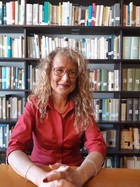
Funzione/Ruolo
Professoressa ordinaria di Storia moderna presso il Dipartimento di Ricerca e Innovazione Umanistica dell’Università degli Studi di Bari Aldo Moro.
Percorso professionale
Si è laureata presso l’Università degli Studi di Bari Aldo Moro, dove ha conseguito anche il Dottorato di ricerca in Storia. Si è abilitata all’insegnamento per la scuola secondaria di primo e di secondo grado. Nel 2001 è stata assunta dall’Università di Bari come ricercatrice di Storia moderna e nel 2013 ha preso servizio come professoressa associata. Nel 2022 è diventata professoressa ordinaria di Storia moderna presso lo stesso Ateneo. È compente di Giunta del Dipartimento di Ricerca e Innovazione Umanistica e coordinatrice dei corsi di laurea in Storia e Patrimonio Digitale presso lo stesso Dipartimento, dove insegna Storia moderna e Storia di Genere per i corsi triennali e magistrali.
Risultati scientifici
Negli ultimi anni la sua attività di ricerca si è concentrata sulla politica urbana e la produzione di memorie nel Mezzogiorno di età moderna; sui profili mercantili e i flussi commerciali nel Mediterraneo borbonico; sulle forme della famiglia-impresa ottocentesca, con particolare riferimento alla dimensione delle emozioni e passioni individuali, e dei profili femminili; sulle narrazioni del fenomeno del grande brigantaggio con particolare attenzione al ruolo delle brigantesse; su tematiche legate alla storia di genere. Si è interessata anche di didattica della storia.
Attività editoriali e pubblicazioni
Fra le sue pubblicazioni più recenti:
[2020] L’affaire des bleds. La carestia napoletana nel lago borbonico, in La carestia napoletana del 1763-64: sguardi incrociati, num. monogr. di «Società e storia» a cura di Ead., 166: 233-256
[2020] Les Rocca de Marseille. Passions et intérêts d’une famille-entreprise, Paris, Garnier
[2020] con Lucia Boschetti, Briganti a scuola, in Briganti: narrazioni e saperi, n. mon. di «Meridiana», a cura di Ead. e Gian Luca Fruci, 99: 53-79
[2019] Il feudatario nelle “quasi-città” della Puglia di età moderna, in «Società e storia», 165: 503-522
[2018] Passioni e interessi di una famiglia-impresa. I Rocca nel Mediterraneo dell’Ottocento, Roma, Viella
[2018] Ai “margini” del Mediterraneo. Mercanti liguri nella tarda età moderna, Bari, Edipuglia
[2017] Nella città aristocratizzata, in Riti, pratiche e immagini della morte in Puglia. La chiesa e la confraternita di S. Maria del Suffragio a Monopoli dall’età barocca a oggi, a cura di Ead. e M. Fagiolo, Quaderni dell’Atlante del Barocco in Italia, Roma, De Luca Editori: 27-40
[2017] Francisco Hombrados. Un console napoletano nel Mediterraneo borbonico, in De l’utilité commerciale des consuls. L’institution consulaire et les marchands dans le monde méditerranéen (XVIIe-XXe siècle), a cura di A. Bartolomei, G. Calafat, M. Grenet, J. Ulbert, Roma-Madrid, Editions de l’Ecole Française de Rome-Casa de Velázquez: 375-387
[2017] Etre étrangers à Marseille. Les Sollicofre de St-Gall, in « Revue Suisse d’Histoire », (2): 139-162
[2017] Quasi sint civitates Società, poteri e rappresentazioni nella Puglia di età moderna, Collana Soggetti e Oggetti, Roma, Aracne
[2016] Comment être « malhonnête » sans briser le lien social. Acteurs, institutions et pratiques de l’échange dans l’espace tyrrhénien du XVIIIe siècle, in Les expressions de la a manipulation du Moyen Age à nos jours, a cura di L. Faggion, C. Regina, Paris, Classiques Garnier, Collection Polen: 467-489
[2013] Text typologies and urban phenomena: Puglia in the early modern period, in «Plurimondi»: 22-38.
Riconoscimenti e premi
È componente della SIS (Società Italiana delle Storiche), del CISCUG (Centro Interdipartimentale di Studi sulle Culture di Genere – Uniba), del CEDITH (Centro Interdipartimentale di ricerca in Digital Heritage – Uniba) e del direttivo del CRIAT (Centro di Studi Interuniversitario di Analisi Territoriale).
È componente del comitato di direzione della rivista «Società e Storia», del comitato scientifico della collana «Mediterranea» della casa editrice Edipuglia (Bari) e della collana «Plus Ultra. Studi di storia» della casa editrice Sette città (Viterbo).
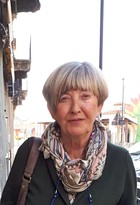
Funzione/Ruolo
Già Professoressa ordinaria di Filosofia Politica all'Università di Verona, è Professoressa onoraria presso il Dipartimento di Scienza Umane all'Università di Verona.
Percorso professionale
Dopo la laurea in Filosofia all’Università di Padova, Adriana Cavarero intraprende la carriera accademica fino ruolo di Professoressa ordinaria di Filosofia Politica all’Università di Verona. In questi anni è anche Visiting professor presso gli atenei di Warwick e Berkeley, e presso la New York University e Harvard.
Risultati scientifici
Gli interessi di Adriana Cavarero spaziano dal pensiero antico a quello moderno e contemporaneo. Distintasi come studiosa del pensiero di Hannah Arendt, è riconosciuta per gli studi in materia di femminismo, filosofia politica, arte e letteratura. Tra le ricerche più innovative quelle che la conducono ad analizzare il ruolo del luogo della nascita nella nostra cultura, la narrazione e la voce. Si occupata anche di violenza contemporanea, di etica e politica, così come di argomenti legati all'incarnazione e alla differenza sessuale.
Attività editoriali e pubblicazioni
È autrice di diversi volumi nazionali ed internazionali che sono stati tradotti in inglese e altre lingue straniere.
(1990) Cavarero, A., Nonostante Platone. Editori Riuniti;
(1995) Cavarero, A., In Spite of Plato: A Feminist Rewriting of Ancient Philosophy. Polity.
(1997) Cavarero, A., Tu che mi guardi, tu che mi racconti. Filosofia della narrazione. Feltrinelli.
(2000) Cavarero, A., Corpo in figure. Feltrinelli.
(2000) Cavarero, A., Relating Narratives: Storytelling And Selfhood. Routledge.
(2002) Cavarero, A., Stately Bodies: Literature, Philosophy And The Question of Gender. Michigan U.P..
(2003) Cavarero, A., A più voci. Filosofia dell’espressione vocale. Feltrinelli;
(2005) Cavarero, A., For More Than One Voice: Toward a Philosophy Of Vocal Expression. Stanford U.P.
(2007) Cavarero, A., Orrorismo. Ovvero della violenza sull’inerme. Feltrinelli.
(2009) Cavarero, A., Horrorism: Naming Contemporary Violence. Columbia U.P.
(2013) Cavarero, A., Inclinazioni. Critica della rettitudine. Raffaello Cortina;
(2016) Cavarero, A., Inclinations: A Critique of Rectitude. Stanford U.P.
(2018) Cavarero, A., Platone. Raffaello Cortina.
(2019) Cavarero, A., Democrazia sorgiva. Note sul pensiero politico di Hannah Arendt. Raffaello Cortina.
(2021) Cavarero, A., Surging Democracy. Notes on Hannah Arendt’s Political Thought. Stanford U.P.

Funzione/Ruolo
Professoressa di Teoria Politica all'Université de Genève, Svizzera.
Percorso professionale
Emanuela Ceva si laurea in Filosofia presso l’Università di Pavia per poi proseguire gli studi in Gran Bretagna, dove consegue il dottorato di ricerca in Teoria politica presso la University of Manchester. Dal 2005 ricopre incarichi di didattica e di ricerca presso numerose università in Europa (Oxford, St Andrews, Leuven, Hamburg, Bristol, Kent, Trento), America del Nord (Harvard, Montréal, Princeton), Asia (Tokyo), Russia (Ekaterinburg) e Medio Oriente (Amman). Dopo 14 anni di insegnamento (come ricercatrice e, poi, come professoressa associata) presso l’Università di Pavia, dal 2019 ricopre la cattedra di Teoria Politica presso la Université de Genève.
Risultati scientifici
La ricerca di Emanuela Ceva si svolge nell’ambito della teoria politica e dell’etica pubblica, con particolare riferimento a temi di (1) giustizia e conflitti di valori, (2) rispetto e tolleranza per le minoranze, (3) democrazia e corruzione politica. La prima linea di ricerca ha condotto alla pubblicazione del libro Interactive Justice (Routledge 2016) che sviluppa una nuova teoria dei processi di gestione dei conflitti di valori in politica. La seconda linea di ricerca si è sviluppata nel corso di tre progetti di ricerca collaborativa, finanziati dalla Commissione Europea e dal MIUR. La ricerca ha permesso uno studio delle basi di giustificazione delle politiche pubbliche mirate all’integrazione delle minoranze tramite il miglioramento della loro condizioni di partecipazione alla vita politica della comunità di residenza. Infine, la terza linea di ricerca ha condotto a uno studio della corruzione politica come patologia delle forme di interazione che prevedono l’uso di potere pubblico all’interno delle istituzioni. I risultati principali di questa ricerca sono stati presentati nel libro Political Corruption: The Internal Enemy of Public Institutions (Oxford University Press, 2021).
Attività editoriali e pubblicazioni
[2021] Ceva E, Ferretti MP, Political Corruption. The internal enemy of public institutions. Oxford University Press.
[2020] Ceva E, Mokrosinska D, Failing Institutions, Whistle-Blowing, and the Role of the News Media. Journal of Applied Philosophy, online first 2020, DOI: 10.1111/japp.12476
[2019] Ceva E, Bocchiola M, Personal Trust, Public Accountability, and the Justification of Whistleblowing. Journal of Political Philosophy, 27(2):187-206.
[2019] Ceva E, Political Corruption as a Relational Injustice. Social Philosophy & Policy, 35(2): 118-37.
[2018] Ceva, E, Radoilska, L, Responsibility for Reason-Giving: The Case of Individual Tainted Reasoning in Systemic Corruption. Ethical Theory and Moral Practice, 21(4): 789-809.
[2018] Ceva E, Bocchiola M, Is Whistleblowing a Duty? Polity
[2018] Ceva, E, Ferretti MP, Political Corruption, Individual Behaviour, and the Quality of Institutions. Politics, Philosophy & Economics, 17(2): 216–31
[2016] Ceva E, Interactive Justice. Routledge.
[2015] Ceva E, Political Justification through Democratic Participation: The Case for Conscientious Objection. Social Theory and Practice, 41(1): 26-50.
[2015] Ceva E, Why Toleration is not the Appropriate Response to Dissenting Minorities’ Claims. European Journal of Philosophy, 23(3): 633-51.
[2013] Ceva E, Zuolo, F, A Matter of Respect. On majority-minority relations in a liberal democracy. Journal of Applied Philosophy, 30(3): 239-53.
Riconoscimenti e premi
2012 Jemolo Fellowship, Nuffield College, Oxford
2015 Bourse de séjour pour chercheur invité, CRÉ, Université de Montréal
Visiting Fellowship, CEPPA, University of St Andrews
2016 “Meet Italian Scientists”, Italian Embassy in London – vincitrice all’unanimità per le Scienze Umane e Sociali
2018 Fulbright Research Scholarship in Filosofia
2019 Senior Visiting Fellowship, RIPPLE—Research in Political Philosophy, KU Leuven

Funzione/Ruolo
Professoressa ordinaria di Filosofia al Politecnico di Milano, svolge la sua attività didattica nei corsi “Filosofia della conoscenza”, “Fondamenti di estetica” ed “Estetica dell’architettura” e nei corsi dottorali “Epistemology of scientific and technological research”, “European culture” ed “Empowering imagination”.
Percorso professionale
Nel corso del Dottorato di Ricerca in Filosofia all’Università degli Studi di Milano, che consegue nel 2006, Simona Chiodo svolge soggiorni di ricerca all’Università di Harvard. Visiting Scholar all’Università di Pittsburgh (2014) e Visiting Professor all’Università di Edimburgo (2016) e all’Università di Cambridge (2019), dal 2008 è Professoressa ordinaria di Filosofia al Politecnico di Milano, dove è anche membro del Comitato Etico della Ricerca.
Risultati scientifici
Simona Chiodo comincia la sua ricerca filosofica dallo studio della filosofia angloamericana moderna e contemporanea, con un focus sulla filosofia analitica. Le sue aree di specializzazione sono l’estetica (con un’attenzione particolare alla rappresentazione, alla bellezza e all’estetica dell’architettura) e l’epistemologia (con un’attenzione particolare alla relazione tra aisthesis ed episteme, al dualismo epistemologico, alla relazione tra realtà e idealità e al significato della tecnologia).
Attività editoriali e pubblicazioni
È autrice di numerosi volumi e articoli nazionali e internazionali.
Monografie:
[2020] Chiodo S., Technology and anarchy. A reading of our era, Lexington Books-The Rowman & Littlefield Publishing Group, Lanham-Boulder-New York-London, pp. 166.
[2018] Chiodo S., Come pensa un europeo. Epistemologia di un agire comune, Carocci, Roma, pp. 120.
[2016] Chiodo S., Che cos’è un ideale. Da Platone alla filosofia contemporanea, Carocci, Roma, pp. 176.
[2015] Chiodo S., La bellezza. Un’introduzione al suo passato e una proposta per il suo futuro, Bruno Mondadori, Milano-Torino, pp. 192.
[2013, ristampa 2014] Chiodo S., Apologia del dualismo. Un’indagine sul pensiero occidentale, Carocci, Roma, pp. 176.
[2011] Chiodo S., Io non cerco, trovo. Un empirismo contemporaneo, Bollati Boringhieri, Torino, pp. 254.
[2011] Chiodo S., Estetica dell’architettura, Carocci, Roma, pp. 168.
[2008] Chiodo S., La rappresentazione. Una risposta filosofica sulla verità dell’esperienza sensibile, Bruno Mondadori, Milano, pp. 240.
[2006] Chiodo S., Visione o costruzione. Nelson Goodman e la filosofia analitica contemporanea, Led, Milano, pp. 215.
Articoli su riviste:
[2021] Chiodo S., Human autonomy, technological automation (and reverse). AI & society. Journal of knowledge, culture and communication, in corso di pubblicazione.
[2020] Chiodo S., The greatest epistemological externalisation. Reflecting on the puzzling direction we are heading to through algorithmic automatisation. AI & society. Journal of knowledge, culture and communication, 35(2): 431-440.
Curatele:
[2020] Chiodo S., Schiaffonati V., a cura di, Italian philosophy of technology. Socio-cultural, legal, scientific and aesthetic perspectives on technology, Springer, Cham, pp. 261.
Riconoscimenti e premi
Nel 2012 ottiene il Premio Filosofico Castiglioncello, sezione “A. Musu”, con la monografia Estetica dell'architettura (Carocci, Roma 2011).
Dal 2020 è supervisore del progetto di ricerca Marie Skłodowska-Curie “SCRAPS (Writing the sleep crisis: 24/7 capitalism and neoliberal subjectivity)”, PI Diletta De Cristofaro, finanziato dalla Commissione Europea (Horizon 2020).
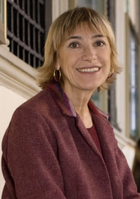
Funzione/Ruolo
Professoressa emerita di Storia contemporanea all’Università “La Sapienza” di Roma. È stata preside di Facoltà, direttrice di Dipartimento.
Percorso professionale
Nata a Modena il 25 dicembre 1944, Simona Colarizi nel 1967 si laurea in Storia Moderna, con 110/110 e lode, discutendo una tesi su "Le origini del fascismo in Puglia”. Nei due anni successivi con una borsa di studio del CNR, partecipa alla ricerca, diretta dal prof. Renzo De Felice, su "Partito, Stato e Società civile nell'Italia Fascista". Nel 1970, è nominata professoressa incaricata di Storia del sindacalismo e del movimento operaio presso la Facoltà di Giurisprudenza - Corso di Laurea in Scienze Politiche - dell'Università degli Studi di Camerino ed inizia la sua lunga carriera accademica. Nella medesima facoltà, nel 1973 le viene conferito un secondo insegnamento di Storia dei partiti e dei movimenti politici. Sempre a Camerino, nel 1976 vince il concorso a cattedra di Storia dei partiti e dei movimenti politici e assume il ruolo di docente straordinaria presso la Facoltà di Giurisprudenza - Corso di Laurea in Scienze Politiche. Due anni dopo è nominata preside della Facoltà di Giurisprudenza, e nel 1979 diventa professoressa ordinaria.
Nel 1983 si trasferisce a Napoli, dove insegna prima Storia dei partiti e dei movimenti politici e dal 1987 Storia Contemporanea presso la Facoltà di Scienze Politiche dell’Università degli Studi di Napoli, "Federico II”, dove svolge anche la supplenza di insegnamento di Storia dei partiti e dei movimenti politici.
Nel 1992 approda alla sua ultima destinazione, Roma. Alla Facoltà di Sociologia dell'Università "La Sapienza”, ottiene la cattedra di Storia contemporanea. Nel 2000 ha la sua seconda nomina importante: diventa direttrice del Dipartimento Innovazione e Società (DIeS). Un anno dopo passa alla Facoltà di Scienze della Comunicazione. Terzo incarico prestigioso: nel 2005 è eletta Presidente del Corso di Laurea Interfalcoltà in Scienze Sociali della Cooperazione, dello Sviluppo e delle relazioni tra i popoli. E’ stata in seguito vice presidente della Società per gli Studi della Storia Contemporanea (SISSCO), e dal 2010 al 2015 ha diretto il dottorato in “Linguaggi politici” . Dal 2016 è professoressa emerita.
La sua attività extra universitaria la vede oggi Direttrice scientifica dell’Archivio della Fondazione Giacomo Mancini, membro della Fondazione Filippo Turati, della Fondazione Francesco Saverio Nitti, della Fondazione Renzo De Felice – Istituto Ugo Spirito. E’ condirettrice della rivista “Nova Storica”, e fa parte dei comitati scientifici delle riviste (A) “Mondo contemporaneo” e “XXI Secolo”. Dal 2012 è nel Board della School of Government della LUISS e dal 2018 nel Consiglio dei Garanti della Fondazione Antonio Gramsci. Dal 2019 è nel Comitato Scientifico del Museo M9 per la storia d’Italia.
Risultati scientifici
Le ricerche storiche alle quali si è dedicata sono state incentrate sul tema delle origini del fascismo in particolare nell'ambito regionale - alla fine dei Sessanta poco indagato - attraverso gli archivi locali e quelli nazionali del Ministero dell'Interno. Lo stesso metodo storico di analisi delle fonti archivistiche, a stampa, bibliografiche è stato applicato alle altre ricerche. Sempre sul fascismo ha studiato l'opposizione dei liberal democratici meridionali - Giorgio Amendola - e poi in generale la storia dei fuoriusciti antifascisti in esilio. Infine, le fonti archivistiche sono state preziose per la ricerca sull'opinione degli italiani durante il fascismo. Fonti archivistiche, bibliografiche e a stampa sono state indispensabili anche per ricostruire la storia dei partiti politici nel secondo dopoguerra e una fonte indispensabile - l'Archivio storico del "Corriere della sera" - per la storia del Corriere in età liberale. Prevalentemente bibliografica la storia del Novecento europeo, dove è stata soprattutto la letteratura inglese e francese il punto di riferimento per questa sintesi. L'originalità dei risultati raggiunti in tutti i campi di ricerca percorsi da Simona Colarizi sono stati riconosciuti dalla comunità scientifica e dall'Università che le ha conferito l’emeritato.
Attività editoriali e pubblicazioni
Tra le sue ultime pubblicazioni: ”Storia del Novecento italiano” Rizzoli, Milano 2000; "Storia politica della Repubblica 1943-2006, Laterza, Bari-Roma 2007; "Novecento d'Europa", Laterza, Bari Roma 2015, "Luigi Barzini. Una storia italiana", Marsilio, Venezia 2017; "Un paese in movimento. L'Italia negli anni Sessanta e Settanta", Laterza, 2019.
[2019] Un paese in movimento. L’Italia negli anni Sessanta e Settanta, Laterza, Bari Roma, pp. 162 ISBN 978-88-581-3867-0
[2017] Luigi Barzini. Una storia italiana, Marsilio, Venezia, pp. 220, ISBN 978-88-317-2663-4
[2015] Novecento d’Europa. L’illusione, l’odio, la speranza, l’incertezza, Laterza, Roma-Bari, pp.482, ISBN 978-88-581-1895-5
[2012] (con Marco Gervasoni), La tela di Penelope. Storia della seconda Repubblica, Laterza, Bari-Roma (ISBN 978-88-420-5432-0), p.276.
[2011] Il “Corriere” nell’età liberale, Rizzoli, Fondazione Corriere della sera, Milano (ISBN 978-88-96820-24-7), pp. 590.
[2007] Storia politica della Repubblica 1943-2006, Laterza, Roma-Bari
[2005] (con Marco Gervasoni), La cruna dell’ago. Craxi, il partito socialista e la crisi della Repubblica, Laterza, Bari-Roma
[2000] Storia del Novecento italiano, Rizzoli, Milano .
[1996] Biografia della Prima Repubblica, Laterza, Bari-Roma
[1994] Storia dei partiti nell'Italia repubblicana, Laterza, Bari-Roma
[1991] L'opinione degli italiani sotto il regime (1929-1943), Laterza, Bari-Roma
Riconoscimenti e premi
Numerosi i premi e i riconoscimenti attribuiti a Simona Colarizi. Sono , in ordine di tempo:
Premio Walter Tobagi per la saggistica 1991 (il libro premiato è "L'opinione degli italiani sotto il regime")
Premio Letterario Basilicata per la saggistica storica 1996
Premio di cultura Città di Civitavecchia 2013
Premio Acqui alla carriera 2016
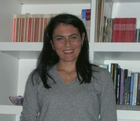
Funzione/Ruolo
Ricercatrice di Storia Contemporanea presso l’Università del Salento.
Percorso professionale
Dopo la laurea in Beni Culturali, Daria De Donno consegue il dottorato di ricerca in Il Mezzogiorno tra Europa e Mediterraneo: territorio, istituzioni e civiltà dal Medioevo all’età contemporanea presso l’Università del Salento. Nel 2004 svolge un periodo di ricerca presso l’Università di Coimbra (Departamento de História moderna e de História das Ideiais); tra il 2004 e il 2007 è assegnista di ricerca presso l’Università del Salento; dall’ottobre 2007 è ricercatrice di Storia contemporanea. Daria De Donno è membro del Collegio dei Docenti del dottorato in Human and Social Sciences, in ricordo di Giulio Regeni (Università del Salento). Dal 2017 è responsabile scientifica del Centro di ricerca «Archivio della scrittura femminile salentina» (attivo presso il Dipartimento di Storia, Società e Studi sull’Uomo dell'Università del Salento) e dal 2020 referente scientifica del «Gruppo di studio degli scritti di Don Tonino Bello». È inoltre membro del Comitato scientifico dell’Istituto per la Storia del Risorgimento Italiano (Comitato provinciale di Cosenza). Da alcuni anni è membro della Società Italiana di Storia Contemporanea (Sissco) e dell’Associazione Italiana di Public History (AIPH).
Risultati scientifici
Gli interessi di ricerca di Daria De Donno riguardano principalmente la storia sociale e politica dal XIX al XX secolo. Alla luce del rinnovato interesse nel dibattito storiografico internazionale, si è confrontata con le categorie di élite, borghesia, notabilati (al maschile e al femminile), con particolare attenzione alle carriere, alle esperienze e ai ruoli ricoperti da alcuni protagonisti (più o meno noti), che ha studiato privilegiando l’osservatorio delle testimonianze private. Allo stesso tempo, i suoi interessi scientifici si sono indirizzati alla storia delle donne e in particolare allo studio delle scritture femminili e all’uso della letteratura femminile come fonte per la ricerca storica. Da alcuni anni si occupa di didattica della storia di genere e collabora con alcuni istituti di istruzione superiore con il progetto Tracce femminili negli archivi scolastici. Più recentemente, ha approfondito il tema del dissenso politico e in particolare il ruolo del movimento giovanile socialista italiano tra la prima guerra mondiale e il dopoguerra. Attualmente, ha in corso una indagine sul rapporto tra la Coldiretti e la Democrazia cristiana negli anni Ottanta.
Attività editoriali e pubblicazioni
[2021] De Donno D., Un partito senza leader. La difficile rappresentanza del Ppi in Puglia. Alla scuola di Don Sturzo. Il popolarismo nel Mezzogiorno a cento anni dall’Appello ai liberi e forti, a cura di L. Coscarella, P. Palma, Luigi Pellegrini editore: 123-138.
[2021] De Donno D., Maddalena Santoro tra posizioni emancipazionistiche e adesione al “modello muliebre” del regime. L’officina del sentimento. Gesti voci segni di donne in Terra d’Otranto tra Grande Guerra e fascismo, a cura di G. Caramuscio, Giorgiani: 215-235.
[2020] De Donno D., Les jeunes socialistes italiens, le premier conflit mondial, la révolution. 1917/2017. Qu’est-ce que réussir une révolution?, Marie Cuillerai, Fabrice Flipo (dir.), Presses des Mines: 89-100
[2020] De Donno D., Storia di un’impresa familiare. Le «Officine meccaniche Massari» tra Salento, Nord-Africa ed Europa mediterranea (1943-1988). «Giornale di Storia Contemporanea», XXVI (2): pp. 59-72.
[2019] De Donno D., Tracce femminili negli archivi scolastici (con M. Calogiuri). «Ricerche Storiche», XLIX (2): 67-76.
[2019] De Donno D., Tabacchine, condizioni di lavoro e disoccupazione nel Salento negli anni Trenta del Novecento. “Non solo pane ma diritti”. Il contrastato movimento delle tabacchine salentine nel Novecento, a cura di M. Spedicato, Giorgiani: 173-198.
[2018] De Donno D., Una «union sacrée» per la pace e per la rivoluzione. Il movimento dei giovani sovversivi meridionali contro la guerra, Le Monnier.
[2018] De Donno D., «La Santa Russia». La guerre, les révolutions de 1917 et le mouvement des jeunes socialistes italiens. «Ricerche Storiche» XLVIII (2): 65-75.
[2018] De Donno D., 1916. I giovani socialisti rivoluzionari per «l’unione dei reietti e dei bastardi» contro la guerra. «Itinerari di ricerca storica», XXXII (2): 109-128.
[2015] De Donno D., Una “triste e solenne” terra di galantuomini. Per un profilo del notabilato in Basilicata in età liberale. «Itinerari di ricerca storica», XXIX (2): 11-40.
[2013] De Donno D., Con l’Italia nel cuore. L’esperienza di un patriota mazziniano (Nicola Valletta, 1829-1915). “L'Italia è”. Mezzogiorno, Risorgimento e post-Risorgimento, a cura di M.M. Rizzo, Viella: 101-115.
[2010] De Donno D., Notabilato e carriere politiche tra Otto e Novecento. Un esempio di ascesa (Giuseppe Pellegrino, 1856-1931), Pubblicazione del Dipartimento di Studi Storici dal Medioevo all’Età contemporanea (Congedo).
Riconoscimenti e premi
Vincitrice del concorso CNR “Promozione ricerca 2005. L’identità come fattore di integrazione” con la monografia Memorie familiari e storie di comunità. Il «Libro di casa» dei Pellegrino di Melpignano (secc. XVIII-XIX), 2006.
Ha ricevuto il Premio di studio “Maria Marangelli” (XXII edizione, 2009-2010) con il libro Notabilato e carriere politiche tra Otto e Novecento. Un esempio di ascesa (Giuseppe Pellegrino, 1856-1931), 2010. Lo stesso volume è stato selezionato tra le prime cinque opere edite ritenute “più significative” nell'ambito del “Premio Ettore Gallo” VII edizione.
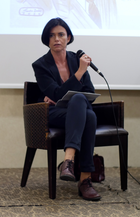
Funzione/Ruolo
Ricercatrice di Storia contemporanea all’Università di Cagliari.
Percorso professionale
Dopo la laurea in Lettere moderne nel 2005 Valeria Deplano consegue il Dottorato di ricerca in Storia contemporanea all’Università di Cagliari. Nello stesso periodo, e fino al 2010 lavora come archivista e ricercatrice al Libyan Studies Center di Tripoli, Libia, dove prende parte al progetto di costituzione dell’Archivio nazionale. Tra il 2012 e il 2018 è assegnista di ricerca a Cagliari e poi all’università di Bologna; nel frattempo insegna Storia dei Paesi mediterranei all’Università di Macerata. Dal 2018 è ricercatrice di Storia contemporanea a Cagliari.
Risultati scientifici
Durante il dottorato e il primo periodo post-dottorale ha studiato come il colonialismo, tradizionalmente interpretato come un capitolo a sé stante della storia italiana, abbia invece contribuito al processo di formazione dell’identità nazionale, particolarmente durante il periodo fascista. L'importanza dell’aspetto culturale del progetto espansionista italiano evidenziato in questa prima fase della ricerca, ha indotto Deplano ad approfondire i lasciti di questa forma mentis nel periodo repubblicano: le successive ricerche, sviluppata anche all’interno di gruppi quale Intergrace, hanno quindi indagato e messo in luce le dinamiche di continuità tra primo e secondo Novecento, soprattutto nella elaborazione dei concetti di identità e alterità. In questa stessa prospettiva ha studiato le origini storiche della società multiculturale in Italia, analizzando le migrazioni postcoloniali e le politiche di cittadinanza, anche in una chiave comparativa col contesto europeo.
Attività editoriali e pubblicazioni
È autrice di numerosi saggi e monografie tra cui:
[2015] Deplano V, L'Africa in casa. Propaganda e cultura coloniale nell'Italia fascista, Le Monnier – Mondadori education.
[2017] Deplano V, La Madrepatria è una terra straniera. Libici, eritrei e somali nell'Italia del dopoguerra, Le Monnier- Mondadori education.
[2018] Deplano V, Per una nazione coloniale. Il progetto imperiale fascista nei periodici coloniali, Morlacchi.
[2014] Deplano V, Pes A, Quel che resta dell'impero. La cultura coloniale degli italiani, Mimesis.
[2020] Laschi G, Deplano V, Pes A, Europe between Migrations, Decolonization and Integration, Routledge.
[2018] Deplano V, Within and outside the nation: former colonial subjects in post-war Italy, Modern Italy, 23 (4): 395-410.
[2017] Deplano V, Il mondo che cambia. Decolonizzazione e nuova idea d’Europa nella narrazione dei media italiani (1950-1962), L’Unione Europea e il Mediterraneo Interdipendenza politica e rappresentazioni mediatiche (1947-2017), edited by Cruciani S, Ridolfi M, Franco Angeli, 51- 68.
[2016] Deplano V, Senza distinzione di razza. Razzismo in controluce nel discorso pubblico italiano tra gli anni Cinquanta e Settanta, From the European South. A transdisciplinary journal of postcolonial humanities” 1 (1): 95-102.
[2015] Deplano V, Come il colonialismo ha fatto gli italiani. Il caso di “Timira” tra storia e letteratura. Memoria storica e postcolonialismo. Il caso italiano” edited by Bovo Romoeuf M, Manai F, Peter Lang.
[2013] Aru S, Deplano V, Costruire una nazione. Politiche, rappresentazioni e discorsi che hanno fatto l'Italia, Ombre Corte.
[2013] Deplano V, Making Italians: Colonial History and the Graduate Education System from the liberal age to Fascism, Journal of Modern Italian Studies” 18: 580-598.
[2013] Deplano V, Madre Italia, Africa concubina. La femminilizzazione del territorio nel discorso coloniale fascista, Genesis”, XII(2): 55-73.
Riconoscimenti e premi
Ha vinto il Christopher Seton-Watson Memorial Prize 2018, istituito in ricordo del fondatore dell’Associazione per lo Studio dell’Italia Moderna ( ASMI) a Cambridge.

Area Storia e Filosofia
Competenze: didattica della storia di genere, public history e genere, storia del diritto e della condizione giuridica delle donne, storia della famiglia, storia della violenza subita e agita dalle donne, storia delle donne e di genere
Parole chiave: Costituzione e donne, diritti umani, famiglia, genere, violenza sulle donne
Regione: Lazio
Funzione/Ruolo
Professoressa associata di Storia del diritto medievale e moderno all’Università di Palermo.
Percorso professionale
Dopo la laurea in Lettere e il PhD in “Storia moderna e contemporanea - Storia della famiglia e dell'identità di genere fra XVIII e XX secolo nella società europea”, diventa ricercatrice ed attualmente ricopre il ruolo di professoressa associata di “Storia del diritto medievale e moderno” presso il Dipartimento di Giurisprudenza dell’Università di Palermo. Nella stessa Università detiene anche l’insegnamento di “European Women’s Legal History”. Simona Feci fa parte del Collegio dei docenti del dottorato internazionale in “Diritti umani. Evoluzione, tutela e limiti”, attivo presso l’Università di Palermo. Fa anche parte della Società italiana delle Storiche fin dal 1993. Nel corso degli anni è stata membro del comitato direttivo nazionale (2014-2016) ed ha presieduto la Società dal 2016 al 2020.
Risultati scientifici
Studiosa della condizione giuridica delle donne e della storia della famiglia, Simona Feci è stata coordinatrice italiana della Conferenza di ricerca trilaterale italo-franco-tedesca “Costruire un Archivio della storia delle donne e di genere in Europa. Diritti, lavoro e corpi dal medioevo all’età contemporanea»”.
Sostenuta dalla Deutsche Forschungsgemeinschaft (DFG), dalla Fondation Maison des Sciences de l’Homme (FMSH) e da Villa Vigoni – Centro italo-tedesco per l’eccellenza europea, la ricerca si è sviluppata nel triennio 2017-2019.
Negli ultimi cinque anni Feci ha approfondito soprattutto la storia della violenza maschile contro le donne, promuovendo incontri scientifici e di formazione attorno a questo tema e curando una raccolta di studi i cui risultati sono stati pubblicati. Attualmente la sua indagine sviluppa il rapporto tra violenza subita e violenza agita dalle donne nel corso dell’età moderna. Allo stesso tempo, sta curando una raccolta di studi che propone una lettura interdisciplinare di genere della Costituzione italiana.
Attività editoriali e pubblicazioni
[2020] Feci S, The Reception of Women’s and Gender History: A Perspective from the Italian Association of Women Historians, in Women’s History at the Cutting Edge. An Italian Perspective, edited by Teresa Bertolotti, Roma, Viella, pp. 45-53.
[2019] Feci S, Tendenze e indirizzi della storia di genere sull’età moderna in Italia. Un itinerario attorno alla Società Italiana delle Storiche, in Germania e Italia. Sguardi incrociati sulla storiografia, a cura di C. Cornelissen e G. D’ Ottavio, Bologna, Il Mulino, pp. 283-305 (Annali dell’Istituto Storico Italo-Germanico in Trento. Quaderni, 105).
[2019] Feci S, Se il diritto costruisce la storia delle donne. Una relazione nel campo della modernistica italiana, in Vingt-cinq ans après. Les femmes au rendez-vous de l’histoire, a cura di Enrica Asquer, Anna Bellavitis, Giulia Calvi, Isabelle Chabot, Maria Cristina La Rocca, Manuela Martini, Rome, Ecole française de Rome, pp. 247-264.
[2018] Feci S, Exceptional women. Female merchants and working women in Italy in the early modern period, in Gender, Law and Economic Well-Being in Europe from the Fifteenth to the Nineteenth Century: North versus South?, edited by Anna Bellavitis - Beatrice Zucca Micheletto, Routledge, pp. 62-76.
[2018] L’esclusione delle donne dalla successione ereditaria in Italia tra medioevo ed età moderna: una questione aperta. Rivista di Storia del diritto italiano, XCI (1): 149-181.
[2017] Feci S, Schettini L, a cura di, La violenza contro le donne nella storia. Contesti, linguaggi, politiche del diritto (sec. XV-XXI), Roma, Viella, pp. 288.
[2016] Feci S, Mobilité, droits et citoyenneté des femmes dans l’Italie médiévale et moderne. Clio. Femmes, Genre, Histoire, n. 43 Genre et citoyenneté: 47-72 (on line: https://clio.revues.org/13153).
[2004] Feci S, Pesci fuor d’acqua. Donne a Roma in età moderna: diritti e patrimoni, Roma, Viella, pp. 288.
Riconoscimenti e premi
Durante il mandato di presidenza della Società italiana delle storiche, alcune attività dell’associazione hanno ricevuto la medaglia premio di rappresentanza del Presidente della Repubblica Italiana, e in particolare il VII Congresso della Società Italiana delle Storiche “Genere e storia: nuove prospettive di ricerca “(Pisa, 2-4 febbraio 2017) e il convegno, che Feci ha ideato e concorso a organizzare, “Intorno al 1948. Otto articoli della Costituzione nella storia delle donne “(Roma, 8-9 novembre 2018).

Area Storia e Filosofia
Competenze: archeologia, geografia antica, miti e religione greca, patrimonio culturale, storia, storia antica, storia greca, storia sociale
Parole chiave: colonialismo, contatto culturale, democrazie, globalizzazione, Mediterraneo, migrazioni, pensiero politico greco, polis, rituali (funerari), storia delle donne
Regione: Puglia
Funzione/Ruolo
Professoressa di Storia greca e Presidente del Corso di Laurea in Beni Culturali presso l'Università del Salento (Lecce).
Percorso professionale
Flavia Frisone si laurea in Lettere Classiche all’Università di Messina (1988) con una tesi in Filologia Classica e perfeziona gli studi alla Scuola Normale Superiore di Pisa come borsista presso il Seminario di Storia Greca. Si specializza in Archeologia (1993) dopo un biennio trascorso come borsista alla Scuola di Specializzazione in Archeologia classica dell’Università di Lecce. Dottorato di ricerca in Storia Antica (VIII ciclo, 1993-1996). Dopo un periodo da borsista post-dottorato al Dipartimento di Beni Culturali dell'Università di Lecce, dal 2000 è ricercatrice nel settore scientifico-disciplinare LANT02-Storia greca e dal 2010 è professoressa associata dell'Università del Salento, dove lavora presso il Dipartimento di Beni Culturali. Abilitata al ruolo di I fascia (2017). Già coordinatrice del Dottorato di Ricerca in Storia antica (2012-16), è dal 2017 Presidente del Corso di Laurea in Beni Culturali.
Collabora a diverso titolo con istituzioni come le Soprintendenze archeologiche e Musei, pubblici o privati, partecipando campagne di scavo in Italia meridionale e Sicilia e organizzando o collaborato all’organizzazione di mostre e convegni. Membro di comitati scientifici di riviste e collane editoriali, fa parte di società scientifiche e culturali e svolge un’intensa attività di disseminazione scientifica e di divulgazione culturale con seminari e conferenze presso Istituzioni, Scuole e Istituti di ricerca in Italia e all’estero.
Risultati scientifici
Le prime ricerche condotte da Flavia Frisone riguardano i rituali, in particolare i rituali funerari, nel mondo greco, con il loro complesso significato e le loro ricadute in campo sociale e politico. Su questo tema ha pubblicato numerosi articoli e studi specialistici, oltre a una monografia, dal titolo Leggi e regolamenti funerari nel mondo greco. Le fonti epigrafiche(2002).
Un successivo ambito di ricerche riguarda la colonizzazione greca e la mobilità nel Mediterraneo antico, temi sviluppati con il coordinamento di programmi universitari nazionali di ricerca scientifica (PRIN 2003-2005; 2006-2008) e progetti a finanziamento europeo (Interreg 2006 Italia-Grecia), e che comprendono anche i fenomeni di interazione culturale, con particolare attenzione alle relazioni fra comunità greche e non greche nella Magna Grecia, nella Sicilia e in tutto il Mediterraneo occidentale in età antica. In questo ambito pubblica, insieme con M. Lombardo, Colonie di colonie: le fondazioni sub-coloniali greche tra colonizzazione e colonialismo, Galatina 2009 oltre a molti articoli e contributi scientifici.
Un importante settore di studi di F. Frisone è quello della storia delle donne e delle problematiche di genere, sviluppate a partire da specifici problemi della storia greca. Questo indirizzo si svolge da ultimo anche in riferimento alle modalità di approfondimento e di comunicazione della public history e, in quest’ambito, Frisone è stata Chair del panel AIPH-12 “Archeostorie di tutti noi” alla 1a Conferenza Nazionale dell’Associazione Italiana di Public History, e fa parte del gruppo di lavoro Gender e Public History della stessa società.
Attività editoriali e pubblicazioni
[2002] Frisone F., Leggi e regolamenti funerari nel mondo greco. I. Le fonti epigrafiche, Congedo Editore.
[2003] Frisone F. Manuale di storia greca. 2.2. La documentazione, Monduzzi Editore.
[2009] Lombardo M., Frisone F. (eds.) Colonie i colonie: le fondazioni sub-coloniali greche tra colonizzazione e colonialismo, Congedo Editore.
[2011] Frisone F. Construction of consensus: Norms and Change in Greek Funerary Rituals, in Chaniotis A. (ed.) Ritual Dynamics in the Ancient Mediterranean: Agency, Emotion, Gender, Representation, Stuttgart: Steiner Verlag: 179-201.
[2011] Frisone F., La polis greca: gli anticorpi della comunità solidale fra pentitismo e delazione. Iuris Antiqui Historia, (III): 17-31
[2012] Frisone F. Rivers, land organization, and identity in Greek Western Apoikíai. Mediterranean Historical Review, 27(1): 87-115.
[2016] Frisone F. Experimenting Basileia: Princely Models and the Tyrants of Sicily. KTÈMA, 40: 175-87.
[2016] Frisone F. Sistemi coloniali e definizioni identitarie: le ‘colonie sorelle’ della Sicilia orientale e della Calabria meridionale, in Nizzo V., Donnelan L., Burgers G.J.(eds.) Conceptualising early Colonisation: 179-96.
[2017] Frisone, F. La mujer griega y la polis. Desperta Ferro. Arqueologìa & Historia, 11: 48-55.
[2017] Frisone, F. Archeostorie di tutti noi: per uno storytelling dei beni culturali. Introduzione al panel AIPH-12 Archeostorie di tutti noi - 1st Conference of the AIPH, http://www.archeostorie.it/archeostorie-tutti-noi-storytelling-dei-beni-culturali/
[2020] Frisone F., Lombardo M. Dire les villes des « Autres ». Les établissements des peuples non grecs de l’Occident dans l’historiographie grecque, d’Hécatée à Thucydide, in Lopez‐Rabatel L., Mathé V., Moretti J.-C. (eds.) Dire la ville en grec aux époques antique et byzantine, MOM Éditions: 57-74.
[2021] Frisone F., Les objets fous de Palerme e et d’autres histoires fantastiques d'épigraphie créative. Studi di Antichità 15: 109-22.

Funzione/Ruolo
Docente di Filosofia della Scienza presso La Sapienza Università di Roma
Percorso professionale
Elena Gagliasso si laurea nel 1971 e inizia la sua carriera nel 1976 all'Università La Sapienza di Roma, prima come ricercatrice e poi associata (abilitata full professor nel 2013). Dal 2019 è docente a contratto ‘per alta qualificazione’ in Filosofia della scienza.
Ha insegnato Filosofia e scienze del vivente a Roma e all’Università Orientale di Napoli e ha fatto parte fino al 2018 del Collegio di Dottorato in Filosofia della Sapienza. Attualmente ne è consulente esterna. Con filosofi e biologi ha fondato, e ha diretto per più mandati, il Centro interuniversitario di epistemologia e storia di ricerche sul vivente (ResVIVA) www.resviva.com; ha fatto parte del Comitato Scientifico del Center for Metodology of Science Research, Cerms; è stata presidente del Metaphor Club; oggi è nel Comitato Scientifico dell’AIEMS (Associazione di studi sulle teorie sistemiche) www.aiems.com, è stata tra le co-fondatrici dell’Associazione Donne&Scienza www.donnescienza.com e dell’Associazione Nuova Accademia www.nuovaccademia.com.
Ha partecipato a PRIN nazionali e a due progetti d’Ateneo, di cui uno come Chief Investigator, organizzato circa 30 Convegni nazionali e internazionali e Seminari Permanenti dottorali. Visiting professor all’Ecole des Hautes Etudes en Sciences Sociales di Parigi, alla Sissa di Trieste, alle Università di Pisa, Firenze, Cosenza, Venezia e Piemonte Orientale. Presente in missioni del Terzo Settore, da manifestazioni culturali a trasmissioni radiofoniche, a lezioni nelle scuole superiori.
Risultati scientifici
Elena Gagliasso è un’esperta internazionalmente nota in metodologia e storia della biologia moderna, ecoevoluzionismo e scienze e politiche dell’ambiente, relazioni scienza-società (dai temi della non-neutralità della scienza alla Citizen Science). Ha lavorato sul legame tra filosofia, storia e ideologie dei concetti scientifici, sul tema delle leggi, dei processi e della casualità contingente nelle teorie bioevolutive, sui rapporti tra riduzionismo, olismo e metodologie narrative nella scienza post-normale, considerando anche il tema del genere.
Attività editoriali e pubblicazioni
Elena Gagliasso è stata nel board della Rivista di Storia della Scienza, ha fondato ed è stata nel comitato scientifico di Sofia. Materiali di filosofia e cultura delle donne. È attualmente nel board scientifico di Scienza&Filosofia, di Testo e Senso, di HumanaMente, in quello di Riflessioni Sistemiche e nel Comitato Scientifico di Paradigmi. Rivista di Critica Filosofica.
Ha pubblicato circa 200 articoli specialistici e culturali, due volumi monografici, curatele di circa 25 volumi e di riviste del settore filosofico-scientifico. Di seguito, una selezione.
[2020] Gagliasso E. Stili di ricerca mutanti. Le donne lavorano l’evoluzionismo, in (a cura di) Gagliasso E., Severini E., Pollo S. Che genere di darwinismo? Scienza, evoluzionismo e questioni di genere, Notizie di Politeia, anno XXXVI, n.139: 28-34.
[2020] Gagliasso E. Agenda (e subenda) covidaria in quattro movimenti: tra epistemologia e coevoluzione, in (a cura di) Monti M., Redi C. A., La vita dopo (il)/ la Covid-19, Ibis: 153-164.
[2020] Gagliasso E. L’uso fecondo del limite. Epistemologia, ecologia, filosofia, in (a cura di) Bucci P., Galletti M. Il futuro della mente, Edizioni ETS: 295-308.
[2020] Gagliasso E. Il paradigma ecologico come stile di ragionamento e il negazionismo, in (a cura di) Mangia C., Rubbia G., Ravaioli M., Ambiente e clima. Il presente per il futuro, IRPP e-publishing: 26-33.
[2019] Gagliasso E. Il concetto di campo in biologia. Tra filosofie tacite e sperimentazioni, in (ed. by) Marina De Palo, Monografic number- Field theories. Psychology, linguistics, biology, Paradigmi, XXXVII, 2-: 275-291.
[2019] Gagliasso E. Condividui in evoluzione: quale filosofia? in (a cura di) Monti M., Redi C.A. CON-dividuo, Cellule e Genomi – XVII corso, Ibis: 81-96.
[2016] Gagliasso E. Morganti F. Passariello A. (a cura di), Percorsi Evolutivi. Lezioni di Filosofia della biologia, Franco Angeli: pp. 196.
[2015] Gagliasso E. Individuals as Ecosystems: An Essential Tension, (eds.) Gagliasso E., Sterpetti F., Natura e conoscenza. Paradigmi, n.2 anno XXXIII, maggio agosto: 87-104.
[2015] Gagliasso E. Per un’epistemologia critica ed autocritica, in (a cura di) Gagliasso E., Della Rocca M., Memoli R., Per una scienza critica, ETS: 111-129.
[2014] Gagliasso E. Contesti di vita: ragionare con Darwin ecologo, in (a cura di) Bucchi S., Gensini S., Darwiniana. Evoluzione e comunicazione, Edizioni ETS: 9-24.
[2013] Gagliasso E. Ambiente, in (a cura di) Michelini F., Davies J., Frontiere della biologia, Mimesis: 117-142.
[2008] Gagliasso E. Dividual Systems & Ultraneoteny, in (eds. by) Molfino F., Zucco F., Women in Biotechnology. Creating Interfaces, Springer: 143-160.
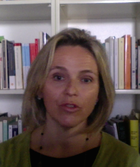
Funzione/Ruolo
Professoressa associata di Filosofia Politica e Direttrice del Centro Studi Politici Hannah Arendt presso l’Università di Verona; Delegata del Rettore al Public Engagement.
Percorso professionale
Olivia Guaraldo si laurea in filosofia all’Università di Bologna (1995) per poi proseguire gli studi in Finlandia, dove consegue il PhD in Political Science presso l’Università di Jyvaskyla (2001). Dal 2005 è ricercatrice in Filosofia Politica all’Università di Verona, dove, dal 2014 ricopre anche il ruolo di Professoressa associata.
Risultati scientifici
Si è principalmente occupata del pensiero politico di Hannah Arendt. Sulla figura di Arendt ha pubblicato due monografie (2003 e 2014) ed è intervenuta in qualità di esperta in diverse occasioni accademiche (convegni italiani ed internazionali) e in ambiti divulgativi (scuole, radio, social media). Dal 2016 dirige il centro Studi politici Hannah Arendt presso l’Università di Verona.
Altre tematiche di cui Olivia Guaraldo si è occupata sono la teoria politica femminista, la storia politica e sociale delle donne e il pensiero della differenza sessuale.
Attività editoriali e pubblicazioni
[2019] “Illusione e realtà nell'epoca della post-verità”, in Bistagnino, G. Fumagalli, C., Fake news, post-verità e politica(ebook), Fondazione Giangiacomo Feltrinelli, Milano, pp. 33-52.
[2018] “Postcritica: una genealogia”, Politica & Società, 7:2, pp. 163-190.
[2018] “Public happiness. Revisiting an Arendtian hypothesis”, Philosophy Today, 62:2, pp. 395-416.
[2018] ‘La libertà di essere liberi’: circolarità della politica e autonomia della rivoluzione in Hannah Arendt”, Filosofia politica, 35:2, pp. 285-302.
[2018] Introduzione, in A. Cavarero, Platone, Raffaello Cortina editore, Milano, pp. 9-17.
[2018], La vulnerabilità come paradigma fondativo, in O. Giolo, B. Pastore (a cura di), Vulnerabilità. Analisi multidisciplinare di un concetto, Carocci, Roma, pp. 57-71.
[2018] “Violenza, vulnerabilità, invarianza antropologica: alcuni spunti di riflessione”, Iride, 31, n. 85, pp. 643-648.
[2017] “Una fondamentale gratitudine per ciò che è dato”. Hannah Arendt e l’identità ebraica, in O. Ombrosi, (a cura di) Ebraismo “al femminile”. Percorsi diversi di intellettuali ebree del Novecento, Firenze, Giuntina, pp. 217-234.
[2016] with A. Voela, ‘If not now, when?’: feminism, activism and social movements in the European South and beyond, “Gender and Education”, Vol. 28, n. 3, pp. 315-329 (DOI:10.1080/09540253.2016.1175170)
[2016] Safe for Life: Neoliberalism and Mothers’ Milk, in Garret, Jensen, Voela (eds.), We Need to Talk about Family.: Essays on Neoliberalism, the Family and Popular Culture, Newcastle, Cambridge Scholars Publishing, pp.118-136.
[2012] “Il populismo, la democrazia e il femminile addomesticato”, in Italianieuropei, 1/2012, pp. 60-66.
[2012] Comunità e vulnerabilità: per una critica politica della violenza, ETS, Pisa (book).

Funzione/Ruolo
Ricercatrice di Storia della scienza e delle tecniche presso il Dipartimento di Filosofia e Beni Culturali dell'Università Ca' Foscari di Venezia
Percorso professionale
Nel 2007 si laurea con lode in Filosofia presso l’Università di Bari. Presso lo stesso ateneo nel 2011 consegue il Dottorato di ricerca in Storia della scienza e della tecnica sotto la direzione del prof. S. Longo del Dipartimento di Chimica.
Dal 2011 al 2013 è borsista presso l’Istituto Italiano per gli Studi Storici di Napoli e successivamente della Società Napoletana di Storia Patria. Nel 2016 ricopre la posizione di ricercatrice a tempo determinato presso il Centre Alexandre Koyré dell’École des Hautes Études en Sciences Sociales e fino al 2018 è Honorary Research Associate dell’University College London.
Dal 2017 è membro dell’Advisory Committee dell’International Conference of the History of Chemistry, organizzata dal Working Party on the History of Chemistry dell’EuChemS.
Nel 2021 Guerra consegue all’unanimità l’Abilitazione Scientifica Nazionale di seconda fascia per il settore concorsuale 11/C2, mentre dal 2017 è abilitata per l’analoga qualifica in Francia (Qualification aux fonctions de Maitre de conférences, section 72).
Corinna Guerra è anche ricercatrice associata al LabEx HASTEC (EPHE-PSL) - Laboratoire d'Excellence Histoire, Anthropologie, Savoirs, Techniques et Croyances (Francia) e dal 2014 si occupa della valorizzazione e gestione dei partenariati scientifici del Fondo Sismico della SNSP.
Attualmente insegna Philosophy and Politics of Life and Environment per il primo corso di laurea magistrale italiano in Environmental Humanities presso l’Università Ca’ Foscari.
Risultati scientifici
Storica della scienza specializzata nello sviluppo della chimica meridionale del XVIII secolo e nello studio storico dei rischi naturali.
Con M. Thèbaud-Sorger ha organizzato la giornata di studi internazionale The Workshop of Nature. Production of Material Knowledge, Material Production of Knowledge (Parigi, 10 novembre 2016).
Fra le sue esperienze d’insegnamento, si segnala il seminario del 2017 per gli studenti delle lauree magistrali di Mines Paris Tech, Chimie ParisTech, École Supérieure de Physique et de Chimie Industrielles de la ville de Paris (ESPCI) nell’ambito della Semaine interdisciplinaire Université Paris Science et Lettres: Chemistry in history, philosophy, art and literature.
Nel dicembre 2020 con M. Piazza ha organizzato il webinar Paura e sovversione delle abitudini durante la pandemia presso l’Università Roma Tre, avanzando l’ipotesi di un parallelismo tra pandemie e rischi naturali.
Attualmente si occupa di studi ambientali con un progetto dal titolo “Knowledge Transformations in Geology: A Comparative Inquiry” per il Progetto FARE Positioned Cosmology in Early Modernity: The Geo-Praxis of Water-and-Land Management in Venice, finanziato dal Ministero della Ricerca, il Progetto ERC Consolidator Early Modern Cosmology e il primo Max Planck Partner Group italiano The Water City. The Political Epistemology of Hydrogeological Praxis.
Attività editoriali e pubblicazioni
Dal 2017 è membro della redazione dell’Archivio storico per le province napoletane (fondato nel 1876).
Di seguito una selezione delle sue pubblicazioni:
[2020] Guerra C. Maria Bakunin (1873-1960). Chimica d’amore e d’anarchia, in Mezzogiorno di scienza. Ritratti d'autore di grandi scienziati del Sud, a cura di Greco P. Edizioni Dedalo: 63-78.
[2020] Guerra C. La grotte du chien : un laboratoire européen des connaissances chimiques avant la création de laboratoires institutionnels à Naples. Archives Internationales d’Histoire des Sciences, 70: 238-65.
[2018] Guerra C. Les artilleurs traducteurs et leurs ennemis. La première traduction italienne du Traité élémentaire de Lavoisier à Naples. La Révolution française, 13.
[2017] Guerra C. Lavoisier e Parthenope. Contributo ad una storia della chimica del regno di Napoli. Società Napoletana di Storia Patria & Istituto Italiano per gli Studi Storici.
[2016] Guerra C. Reazioni chimiche e reazioni emotive al Vesuvio. Le eruzioni del XVIII secolo nelle raccolte della biblioteca della Società napoletana di storia patria. Giornale critico della filosofia italiana, 2-3: 472-91.
[2016] Guerra C, Il referto radiologico a misura di utente: è possibile?. Il giornale italiano di Radiologia Medica, Schiavon F, Dazzi G, Guerra C, Guglielmi G, Rotondo A. (eds.), 3: 196-99.
[2015] Guerra C. If you don’t a have a good laboratory, find a good volcano: Mount Vesuvius as a natural chemical laboratory in eighteenth century Italy, Ambix, 62(3): 245-65.
[2010] Guerra C. Chimica per le donne, in Scorci di Storia della Scienza, Frank M. L. e Pogliano C. (a cura di), PLUS Pisa University Press: 127-39.
[2009] Coautrice dei capitoli 1, 4 e 7 in Science, Mind, and Creativity: The Bari Symposium. L. L'Abate, P. De Giacomo, M. Capitelli & S. Longo (eds.), Nova Science Publishers.
[2007] Guerra C. Nicola Andria e l’ingresso della chimica pneumatica nel Regno di Napoli. Rendiconti della Accademia Nazionale delle Scienze detta dei XL, serie V, vol. XXXI, parte II, tomo II: 139-52.
Riconoscimenti e premi
Menzione e finanziamento della Direzione Generale Biblioteche e Istituti di Cultura del MiBACT-Ministero dei Beni e delle Attività Culturali e del Turismo per le pubblicazioni di rilevante interesse culturale per il libro Lavoisier e Parthenope (Napoli 2017).
2017 Prize Young Historians dell’International Academy of the History of Science per la monografia Lavoisier e Parthenope (Napoli 2017), il premio è conferito ogni due anni per un’opera prima in storia della scienza.

Funzione/Ruolo
Professoressa di Filosofia del Diritto presso il Dipartimento di Filosofia e Comunicazione dell’Università degli Studi di Bologna e membro del Comitato di Bioetica dello stesso Ateneo.
Percorso professionale
Alla fine degli anni Ottanta inizia la propria formazione filosofica universitaria iscrivendosi alla Facoltà di Lettere e Filosofia dell'Università degli Studi di Bologna: Corso di Laurea in Filosofia con indirizzo pratico-filosofico. Nel periodo del Dottorato di Ricerca in "Storia del pensiero politico e delle istituzioni politiche" presso l'Università degli Studi di Torino frequenta i seminari di Philosophy of Law tenuti dal prof. Massimo La Torre presso l'Istituto Universitario Europeo di Fiesole (Firenze) e quelli del prof. Otfried Höffe presso il Philosophisches Seminardell’Università di Tubinga, in Germania. Nel 2001 è Ricercatrice di Filosofia morale presso il Dipartimento di Filosofia dell’Università di Bologna. Dopo aver insegnato per un decennio Storia della filosofia morale e Storia delle dottrine politiche anche all’Ateneo di Catanzaro, ricopre la cattedra di Filosofia del diritto e Bioetica nel Dipartimento di Filosofia e Comunicazione di Bologna.
Risultati scientifici
Gli inizi della ricerca di Lalatta Costerbosa hanno riguardato questioni di giustizia contemporanee e autori classici in particolare della tradizione democratica e liberale, su tutti Immanuel Kant e Wilhelm von Humboldt. Col tempo la ricerca ha assunto tratti sempre più decisi nel senso della sua dimensione normativa e concettuale, ma anche applicativa dell'etica e della filosofia del diritto. Di recente parte dell’attività di ricerca si è rivolta a due forme della violenza tra le altre: la questione della tortura e la violenza sui bambini. Il tema della violenza, del male, del consenso al male e della responsabilità morale è infine un filone di indagine sempre curato nel corso degli anni sullo sfondo soprattutto della tragica vicenda del nazismo. Attualmente al centro dello studio è la giustificazione teorica dei diritti dei minori e del loro primato.
Attività editoriali e pubblicazioni
[2021] Lalatta Costerbosa M, Gustav Radbruch, Diritto e no. Traduzione, saggio introduttivo e cura di Marina Lalatta Costerbosa, Milano, Mimesis.
[2020] Lalatta Costerbosa M, Autonomia diacronica. Rispetto del bambino e antipaternalismo sociale. In L’antipaternalismo giuridico e il problema della vulnerabilità, a cura di Nicola Riva, Roma, Carocci.
[2020] Lalatta Costerbosa M, (con Francesco Cerrato) L’Europa allo specchio. Identità, cittadinanza, diritti. Bologna, il Mulino.
[2019] Lalatta Costerbosa M, Il bambino come nemico. L’eccezione humboldtiana. Roma, DeriveApprodi.
[2019] Lalatta Costerbosa M, I diritti dei bambini come priorità. Una vicenda europea. Rivista di filosofia del diritto, VIII (numero speciale): 137-160.
[2018] Lalatta Costerbosa M, Democracy Is Inclusive. Arendt’s Paradigm. Soft Power, 6 (1): 164-184.
[2016] Lalatta Costerbosa M, (con Alberto Burgio), Orgoglio e genocidio. L’etica dello sterminio nella Germania nazista. Roma, DeriveApprodi.
[2015] Lalatta Costerbosa M, Lo spazio della responsabilità. Approdi e limiti delle neuroscienze. Bologna, il Mulino.
[2014] Lalatta Costerbosa M, La democrazia assediata. Saggio sui principi e sulla loro violazione. Roma, DeriveApprodi.
[2013] Lalatta Costerbosa M, (con Massimo La Torre), Legalizzare la tortura? Ascesa e declino dello Stato di diritto. Bologna, il Mulino.
[2012] Lalatta Costerbosa M, Una bioetica degli argomenti. Torino, Giappichelli.
[2012] Lalatta Costerbosa M, Il silenzio della tortura. Contro un crimine estremo, Roma, DeriveApprodi, 2016.
Riconoscimenti e premi
Nel 2009 vince il Premio I.G.E.M. (International Genetically Engineered Machines Competition) di Cambridge/Massachusetts: Gold Award (31 ottobre-2 novembre) (Team Unibo).

Funzione/Ruolo
Professoressa ordinaria di Storia medievale e Advisor per Europa al prorettorato Relazioni Internazionali presso l'Università di Padova.
Percorso professionale
Nel 1980 Maria Cristina La Rocca si laurea in Lettere all’Università di Torino, con 110 e lode e dignità di stampa. Prosegue il suo percorso di studi nel 1984 con un PhD in History all’Università di Birmingham(GB). Nel 1987: ottiene il Diploma di Dottore di ricerca in Storia della Società Medievale e diviene Borsista presso l’Università di Torino dove rimane fino al 1989 ricoprendo anche il ruolo di responsabile dell’organizzazione del Congresso FISITA’90 (Associazione Tecnici Automobile, Torino). Nel 1990 si trasferisce all’Università di Padova, in qualità di Ricercatrice in Storia Medievale. Otto anni dopo diventa Professoressa associata e nel 2005 è Professoressa ordinaria in Storia Medievale .
Nel 2008 è Presidente del corso di studi in Storia, e dal 2007 al 2014 fa parte del Consiglio Direttivo della Società Italiana delle Storiche. Negli stessi anni dirige la scuola di dottorato in Studi Storici, Geografici, Antropologici dell’ Università Ca' Foscari Venezia, Università di Padova, Università di Verona, scuola che coordina anche in anni recenti, fino al 2020.
Numerose le sue esperienze all’estero: tra l’altro nel 2010 è Visiting Professor al Dpt. Of History, UCLA, Los Angeles (USA), nel 2015 rappresenta l’Università di Padova nel Coimbra Group, workingGroup Doctoral Studies, nel 2017 è Professeure invitée Université Paris 1 – Panthéon Sorbonne.
Risultati scientifici
Gli ambiti in cui si svolge la ricerca di Maria Cristina La Rocca riguardano la società altomedievale, indagata attraverso fonti scritte e fonti archeologiche. I suoi studi si focalizzano in particolare sulle migrazioni altomedievali e sul tema dell’etnicità; approfondisce le forme della famiglia altomedievale, con particolare attenzione alle figure che rappresentano una discrepanza rispetto ai modelli normativi: vedove, orfani, figlie nubili, step fathers e il ruolo attivo delle donne nella società.
Oltre al tema di genere, lo studio di La Rocca affronta anche temi di urbanistica medievale, come quello dei cimiteri dove tra il VI e il IX secolo sono state rinvenute tombe con e senza corredo funerario; o quello delle città altomedievali, di cui studia le forme, gli spazi e la centralità dei luoghi, soffermandosi sulle città abbandonate e riflettendo sull’eredità dell’antico e la memoria collettiva.
Attività editoriali e pubblicazioni
Intensa è anche l’attività editoriale, che si configura tra l’altro nella collaborazione alla rivista Archeologia Medievale, nella partecipazione al Comitato Scientifico della rivista Hispania e a quello della rivista Bullettino Storico Italiano per il Medioevo.
Monografie:
[2012] Tempi barbarici. L'Europa occidentale tra antichità e medioevo (300-900). pp.7-357 – Carocci, Roma (con Stefano Gasparri).
Curatela di volumi :
[2019] Vingt cinq ans aprés. Les femmes au rendez vous de l’histoire, pp. 1-493, Collection de l’Ecole Française de Rome, vol. 561 (con Enrica Asquer, Anna Bellavitis, Giulia Calvi, Isabelle Chabot, Manuela Martini).
[2019] La construction sociale du sujet exclu (Ive-XIe siècle). pp. 1-292 – ISBN 9782503576053, in Collection Haut Moyen Age, vol. 33, Brepols Publishers (con Sylvie Joye e Stéphane Gioanni).
[2018] Spazio pubblico e spazio privato tra storia e archeologia (secoli VI-XI), pp.1-383, Brepols, Turnhout (con Giovanna Bianchi e Tiziana Lazzari).
[2015] Urban identities in Northern Italy (800-1100 ca.). pp.1-492 (con Piero Majocchi).
[2015] Il genere nella ricerca storica. Atti del VI Congresso della Società Italiana delle Storiche. pp.1-1382 (con Saveria Chemotti).
[2010] Donne in famiglia nell'alto medioevo. pp.5-106. In GENESIS - vol. IX/1 (con Adelisa Malena).
[2007] Agire da donna. Modelli e pratiche di rappresentazione (secoli VI-X). pp.5-326, Turnhout, Brepols.
[2005] Sauver son âme et se perpétuer. Transmission du patrimoine et mémoire au haut moyen âge. Rome, Collection de l’Ecole Française de Rome, pp.1-529 – (con François Bougard e Régine Le Jan).
[2005] Carte di famiglia. Strategie, rappresentazione e memoria del gruppo familiare di Totone di Campione (721-877), Roma, Viella, pp.1-390 (con Stefano Gasparri).
[2004] Tesori. Forme di accumulazione della ricchezza nell'alto medioevo (secoli V-XI). Roma, Viella, pp.1-328, (con Sauro Gelichi).
[2001] Early Medieval Italy. pp.1-250, Oxford, Oxford University Press.
Riconoscimenti e premi
Nel 1981 ha vinto il Premio Giorgio Bretschneider per la migliore monografia inedita.

Area Storia e Filosofia
Competenze: politiche e istituzioni della CEE/UE, storia, storia contemporanea, storia delle relazioni internazionali, storia dell'integrazione europea
Parole chiave: decolonizzazione e CEE, Mediterraneo, migrazioni, multilateralismo, relazioni esterne della CEE/UE, storia politica della PAC (Politica Agricola Comunitaria)
Regione: Emilia-Romagna
Funzione/Ruolo
Professoressa associata di storia contemporanea e storia dell’integrazione europea all’Università di Bologna, Campus di Forlì. Presidente del comitato scientifico del Punto Europa di Forlì, Università di Bologna
Percorso professionale
Nel 1991 consegue il PhD in Storia con una tesi intitolata “L’Italia e il processo d’integrazione europea: il caso dell’agricoltura, 1947-1960” presso l’Istituto Universitario Europeo, dove rimane un anno in qualità di assistente di ricerca. Nel 1994 ottiene una borsa post-dottorale in Storia contemporanea presso l’Università di Firenze e negli anni successivi ottiene diverse borse di studio e ricerca presso prestigiose università europee che le permettono di approfondire la sua ricerca riguardo alla politica agricola comune (PAC), al processo d’integrazione europea e alla storia dell’Europa contemporanea. In quegli stessi anni, insegna presso la sede fiorentina di alcune università americane (Syracuse University, Sarah Lawrence College, Georgetown University). A partire dal 1997 diventa professoressa aggiunta di storia delle relazioni internazionali presso la facoltà di Scienze politiche del Campus di Forlì - Università di Bologna e a partire dal 1998 insegna storia dell’integrazione europea presso il Dipartimento di storia dell’Università di Firenze; detiene questi incarichi fino al 2005. Dal 2005 è professoressa associata di storia contemporanea presso l’Università di Bologna, Campus di Forlì e dal 2010 l’UE le ha conferito la Cattedra Jean Monnet ad personam in storia dell’integrazione europea. Inoltre, insegna in numerosi Master internazionali (Università di Siena, Maribor, Cracovia, Kaunas, Podgorica, Siegen, Ponta Delgada, Buenos Aires, ecc.).
Dal 2004 è presidente del Comitato scientifico del Punto Europa di Forlì, Università di Bologna, divenuto nel 2014 Centro di Eccellenza Jean Monnet; in questo contesto, si dedica alla divulgazione e alla formazione sull’UE, organizza e insegna in corsi per giornalisti, funzionari di enti pubblici e privati, politici, studenti e professori delle scuole. È organizzatrice di diversi convegni internazionali ed è responsabile e coordinatrice di molti progetti europei di ricerca, grazie ai quali mantiene un’importante rete internazionale di insegnamento e ricerca.
Risultati scientifici
Le principali aree di ricerca di Giuliana Laschi sono la storia dell’Europa contemporanea e la storia dell’integrazione europea con un focus particolare sulla politica agricola comune e sulle relazioni esterne della CEE/UE. Ha, inoltre, approfondito la storia delle migrazioni in Europa ed il rapporto tra decolonizzazione e CEE.
Attività editoriali e pubblicazioni
[2021] Laschi G., Subsidiarity and the history of European Integration in G. Walzenbach e R. Alleweldt (a cura di), Varieties of European Subsidiarity. A Multidisciplinary Approach, Bristol, E-International Relations Publishing: 57 - 67.
[2020] Laschi G., Deplano V., Pes A. (a cura di), Europe between migrations, decolonization and integration (1945-1992), Abingdon e New York, Routledge.
[2020] Laschi G., Calandri E., Paoli S. (a cura di), L’Europa adulta. Attori, ragioni e sfide dall’Atto Unico alla Brexit, Bologna, Il Mulino.
[2019] Laschi G., Relations with the West: the case study of EEC-USSR as viewed by the Community (1950-1991) in S. Bianchini e A. Fiori (a cura di) Rekindling the Strong State in Russia and China. Domestic Dynamics and Foreign Policy Projections, Leiden, Brill: 450 - 469.
[2019] Laschi G., Un nuovo ruolo internazionale? L’immagine delle Comunità europee all’esterno, 1950-1969, “Ventunesimo secolo”, 45: 9-26.
[2019] Laschi G., From Fascism to European Federalism: the new Italian face after World War II, in Carlos E. Pacheco Amaral (a cura di), Federalismo em tempo de renacionalização, Coimbra, Almedina: 55 - 70.
[2019] Laschi G., La base de notre politique c’est la peur. La peur et le début du procès d’intégration européenne, “De Europa”, 2: 33-42.
[2018] Laschi G., Durable dans les attentes, non durable dans la réalité: le développement durable de la PAC à l’épreuve des faits, 1957- 2008, “Journal of European integration history”, 24: 31-57.
[2017] Laschi G., I mutamenti europei degli anni Settanta e la loro influenza sulla PAC in L. Mechi e D. Pasquinucci (a cura di), Integrazione europea e trasformazioni socio-economiche dagli anni settanta a oggi, Milano, FrancoAngeli: 39 - 51.
[2017] Laschi G., Il ruolo della Spagna nelle relazioni tra CEE/UE e America Latina, “Spagna Contemporanea”, 51: 115-133.
[2017] Laschi G., Deplano V., Pes A. (a cura di), Europa in movimento. Mobilità e migrazioni tra integrazione europea e decolonizzazione 1945-1992, Bologna, Il Mulino.
[2015] Laschi G., L’Europa e gli altri. Le relazioni esterne della Comunità dalle origini al dialogo Nord-Sud, Bologna, Il Mulino.
Riconoscimenti e premi
1993: borsa di studio per attività di ricerca sui fondi della PAC, Istituto Universitario Europeo.
1996-1997: borsa di studio del CNR (Consiglio Nazionale delle Ricerche), Università Pompeu Fabra di Barcellona.
1997: borsa di studio per una ricerca comparata sulle lobbies agricole in Italia e Spagna, CNR.
1998-2005: Modulo Jean Monnet “History of European integration”, Commissione europea, DG Istruzione e Cultura, Azione Jean Monnet.
2005-2010: Cattedra Jean Monnet “History of European integration”, Commissione europea, DG Istruzione e Cultura, Azione Jean Monnet.
2010-2013: Cattedra Jean Monnet ad personam “The European Communities and the world: an historical perspective”, Commissione Europea, DG Istruzione e Cultura, Lifelong Learning Programme, Azione Jean Monnet.
2011-2014: Modulo Jean Monnet “The European integration process and the transatlantic relationship”, Commissione Europea, DG Istruzione e Cultura, Lifelong Learning Programme, Azione Jean Monnet.
2014-2017: Cattedra Jean Monnet “Different paths of integration in Europe after the World War II: economy VS politics at the root of EU”, Commissione europea, DG Istruzione e Cultura, Erasmus+ Programme, Azione Jean Monnet.
2017: Chaire d’excellence EHNE-AXE 4 “L’Europe, les européens et le monde”, Centre de Recherches en Histoire Internationale et Atlantique (CRHIA), Université de Nantes.

Funzione/Ruolo
Professoressa di Filosofia politica all'Università degli studi di Milano. Direttrice del Laboratorio di Bioetica presso il centro di ricerca e documentazione L. Einaudi.
Percorso professionale
Beatrice Magni si laurea nel 1998 in Scienze Politiche presso l’Università degli studi di Milano, consegue un master (D.E.A.) a Parigi, all’École des Hautes Études en Sciences Sociales (EHESS), e un Dottorato nella stessa città, presso l’Université Paris Sorbonne – Denis Diderot. Rientra in Italia, e attualmente è professoressa associata presso il Dipartimento di Studi sociali e politici dell'Università degli Studi di Milano, dove insegna Filosofia politica, Bioetica e Teorie dell'uguaglianza e diritti, ed è membro del PTP – Political Theory Project. Ha co-diretto Bdl – Biblioteca della Libertà – la rivista scientifica del Centro di Ricerca Luigi Einaudi di Torino, rivista di cui attualmente è vice-direttrice. Nell'ambito del Centro Einaudi, è stata per dodici anni coordinatrice della sezione di Filosofia pubblica di LPF (Laboratorio di Politica e Filosofia Pubblica), e ha diretto per dieci anni il La.B. - Laboratorio di Bioetica. Attualmente dirige un Laboratorio di Cittadinanza in collaborazione con il Centro Einaudi e con le scuole e gli Istituti Superiori della città di Torino. Tra le pubblicazioni più recenti, si segnala Machiavelli. Sette saggi di teoria politica (Milano, Mimesis, 2018), e Hannah Arendt et la condition politique (Paris-Turin, L'Harmattan, 2019).
Risultati scientifici
Beatrice Magni si occupa teoria politica normativa, ovvero dello studio dei fondamenti, dei concetti, e dei modelli dell’attività politica, con uno sguardo particolare ai modelli non-ideali della politica e della giustizia: ha scritto un saggio sulla politica come conflitto in Machiavelli, e il suo sguardo è rivolto all’ingiustizia come prioritaria rispetto ad un ideale giustizia (come nei lavori di Judith Shklar), al compromesso come soluzione praticabile e moralmente preferibile in politica (Avishai Margalit). Ha tradotto in Italia alcuni importanti teorici della politica francesi del secolo scorso, come Claude Lefort e Jacques Rancière, e si sta attualmente dedicando alla scrittura di un testo sui femminismi e le loro ‘ondate’, e sulle ingiustizie di genere.
Attività editoriali e pubblicazioni
Beatrice Magni è vicedirettrice di Bdl, rivista di teoria politica del Centro di ricerca e documentazione L. Einaudi, Torino.
Ha al suo attivo diverse pubblicazioni, fra cui le seguenti.
Magni B., Hannah Arendt et la condition politique, Paris-Turin, L’Harmattan (2018), ISBN 978-2-336-31235-4, pp. 128.
Magni B., Conflitto e libertà. Saggio su Machiavelli, Pisa, ETS (2012), ISBN 9788846732057, pp. 174.
Magni B., Machiavelli. Sette saggi di teoria politica, Milano, Mimesis (2018), ISBN 9788857544267.
Magni B., Solidarietà. Storia di un’idea, Milano, Giuffrè (2012), ISBN 9788883535116, pp. 152.
Magni B., Il disaccordo. Politica e filosofia, Roma, Meltemi (2007), ISBN 8814172757, pp. 384.
Magni B., “Ragioni per agire: il diritto come interpretazione e come pratica sociale”, Notizie di Politeia, XXXIII, 134, 2019, ISSN 1128-2401.
Magni B., “Compromise and/or Integrity? Some Normative Remarks”, Ethics, Politics, and Society, vol. 2, 2019, p. 335-355, ISSN 2184-2582.
Magni B. e M. Ferrera, “Per un liberalismo 2.0. Prime riflessioni e proposte”, Quaderni di Biblioteca della Libertà, Torino, Centro di Ricerca e Documentazione Luigi Einaudi, 2019, n. 1, ISBN 9788894960143.
Magni B., “La forza dell’esempio: il Paese Ritrovato”, focus article in Innovacare, aprile 2019, download: https://www.secondowelfare.it/innovacare/la-forza-dellesempio-il-paese-ritrovato.html.
Magni B., “My Thinking is My Fighting: la concezione arendtiana della politica”, Bdl – Biblioteca della Libertà, LIII, 223, 2018, pp. 3-48, ISSN 2035-5866, doi: 10.23827/BDL_2018_3_5.
Magni B., “Nuovi criteri normativi per la gestione del conflitto: la interactive justice, Notizie di Politeia, XXXIII, 128, 2017, pp. 153-156, ISSN 1128-2401.
Magni B., “The Universalist Dimension of Territory”, Bdl - Biblioteca della Libertà, LII, 220, 2017, p. 165-174, ISSN: 2035-5866.
Magni B., “New Wine in Old Bottles: The Kind of Political Philosophy We Need”, Phenomenology and Mind, 12, 2017, pp. 30-40, ISSN 2239-4028, doi: 10.13128/Phe_Mi-21103.

Funzione/Ruolo
Professoressa ordinaria di Filosofia Morale all’Université de Paris
Percorso professionale
Ex-alunna della SNS di Pisa, dopo aver conseguito un dottorato di ricerca in Filosofia, Michela Marzano si è trasferita in Francia dove, dopo essere stata ricercatrice al CNRS, è oggi Professoressa ordinaria di Filosofia Morale all’Université de Paris. Eletta come deputata del PD nel 2013, è oggi editorialista della Repubblica e della Stampa.
Risultati scientifici
Dopo essersi interessata alla filosofia del corpo, ha lavorato nell’area dell’etica applicata (salute e sessualità) e della filosofia sociale focalizzandosi in particolare sia sul rapporto tra consenso, autonomia e vulnerabilità, sia sul rapporto tra fiducia e diffidenza.
Attività editoriali e pubblicazioni
[2006] Marzano M. Je consens, donc je suis… Éthique de l’autonomie. PUF: pp. 262.
[2007] Marzano M. Dictionnaire du corps. PUF: pp. 1048.
[2008] Marzano M. Extension du domaine de la manipulation. Grasset: pp. 283.
[2010] Marzano M. Sii bella e stai zitta. Mondadori: pp. 160.
[2011] Marzano M. Dictionnaire de la violence. PUF: pp. 1568.
[2011] Marzano M. Volevo essere una farfalla. Mondadori: pp. 210.
[2013] Marzano M. L’amore è tutto: è tutto ciò che so dell’amore. UTET: pp. 262.
[2014] Marzano M. Il diritto di essere io. Laterza: pp. 142.
[2014] Marzano M. Avere fiducia. Mondadori: pp. 268.
[2015] Marzano M. Non seguire il mondo come va. Rabbia, coraggio, speranze e altre emozioni politiche. UTET: pp. 267.
[2015] Marzano M. Papà, mamma e gender. UTET: pp. 151.
[2017] Marzano M. L’amore che mi resta. Einaudi: pp. 236.
[2019] Marzano M. Idda. Einaudi: pp. 233.

Area Storia e Filosofia
Competenze: storia, storia della comunicazione visiva, storia della fotografia, storia dell'architettura contemporanea, storia dell'arte, studi di genere
Parole chiave: archivi fotografici, comunicazione visiva, decostruzione dell’immaginario di genere, etica e fotografia, fotografia e femminismi, gender public history
Regione: Emilia-Romagna
Funzione/Ruolo
Professoressa incaricata di Storia della Fotografia, presso l'Università ISIA di Urbino. Responsabile Sezione Media Moda, Centro Studi e Archivio della Comunicazione, presso l'Università di Parma.
Percorso professionale
Dopo la laurea all’Università di Parma e la specializzazione alla scuola di Perfezionamento in Storia dell’Arte Moderna, Lucia Miodini consegue il PhD in Storia dell’Arte. Collabora con il Centro Studi e Archivio della Comunicazione dell’Università di Parma, di cui dal 1989 al 1996 è membro del Comitato esecutivo, dal 1993 si occupa di curatela di mostre, di conservazione e tutela del patrimonio archivistico. Svolge attività di studio e ricerca sui fondi del CSAC, dove è responsabile della Sezione Media e Moda e delegata per la didattica e la Public History. Dal 2000 svolge con continuità attività didattica, ha insegnato Storia dell’Architettura Contemporanea e Storia della Fotografia all’Università di Parma e alla Scuola di Specializzazione in Storia dell’Arte Moderna. Docente al Master Universitario in Tutela e valorizzazione del Patrimonio Culturale Italiano all’estero, ICoN (Italian Culture on the Net)-Università di Parma, dal 2010 al 2012. Ha tenuto corsi in diversi atenei italiani, attualmente insegna Storia della Fotografia all’Università ISIA di Urbino, dove dal 2014 al 2016 ha coordinato la laurea Triennale in Progettazione Grafica e Comunicazione visiva.
Ha partecipato a convegni nazionali e internazionali e curato numerose mostre; pubblicato saggi e volumi monografici nell’ambito dei visual studies.
Fa parte del Comitato Scientifico del Centro Italiano della Fotografia d’autore di Bibbiena (Arezzo), dal 2005, anno della costituzione.
Nel 2013 entra nel Comitato tecnico-scientifico dell’Archivio Architetto Cesare Leonardi (Modena).
Dal 2013 al 2016 è nel Comitato Scientifico del premio Tempo ritrovato. Fotografie da non perdere, I-VI edizioni, MIA Photo Fair, in collaborazione con il Museo di Fotografia Contemporanea di Cinisello Balsamo e Io Donna, ideatrice del Premio, con il patrocinio di Regione Lombardia.
Dal 2014 è associata alla Società Italiana delle Storiche. Dal 2015 membro dell'AAA, Associazione nazionale Archivi Architettura contemporanea, del Comitato Scientifico della Fondazione Nino Migliori, Bologna, e nel Consiglio Direttivo della SISF, Società Italiana per lo Studio della Fotografia
Dal 2021 aderisce all’Associazione Archivio per la Memoria e la Scrittura delle donne “Alessandra Contini Bonacossi” ed è membro del Consiglio Direttivo dell’AIPH- Associazione Italiana di Public History.
Risultati scientifici
Lucia Miodini ha rivolto la propria attenzione critica a diversi settori di ricerca, tenendo conto dei rapporti stretti tra i vari strumenti del comunicare, arte, media, progetto, fotografia. Le sue principali aree di ricerca sono lo studio dell’immaginario di genere nel sistema della comunicazione visiva, in questa direzione ha ideato e organizzazione progetti didattici. Ha coordinato e partecipato a percorsi formativi sulla rappresentazione di uomini e donne nell’arte, nei media e new media. Ed ha approfondito i diversi aspetti del nesso tra fotografia e femminismo dagli anni Settanta al nuovo millennio. Altro ambito d’interesse è lo studio degli archivi fotografici e degli archivi personali femminili, sia nelle raccolte pubbliche che private.
Ha aderito fin dal suo nascere all’Associazione Italiana Public History, indagando in particolare il rapporto fra storia e fotografia, l’importanza della formazione e delle questioni di metodo delle pratiche di Public History, lavorando per rafforzare la presenza della storia delle donne e dei gender studies in progetti di divulgazione e trasmissione dei saperi femminili.
Ha indagato gli elementi visivi del progetto d’architettura, offrendo nuove letture delle interazioni tra rappresentazione del progetto e fotografia. Un tema al quale ha dedicato significativi contributi è la storia del progetto domestico nella cultura mediterranea. Altro ambito di studi è la lettura integrata del rapporto tra fotografia, rappresentazione del paesaggio e vie di comunicazione. Nell’ambito della storia contemporanea si è interessata delle poetiche verbo-visuali.
Attività editoriali e pubblicazioni
[2021] Miodini L. “Carla Cerati. Raccontare le donne fra reportage e sperimentazione narrativa”, in Fotografia e femminismo nell’Italia degli anni Settanta. Rispecchiamento, indagine critica e testimonianza, a cura di C. Casero, Milano, Postmedia Books, 60-75.
[2019] Miodini L. ”Professione fotografa. Percorsi di sguardi e trame narrative”, in Davanti a una fotografia. Immagini, metodi d'analisi, interpretazioni, a cura di Giacomo Daniele Fragapane e Giovanni Curtis, Acireale, Bonanno editore, 131-156.
[2019] Miodini L. “Gio Ponti y Bernard Rudofsky. La memoria de los lugares y el proyecto del paisaje/ Gio Ponti and Bernard Rudofsky. Memory of places and the landscape project”, in Imaginando la casa mediterranea. Italia Y España en los años 50/ Imagining the Mediterranean house. Italy and Spain in the 50’s, a cura di A. Pizza, Madrid, Fundaciòn ICO, Madrid, Ediciones asimétricas, pp. 20-31.
[2017] Miodini L. “Misurare uomini e donne. Strumenti, teorie e pratiche dell’antropometria”, in “Progetto Grafico” 31, Intorno al corpo. Around the body, Rivista internazionale di grafica. International graphic design magazine, Primavera Spring 2017, 24-33.
[2017] Miodini L. “Il progetto domestico della casa all’italiana e il dibattito sulle origini mediterranee dell’abitazione moderna”, in Immaginare il Mediterraneo. Arti Architettura Fotografia, Atti del convegno Internazionale, a cura di Andrea Maglio, Fabio Mangone, Antonio Pizza, Napoli, Palazzo Gravina, 16-17 gennaio 2017, Napoli, artstudiopaparo, 167-177.
[2017] Miodini L. “L’elaborazione dell’immagine. Riflessioni su nuovo-pittorialismo e post pittorialismo”, in Il Pittorialismo italiano e l’opera fotografica di Peretti Griva, catalogo della mostra, Torino, Mole Antonelliana, Museo Nazionale del cinema, 8 febbraio-8 maggio 2017, Milano, Silvana Editoriale, 218-229.
[2017] Miodini L., Memorie familiari, a cura di Lucia Miodini in Questioni di famiglie, catalogo della mostra, Bibbiena, Centro Italiano della Fotografia d’Autore, 17 giugno-3 settembre 2017, Torino, FIAF, 2017, 26-29.
[2016] Miodini L. “Storie di sguardi e visioni: autoritratti tra percorsi identitari e frame narrativi”, in Autoritratti in assenza, catalogo della mostra, a cura di Giovanna Calvenzi, Lucia Miodini, Cristina Paglionico, Claudio Pastrone, Bibbiena, Centro Italiano della Fotografia d’Autore, Riflessioni, Arezzo.
[2015] Miodini L. “Immaginario bellico e costruzione dell’identità di genere”, In Etica e fotografia. Potere, ideologia, violenza dell’immagine fotografica, a cura di Raffaella Perna e Ilaria Schiaffini, Roma, DeriveApprodi, 64-78.
[2014] Miodini L. “Generazioni (2005-2006) Sperimentazione e ricerca tra materia e memoria”, in Paola Binante. Generazioni Pluralità al femminile, catalogo della mostra, Roma, Museo di Roma in Trastevere, 7 marzo - 1 giugno 2014, Artigrafiche Stibu, Urbania, 13-19.
[2013] Miodini L., “Uomini e donne al lavoro. Senza pericolo?”, in Senza Pericolo. Costruzioni e sicurezza. Building and safety, sezione fotografica a cura di Lucia Miodini, catalogo della mostra, con il Patronato del Presidente della repubblica, a cura di Federico Bucci, Triennale di Milano, 3 maggio - 1 settembre 2013, Bologna, Compositori, 184-190.
[2012] Miodini L., Uliano Lucas, Milano, Bruno Mondadori.
Riconoscimenti e premi
Nel 2012 al 19° Trofei Internazionali della Fotografia, le è attribuito il Trofeo Nazionale per la Critica, a cura del Circolo Fotografico Sannita con il riconoscimento del Presidente della Repubblica, del Presidente del Senato e del Presidente della Camera dei Deputati.
Nel 2013 riceve la menzione speciale per le migliori soluzioni adottate nella produzione, Premio OMI dedicato alle monografie d’Impresa, assegnato al volume Ifi. 50 anni con il nostro territorio, curatela della parte fotografica e redazione dei saggi critici, 2013.
Fa parte del Comité de investigaciòn y produciòn de la esposiciòn, Imaginando la casa mediterranea. Italia Y España en los años 50/ Imagining the Mediterranean house. Italy and Spain in the 50’s, Madrid, Fundaciòn ICO, 2019.

Funzione/Ruolo
Professoressa ordinaria di Storia medievale all'Università di Messina.
Percorso professionale
Marina Montesano si laurea in Lettere e Filosofia presso l'Università di Bari nel 1990 con 110 e lode con una tesi in Storia medievale. Lo stesso anno vince una borsa di dottorato triennale a Bari in Storia socio- economica e religiosa dell’Europa, e contemporaneamente una borsa di dottorato quadriennale a Firenze, per un dottorato in Storia medievale, e sceglie quest’ultima.
Nel 1994, grazie a una nuova borsa, è visiting scholar del Department of History della Brown University di Providence (Rhode Island).
Nel 1995, su invito del Dipartimento di lingua e cultura italiana dell'Università di Turku (Finlandia), svolge un corso per gli studenti iscritti al Corso di laurea in Lingua e cultura italiana sul tema della Cultura dotta e cultura popolare nel Rinascimento italiano. Rientrata in Italia, consegue il dottorato nel 1996 e nello stesso anno vince una borsa di studio annuale presso l'Accademia della Crusca. Dal 1999 al 2000 è fellow di Villa I Tatti (Harvard University – Fondazione Berenson, Firenze). Nel 2000 ha intanto assunto il ruolo di ricercatrice di Storia medievale presso l'Università di Genova. A Milano, negli anni tra il 2009 e il 2015, insegna come professoressa a contratto di Storia medievale presso la Facoltà di Filosofia dell'Università Vita-Salute San Raffaele. Nel frattempo diventa responsabile dell'Unità di ricerca di Genova per il PRIN 2007 sul tema “Relazioni mercantili, diplomatiche e culturali tra Mediterraneo occidentale e Oriente”.
Il 30 marzo 2011 è assunta come professoressa associata di Storia medievale presso l'Università di Messina. Nella medesima Università ottiene l’abilitazione scientifica nazionale, vince il concorso come professoressa ordinaria nel 2015, e tutt’ora insegna.
Dal 2018 è membro del comitato scientifico della International Society For Cultural History. Dal 2020 membro del comitato scientifico dell’Istituto storico italiano per il Medioevo – sede di Barletta.
Risultati scientifici
Marina Montesano ha approfondito con passione molti aspetti della cultura medievale e del Rinascimento, con particolare attenzione ai temi della stregoneria e della questione delle donne, ma anche al tema dei viaggi e ad aspetti particolari della vita sociale come, tra l’altro, il crossdressing. Le sue ricerche sono presentate in convegni nazionali e internazionali e veicolate attraverso cicli di conferenze in varie città del mondo presso gli Istituti italiani di cultura: al Cairo, ad Amburgo, a Rio de Janeiro, Buenos Aires, Istanbul e presso la Pontificia Università Cattolica di Lima. In seguito a questa sua presenza, dal 2013 entra a far parte del Directorio de evaluadores de la Pontificia Universidad Católica del Perú (PUCP).
Attività editoriali e pubblicazioni
[1997] Montesano M. La cristianizzazione dell'Italia nel Medioevo, prefazione di A. Paravicini Bagliani, Roma- Bari, Laterza (Il Quadrante).
[1999] Montesano M. “Supra acqua et supra ad vento”. Superstizioni, maleficia e incantamenta nei predicatori francescani osservanti (Italia, sec. XV), Roma, Istituto Storico Italiano per il Medio Evo (Nuovi Studi Storici – 46).
[2000] Montesano M. “Fantasima, fantasima che nella notte vai”. La cultura magica nelle novelle toscane del Trecento, prefazione di G. Airaldi, Roma, Città Nuova (I volti della storia).
[2003] Montesano M, “…Sacro alle nursine grotte”. Storie di fate, cavalieri, ‘negromanti’ nei Monti Sibillini, Ascoli Piceno, Istituto superiore di studi medievali “Cecco d’Ascoli”.
[2005] Montesano M., Cardini F. La lunga storia dell'Inquisizione, Roma, Città Nuova.
[2010] Montesano M, Da Figline a Gerusalemme. Viaggio del prete Michele in Egitto e in Terrasanta (1489-90), (studio e edizione critica del ms Riccardiano 1923) Roma, Viella.
[2012] Montesano M. Caccia alle streghe, Roma, Salerno Editrice.
[2014] Montesano M. Marco Polo, Roma, Salerno Editrice.
[2015] Montesano M., Cardini F. "Arte gradita agli déi immortali". La magia fra mondo antico e Rinascimento, Torino, Yume.
[2018] Montesano M. Classical Culture and Witchcraft in Medieval and Renaissance Italy, London, Palgrave/MacMillan.
[2020] Montesano M. Cardini F, L'uomo dalla barba blu. Gilles de Rais e Giovanna d'Arco nel labirinto delle menzogne e delle verità, Firenze, Giunti.
[2020] Montesano M. Dio lo volle? 1204: la vera caduta di Costantinopoli. Roma, Salerno Editrice.
Tra le sue attività editoriali, oltre alla saggistica, la collaborazione con le pagine culturali del Manifesto e con la rivista “Storica National Geographic”.
Riconoscimenti e premi
Nel 2000 Montesano ha ricevuto il premio “Lila Wallace Reader's Digest Publications Subsidy” di 5000 USD erogato dalla Wallace Foundation.
Fra il marzo 2001 e il marzo 2002 ha usufruito di un fondo di 10 milioni di lire nell’ambito del progetto per il finanziamento a ricerche di singoli e/o giovani ricercatori.
Le sono inoltre stati attribuiti il premio “Anassilaos 2017 “ e il premio “La tela di Penelope” nel 2019

Funzione/Ruolo
Filosofa morale, direttrice scientifica del Festival Filosofi lungo l’Oglio e presidente dell’omonima Fondazione.
Percorso professionale
Francesca Nodari si laura in Filosofia all’Università degli Studi di Parma e si specializza in Filosofia e linguaggi della modernità nell’Ateneo di Trento. Dopo il Dottorato di ricerca in Filosofia presso l’Università degli Studi di Trieste, sotto la guida del Prof. Bernhard Casper (Università di Friburgo), collabora con la facoltà di Filosofia dell’Università Milano-Bicocca.
Nel 2014 consegue l’abilitazione nazionale di seconda fascia nel settore di Filosofia morale. Attualmente è Direttrice scientifica del Festival Filosofi lungo l’Oglio. Attiva nel dialogo ebraico-cristiano, ha diretto per sette anni il Festival Fare memoria e promosso l’istituzione, rispettivamente nel 2013 e nel 2015, del Giardino dei Giusti di Brescia sito nel Parco cittadino Tarello e del Giardino dei Giusti di Orzinuovi collocato all’interno del Parco Alcide De Gasperi.
Dirige, presso Mimesis, le collane «Chicchidoro» e «Tempo della Memoria». Collabora con riviste («Studium» e «Humanitas», «Nuova Secondaria», «Intersezioni», «Freiburger Zeitschrift für Philosophie und Teologhie», «Iride») e testate giornalistiche tra cui l’inserto culturale «Domenica» de «Il Sole 24Ore».
Risultati scientifici
Collocandosi nel solco tracciato dal suo Maestro Bernhard Casper, il cui pensiero si impernia su due linee metodiche costanti: quella fenomenologico-ermeneutica (Heidegger) e quella del nuovo pensiero (Rosenzweig), Francesca Nodari si occupa di questioni che ruotano attorno allo statuto della soggettività e dell’alterità cercando di farne emergere, grazie agli stimoli legati in particolare al pensiero di Levinas, la dimensione incarnata, temporale e finita. Di qui il costante riferimento al plesso: tempo e linguaggio e la problematizzazione del soggetto disorientato contemporaneo riflettendo su questioni cruciali che vanno dalla grande domanda sul male e sulla sofferenza alla responsabilità, dalla crisi etica dell’umanità alla fecondità dell’accadimento del dialogo fino al rapporto Maestro-allievo e alla grande sfida dell’educazione come questione morale. Nella sua ricerca è costante il richiamo alla tradizione ebraico-cristiana e, nell’orizzonte di una fenomenologia evenemenziale dell’accadimento dialogico, v’è lo sforzo di problematizzarne gli esiti anche sul piano del dialogo interreligioso.
Attività editoriali e pubblicazioni
[2020] Nodari F., Narrare il nome, in P. De Benedetti, La memoria di Dio, a cura di F. Nodari, Milano-Udine:Mimesis: 5-34.
[2019] Nodari F., Introduzione a M. Augé, Condividere la condizione umana. Un vademecum per il nostro presente, tr. it. e cura di F. Nodari, Milano-Udine: Mimesis: 7-44.
[2019] Nodari F., Farsi-ostaggio-per-l’altro, in B. Casper, Emmanuel Levinas. La scoperta dell’umanità nell’inferno dello Stalag 1492, a cura di F. Nodari, Milano-Udine: Mimesis: 5-19.
[2019] Nodari F., Adieu à Rav Laras. Polvere e cenere in G. Laras, Il comandamento della memoria a cura di F. Nodari, Milano-Udine: Mimesis: 5-30; Ricordare per ricostruire in ivi_ 31-39.
[2018]Nodari F., La preghiera come accadimento estremo della ragione pura pratica. Freiburger Zeitschrift für Philosophie und Theologie 65/1: 98-11.
[2018] Nodari F., Altrimenti che Sartre e al di là di Heidegger. Dal Dasein all’être juif. Iride, XXXI: 67-85.
[2017] Nodari F., Temporalità e umanità. La diacronia in Emmanuel Levinas, Firenze: Giuntina.
[2017] Nodari F., Premessa, in B. Casper, Levinas pensatore della crisi dell’umanità, tr. it. di L. Bonvicini, a cura di F. Nodari, Brescia: La Scuola: 5-10.
[2016 ]Nodari F., Storia di Dolores. Lettera al padre che non ho mai avuto, Milano-Udine: Mimesis.
[2013] Nodari F., Il bisogno dell’Altro e la fecondità del Maestro. Una questione morale, Firenze: Giuntina.
[2011] Nodari F., Il pensiero incarnato in Emmanuel Levinas, Brescia: Morcelliana.
[2008] Nodari F., Il male radicale tra Kant e Levinas, Firenze: Giuntina.
Riconoscimenti e premi
Nel 2012 ha ricevuto il «Premio Donne Leader 2012» dall’Associazione internazionale EWMD – Delegazione di Brescia.
Nel 2015 ha ricevuto il «Premio Donne che ce l’hanno fatta».
Il 2 giugno 2019 è stata insignita della carica di Cavaliere dell’Ordine al Merito della Repubblica Italiana, con Decreto del Presidente della Repubblica Sergio Mattarella.

Funzione/Ruolo
Professoressa ordinaria di Storia contemporanea e Storia dello Stato sociale nel Dipartimento di Scienze Politiche e Sociali dell'Università di Cagliari.
Percorso professionale
Nel 1988 ha conseguito il titolo di Dottore di ricerca in Storia dei movimenti politici e il Post Dottorato nel 1992, presso l’Università di Roma Tre. Nel 1979 si è laureata in Scienze Politiche all’Università di Roma “La Sapienza” e nel 1989 in Scienze religiose presso la Pontificia Università Gregoriana. Dal 2010 al 2015 è stata presidente del corso di laurea in Scienze Politiche e dal 2015 dirige il Dipartimento di Scienze Sociali e delle Istituzioni. Attualmente insegna Storia contemporanea e Storia dello stato sociale. Da quattro anni tiene anche un Laboratorio di Public History. Da molti anni è socia della Società Italiana di storia contemporanea (SISSCO) e dalla sua fondazione, avvenuta nel 2015, anche della Associazione italiana della Public History che si propone di allargare i confini della storia al di fuori dell’ambito ristretto dell’accademia.
Risultati scientifici
Cecilia Novelli ha lavorato principalmente sui temi della storia contemporanea “non politica” ma sociale, educativa, economica, comportamentale e della mentalità. In particolare la storia delle donne e della famiglia nella Chiesa e nel movimento cattolico. Il periodo è quello tra la seconda metà dell’Ottocento e tutto il Novecento, con particolare riguardo ai decenni tra le due guerre e al secondo dopoguerra. Dal 2000 al 2010 ha diretto un progetto di ricerca dal titolo “Coloni senza colonie” sull’esito dell’impegno coloniale italiano. Dal 2000 è anche la storica di riferimento della Federazione Nazionale Cavalieri del lavoro, per i quali al momento dirige un progetto dal titolo Atlante storico degli imprenditori italiani dal decollo industriale alla Prima guerra mondiale.
Attività editoriali e pubblicazioni
[2020] Dau Novelli C., La storia dipinta: i murales di Orgosolo, in La storia liberata. Nuovi sentieri di ricerca, Mimesis, pp. 101- 119.
[2020] Dau Novelli C., Nascita di una capitale. Roma dal mito alla realtà (1870-1915), Castelvecchi.
[2019] Dau Novelli C., Famiglia, matrimonio e divorzio, in L’Italia e gli italiani dal 1948 al 1978, Rubbettino, pp. 341-367.
[2018] Dau Novelli C., Sergio Mattarella, in I Presidenti della Repubblica. Il Capo dello Stato e il Quirinale nella storia della democrazia italiana, Il Mulino, pp. 477-517.
[2018] Dau Novelli C., Moro, le politiche familiari e dei diritti, in Aldo Moro nella storia della Repubblica, Il Mulino, pp. 81-94.
[2017] Dau Novelli C., Italy and the memory of colonialism in the seventies, in Images of colonialism and decolonisation in the Italian Media, Cambridge Scholars Publishing, pp. 248-264.
[2017] Dau Novelli C., Storie di imprenditori, lavoro, invenzioni avventure e tragedie, in Public History. Discussioni e pratiche, MIMESIS, pp. 157-173.
[2017] Dau Novelli C., Matrimonio e famiglia nel magistero dei pontefici del ‘900, “Rivista di Storia della Chiesa in Italia”, n. 1, pp. 131-145.
[2016] Dau Novelli C., Le donne in Italia nella Prima guerra mondiale, in “Inutile strage” I cattolici e la Santa sede nella Prima guerra mondiale, Editrice vaticana, pp. 409-424.
[2015] Dau Novelli C., Erasure and denial of the past: the long and winding road of Italian colonial historiography, in Colonial and National identity, Cambridge Scholars Publishing, pp. 8- 25.
[2011] Dau Novelli C., La città nazionale. Roma capitale di una nuova élite, Carocci.
[2010] Dau Novelli C., Il neofemminismo: riflessioni critiche, in Culture politiche e dimensioni del femminile nell’Italia del ‘900, Rubbettino, pp. 39- 62.
Riconoscimenti e premi
Cecilia Novelli fa parte delle due più importanti società storiche del mondo anglosassone, la Association for the Study of Modern Italy e la Society for Italian Studies.

Funzione/Ruolo
Direttrice di ricerca CNRS, all'Institut Nicod all'Ecole Normale Supérieure di Parigi (PSL).
Percorso professionale
Gloria Origgi si laurea in Filosofia all’università di Milano. Dopo il dottorato in Filosofia e scienze cognitive all’Ecole Polytechnique di Parigi, insegna all’Università di Bologna prima di vincere un concorso al CNRS francese, dove attualmente è direttrice di ricerca. E’ stata visiting professor in numerose università: Columbia Unversity, New York, Bielefeld University, Germania, Università san Raffaele, Milano, Universidad UNISINOS, Porto Alegre, Brasile.
Risultati scientifici
Gloria Origgi si occupa di teoria della conoscenza, epistemologia, epistemologia sociale e del ruolo di Internet nel cambiamento del nostro rapporto con il sapere. Più recentemente ha sviluppato una teoria della reputazione, per comprendere come viene usata la reputazione degli altri per selezionare l’informazione (Origgi, 2018). Ultimamente si occupa del ruolo delle emozioni politiche nella conoscenza e nella mobilitazione collettiva (Origgi, 2019).
Attività editoriali e pubblicazioni
Libri:
[2019] Origgi G. (a cura di) Passions Sociales, PUF, Paris : https://www.amazon.fr/Dictionnaire-Passions-Sociales-Origgi-Gloria/dp/2130798810
[2019] Origgi G. Reputation. What it is and Why it matters, Princeton University Press.
Articoli e capitoli di libri:
[in corso di pubblicazione] T. Branch-Smith, T. Morissau, G. Origgi, “Trust in Experts. The case of chloroquine”, Social Epistemology.
[2021] Origgi G. “The social virtues and vices of curiosity” in M. Alfano (a cura di) The Routledge Handbook of Social Virtues Epistemology.
[2021] Origgi G. “Ground Zero. Il triangolo dell’umiliazione” in F. Piazza (a cura di) Il prisma delle passioni, UniPa Press.
[2020] Origgi G, Chiril P, Moriceau V, Benamara F, Mari A, Origgi G, Coulomb-Gully M. An Annotated Corpus for Sexism Detection in French Tweets, Proceedings of the 12th Conference on Language Resources and Evaluation (LREC 2020), pp.1397–1403.
[2020] Origgi G. “Trust and Reputation” in J. Simon (a cura di) Routledge Handbook of the Philosophy of Trust, Routledge, London, pp. 88-96.
[2019] Origgi G. “Trust and Reputation as Filtering Mechanisms of Knowledge” in P. Graham (a cura di) Routledge Handbook of Social Epistemology, Routledge, London.
[2019] Origgi G. “Reputation in Moral Philosophy and Epistemology” in F. Giardini, R. Wittek (a cura di) The Oxford Handbook of Gossip and Reputation, Oxford University Press, pp. 69-81.
[2018] G. Origgi, “La democrazia può sopravvivere a Facebook? Egualitarismo epistemico, vulnerabilità cognitiva e nuove tecnologie”, in Ragion pratica, 2: 445-458, doi: 10.1415/91549.

Funzione/Ruolo
Storica.
Percorso professionale
Dopo la laurea in Storia, conseguita con la votazione di 110/110 con lode, presso La Sapienza Università di Roma, Rossella Pace, presso la stessa Università, consegue il Dottorato di Ricerca in Storia dell’Europa. Durante il dottorato, svolge periodi di ricerca presso la Fondation Charles de Gaulle di Parigi. Nello stesso periodo, svolge attività di ricerca per il Dipartimento di Scienze Documentarie, Linguistico-Filologiche e Geografiche della Sapienza e sempre per lo stesso dipartimento è stata borsista per il progetto MAGISTER. Dopo il dottorato è post-doc presso la Fondazione Sapienza, ed è Cultrice della materia in Storia Contemporanea presso l’Università Suor Orsola Benincasa di Napoli e Cultrice della materia in Storia delle relazioni Internazionali presso Sapienza Università di Roma. Attualmente è assegnista di ricerca presso l’Università Suor Orsola Benincasa di Napoli. È stata Segretaria Generale dell’Istituto Storico per il Pensiero Liberale, del quale è Socia Fondatrice, e Segretaria Generale della Fondazione Giacomo Matteotti di Roma e Segretaria del Comitato Nazionale per le celebrazioni del Centenario della morte di Giacomo Matteotti. È consulente presso l’Archivio Storico del Senato della Repubblica.
Risultati scientifici
L'attività di ricerca di Rossella Pace si è concentrata finora principalmente sul periodo a cavallo delle due guerre mondiali, ed in particolare sulla guerra di liberazione nazionale. Più specificamente, essa si è soffermata sul ruolo svolto nel movimento antifascista da alcune esponenti femminili di grandi famiglie dell'aristocrazia e della borghesia liberale. Nella tesi di dottorato ha esaminato il contributo dato alla Resistenza dal Partito liberale attraverso l'Organizzazione Franchi guidata da Edgardo Sogno, e all'interno di esso il ruolo delle donne appartenenti a questa compagine politica. L’originalità della ricerca ha portato alla pubblicazione della tesi in una monografia da parte dell’editore Rubbettino. Attualmente sta studiando la biografia politica e culturale di Edgardo Sogno nel corso della guerra fredda, in particolare in relazione al dissenso nei paesi satelliti dell’ Urss a partire dagli anni '50. Nella sua ricerca si è avvalsa spesso della consultazione di archivi familiari privati, rimasti fino ad ora sconosciuti.
Attività editoriali e pubblicazioni
[2022] I liberali non hanno canzoni. Maria Giulia Cardini, Storia di una partigiana, Rubbettino.
[2021] Storie di guerra fredda, Il movimento di Pace e libertà, in Variazioni geoculturali europee, a cura di Walter Montanari, Shirin Zakeri, Vol. I, Edizioni Nuova Cultura, pp.235 -246.
[2020] Partigiane liberali. Organizzazione, guerra, cultura e azione civile,Rubbettino.
[2020] Noi, le altre. Le donne del partito liberale nella Resistenza: una minoranza nella minoranza in «Prospettiva Persona»,113 -114, [2]:62 -66.
[2020]Dai salotti alla lotta armata. Note sulla resistenza liberale e la rete di Edgardo Sogno, in Le Formazioni autonome della Resistenza, a cura di Tommaso Piffer, Marsilio, pp.76 -92.
[2020] "1945, Cristina Casana, la“protezione delle giovani fanciulle”e l’impegno europeo", Stati Uniti d’Europa, 41, on line.
[2019] L’immagine della donna in trincea,in La fatalità della guerra e la volontà di vincerla, a cura di Rossella Pace, Rubbettino, pp.275 -286.
[2019] "La diplomazia come mezzo per immaginare il futuro. Roberto Ducci e il processo di integrazione europea negli anni 60 -70", in Guido Lenzi, Luciano Monzali, Rossella Pace (a cura di) La diplomazia parallela. La politica estera italiana nelle Lettere e negli Scritti di Roberto Ducci (1970-1975), Aracne, pp.101 – 115.
[2018] "Enrico Serra", in Dizionario Biografico degli Italiani, Treccani, Roma.
[2018] Una vita tranquilla. I liberali e la lotta di liberazione nazionale nelle memorie di Cristina Casana, Rubbettino.
[2016]"La fuga dal “recinto”: la trincea e la follia", in XXI Secolo. Rivista di studi sulle transazioni, 38, [XV] pp. 172 -188.
[2016] Interesse nazionale e diplomazia multilaterale: dal Congresso di Vienna (1815) all'Atto Finale di Helsinki (1975). La tradizione diplomatica italiana, Rubbettino.
Riconoscimenti e premi
Nel 2019 riceve la Menzione di Merito al premio Minerva alla Ricerca Scientifica.
Nel 2021 riceve la Menzione di Merito al premio Augusto Monti per il volume Partigiane liberali.
Nel 2022 è finalista al premio Fiuggi Storia con il volume I liberali non hanno canzoni.

Funzione/Ruolo
Professoressa associata di Semiotica all’Università di Bergamo.
Percorso professionale
Professoressa associata di Semiotica all’Università di Bergamo. Ha pubblicato saggi sul negazionismo, sul razzismo, sul discorso politico, sulla narratologia, sull’umorismo, sulla retorica della memoria e sulla semiotica delle testimonianze. Dal al 1999 al 2003 è stata redattrice e coordinatrice editoriale di Accepting diversity: a Handbook in Progress, manuale interattivo sulla tolleranza nato da un progetto di Umberto Eco, di Furio Colombo e di Jacques Le Goff per l’Académie Universelle des Cultures di Parigi. Collabora occasionalmente con le pagine culturali de Il Manifesto.
Risultati scientifici
I suoi campi di ricerca sono la narratologia e la semiotica interpretativa - lo studio dei meccanismi attraverso cui gli esseri umani conferiscono senso al mondo, all'esperienza e ai testi - con particolare riferimento all'ambito della memoria e della storia. Valentina Pisanty si è occupata specificamente degli usi banalizzanti e sacralizzanti della memoria dello sterminio ebraico (e di altre memorie traumatiche che ne ricalcano la struttura), delle strategie interpretative e discorsive del negazionismo e, più in generale, delle logiche e retoriche del discorso antisemita e razzista. Attorno a questo nucleo di interessi si diramano altre linee di ricerca dedicate all'analisi di fenomeni comunicativi diversi (testimonianze storiche, discorsi giuridici, storytelling politico, umorismo, serialità televisiva, fiaba popolare europea), ma accomunati dalle questioni che sollevano in merito al rapporto culturalmente variabile tra interpretazione, uso e riscrittura dei testi con cui le varie comunità interpretative ritagliano, rappresentano e si predispongono a interagire con porzioni rilevanti del mondo.
Attività editoriali e pubblicazioni
[2021] Pisanty V, Rothberg M. (prefazione), McEwen A. (traduzione), The Guardians of Memory and the Return of the Xenophobic Right), New York, CPL (Centro Primo Levi) Editions.
[2020] Pisanty V. I guardiani della memoria e il ritorno delle destre xenofobe, Milano, Bompiani.
[2019] Pisanty V. “La comprensione umoristica”, in La comprensione linguistica (eds. Alfredo Paternoster e Valentina Pisanty), Milano, Mimesis: 123-142.
[2018] Pisanty V. “Duck or Rabbit? Umberto Eco’s Structuralist Pragmatics”, European Journal of Pragmatism and American Philosophy. X-1. Eco and Pragmatism.
[2017] Pisanty V. “Saul e gli altri: il nuovo cinema sulla Shoah e i dibattiti sulla memoria”, Storica: 9-46.
[2014] Pisanty V. L’irritante questione delle camere a gas: logica del negazionismo, Milano, Bompiani.
[2012] Pisanty, V. Abusi di memoria. Negare, sacralizzare, banalizzare la Shoah, Milano, Bruno Mondadori.
[2009] Pisanty V. Zijno A. Semiotica, Milano, McGraw-Hill.
[2006] Pisanty V. La difesa della razza. Antologia 1938-1943, Milano, Bompiani.
[2004] Pisanty V. Pellerey R. Semiotica e interpretazione, Milano, Bompiani.
[1995] Pisanty V. Cómo se lee un cuento popular, Barcellona, Paidós.
[1993] Pisanty V. Leggere la fiaba, Milano, Bompiani.

Funzione/Ruolo
Professoressa ordinaria di Filosofia del diritto all'Università degli studi di Milano.
Percorso professionale
Francesca Poggi si laurea nel 1999 presso la facoltà di giurisprudenza dell’Università degli Studi di Genova con la votazione di 110 e lode. Nel 2002 ottiene il titolo di avvocata e nel 2003 il Dottorato di ricerca in filosofia analitica e teoria generale del diritto presso l’Università degli Studi di Milano. È assegnista di ricerca presso l’Università degli Studi di Genova fino al 2006, quando diventa ricercatrice a tempo indeterminato presso l’Università degli Studi di Milano. Dal 2012 è professoressa associata presso il Dipartimento Cesare Beccaria, dell’Università degli Studi di Milano e dal 2020 professoressa ordinaria.
Risultati scientifici
Francesca Poggi è un’esperta internazionalmente riconosciuta di interpretazione giuridica e, in particolare, delle relazioni tra linguaggio giuridico e comprensione ordinaria. È revisora per le principali riviste internazionali dedicate a tali temi (quali, ad esempio, Law and Philosophy, Oxford Journal for Legal Studies, International Journal for Semiotics of Law). Tra i finanziamenti più recenti in tale area, è coordinatrice dell’Unità italiana del progetto A language-based theory of legal interpretation, finanziato da Harmonia, Polish National Centre for Science (Grant No. 2018/30/M/HS5/00254). Nel 2020 è stata membro della giuria internazionale de The European Award for Legal Theory.
Dal 2012 si occupa anche di questioni bio-giuridiche e, in particolare, dell’analisi e della critica della normativa e della giurisprudenza italiana su questioni bio-mediche. Dal 2014 è titolare del corso Law and Bioethics presso il Master in Global Rule of Law & Constitutional Democracy, Università degli Studi di Genova. Dal 2015 al 2021 è stata membro del Comitato etico dell’Università degli Studi di Milano.
In tempi più recenti ha intrapreso un percorso di ricerca nell’ambito degli Studi giuridici di genere, occupandosi, in particolare, di eguaglianza e violenza di genere. Nel 2019 ha curato, insieme a Isabel Fanlo Cortés, il fascicolo speciale della rivista About gender “Con o senza diritto. Il diritto e le diseguaglianze di genere”.
Attività editoriali e pubblicazioni
[2021] Poggi F. Tra tutela della salute e rispetto dell’autonomia. La libertà di autodeterminazione femminile nella scelta della modalità del parto. Biolaw Journal (1): 105-117.
[2020] Poggi F. Il modello conversazionale. Sulla differenza tra comprensione ordinaria e interpretazione giuridica. ETS, Pisa.
[2020] Poggi F. Defeasibility, Law, and Argumentation: A Critical View from an Interpretative Standpoint. Argumentation. https://doi.org/10.1007/s10503-020-09544-w
[2020] Poggi F. Il caso Cappato: la Corte Costituzionale nelle strettoie tra uccidere e lasciar morire. BioLaw Journal 20: 81-98.
[2019] Sobre el concepto de violencia de género y su relevancia para el derecho. Doxa 42: 285-307.
[2019] Canale D, Poggi F. Pragmatic Aspects of Legislative Intent. The American Journal of Jurisprudence 64(1): 125-138.
[2018] Poggi F. La medicina difensiva. Mucchi, Modena.
[2016] Poggi F. If I were in your shoes Aspetti concettuali e probatori della responsabilità dolosa nel diritto penale italiano. Ragion Pratica 47: 381-400.
[2016] Poggi F, Sardo A, Do the right thing! Robert Alexy and the claim to correctness. Rechtstheorie 47(4): 413-441.
[2013] Poggi F. Concetti teorici fondamentali. ETS, Pisa.
[2013] Poggi F. The Myth of Literal Meaning in Legal Interpretation. Analisi e diritto 2013: 313-335.
[2011] Poggi F. Law and Conversational Implicatures. International Journal for Semiotics of Law 24(1): 21-40.
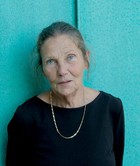
Funzione/Ruolo
Professoressa all'Università della Svizzera italiana. Filosofa. Saggista.
Percorso professionale
Francesca Rigotti si laurea in Filosofia a Milano nel 1974 e ottiene il PhD all'Istituto Universitario Europeo nel 1984. Dopo l'abilitazione all'insegnamento, nel 1991, diventa docente alla Facoltà di Scienze politiche dell’Università di Göttingen come titolare di un ‘Heisenberg Stipendium’ della Deutsche Forschungsgemeinschaft, visiting fellow al Department of Politics dell’Università di Princeton e docente all'Università di Zurigo. Dal 1996 insegna all'Università della Svizzera italiana. Svolge attività di conferenziera, scrive di critica libraria, collabora con la Rete 2 della Radio della Svizzera italiana e scrive o su varie riviste e giornali italiani ed esteri.
Le sue opere monografiche, cui aggiungere un centinaio di saggi su riviste e una quarantina di contributi in volumi collettanei, sono state tradotte in tredici lingue.
Risultati scientifici
La sua ricerca è caratterizzata dalla decifrazione e dall’interpretazione delle procedure metaforiche e simboliche sedimentate nel pensiero filosofico, nel ragionamento politico, nella pratica culturale e nell’esperienza della vita quotidiana.
Attività editoriali e pubblicazioni
(in corso di pubblicazione), F. Rigotti, L’era del singolo, Torino Einaudi
2020, F. Rigotti, Buio, Bologna, il Mulino.
2019, F. Rigotti, Migranti per caso: una vita da Expat, Milano, Cortina.
2018, F. Rigotti, de senectute, Torino, Einaudi.
2015, F. Rigotti, Manifesto del cibo liscio, Novara, Interlinea.
2013, F. Rigotti, Nuova filosofia delle piccole cose , Novara, Interlinea.
2010, F. Rigotti, Partorire con il corpo e con la mente. Creatività, filosofia, maternità, Torino, Bollati boringhieri.
2006, F. Rigotti, Il pensiero pendolare, il Mulino, Bologna.
2002, F. Rigotti, Il filo del pensiero, il Mulino, Bologna.
1999, F. Rigotti, 2004, 2012, La filosofia in cucina, il Mulino, Bologna.
1998, F. Rigotti, L’onore degli onesti, Feltrinelli, Milano.
1992, F. Rigotti, Il potere e le sue metafore, Feltrinelli, Milano.
Riconoscimenti e premi
2001, 24° Premio Letterario Città di Chiavari (per Filosofia in Cucina)
2002, 1° Premio di Filosofia "Viaggio a Siracusa" (per Il filo del pensiero)
2008, Premio Capalbio 2008, sezione Filosofia
2016 “Outstanding Woman Award”
2020 Premio della Fondazione del Centenario della BSI

Funzione/Ruolo
Docente di Storia del Mediterraneo moderno e contemporaneo all’Università di Napoli L’Orientale
Percorso professionale
Si laurea in Storia all’Università di Firenze con 110 e lode. Dopo un’esperienza come archivista all’Archivio Contemporaneo del Gabinetto G.P. Vieusseux, consegue il Ph.D. all’Istituto Universitario Europeo di Firenze (European University Institute, Department of History and Civilisation).
Fin dagli anni del dottorato sottopone i temi della ricerca a confronto intellettuale e comparazione attraverso l’ideazione e curatela di numerosi workshop, seminari, convegni. All’attività accademica affianca iniziative di comunicazione e divulgazione della storia.
Aderisce all’Associazione Italiana di Public History (nata nel 2017) convinta che la disseminazione attraverso vari media degli esiti della ricerca e delle fonti sia non solo un dovere civile dello storico e più ampiamente degli operatori culturali, ma anche la strada maestra per creare cittadinanza attiva e sensibilità alla corretta conservazione e valorizzazione del patrimonio.
Membro del Direttivo SISEM (Società Italiana per la Storia dell'Età Moderna), è consultant scholar nell’ambito del progetto di tutela “Palio di Siena”, su incarico del MIC-DG Archeologia, belle arti e paesaggio, Servizio VI, Tutela del patrimonio demoetnoantropologico e immateriale.
Associata all’Istituto di Storia sull’Europa Mediterranea (ISEM-CNR) per attività di ricerca sui progetti REIRES (Research Infrastructure on Religious Studies) e Tra Mediterraneo e Atlantico: letterati, cronisti, missionari, diplomatici e pionieri, dall’estate 2020 è docente presso l’Università di Napoli L’Orientale.
E' membro del Consiglio Direttivo dell’Associazione per la memoria e la scrittura delle donne “Alessandra Contini Bonacossi” e Scientific advisor dell’Istituto Life Beyond Tourism (Fondazione Romualdo Del Bianco, Firenze).
Risultati scientifici
I suoi centri di interesse sono le forme di controllo dello spazio urbano, l’associazionismo popolare e femminile, i rituali cittadini e le eredità immateriali nella diacronia lunga, l’uso didattico e la valorizzazione delle fonti. Più recente l’attenzione per la public history e le forme del ‘racconto’ museale, in particolare in relazione alla storia delle donne.
Attività editoriali e pubblicazioni
Aurora Savelli è redattrice della rivista “Storia delle Donne” e autrice di numerose pubblicazioni, fra cui le seguenti:
[2019] Savelli A., Online resources for the history of religion: a look at National History Museums and at the House of European History. In “RIME. Rivista dell’Istituto di Storia dell’Europa Mediterranea”, vol. 5/I n.s., 2019, pp. 89-110.
[2019] Savelli A. (cocuratrice, con Gagliardi I.), La didattica della storia di genere: esperienze, metodologie, percorsi, monografico di “Ricerche Storiche”, 2019/n. 2. Con interventi di A. Savelli; A. Chiaiese; L. Gazzetta e F. Bellucci; E. Serafini; I. Biemmi; M. Pacini; M. Calogiuri e D. De Donno; A.F. Celi, M.A. Mannella, L. Vietina; V. Niri; M. Macchi; S. Follacchio; C. Pavone.
[2019] Savelli A. Pratiche di devozione e di governo: appunti su una biografia di Caterina Medici Gonzaga (1593-1629). In: (a cura di): Guerrini M.T., Lagioia V., Negruzzo S., Nel solco di Teodora. Pratiche, modelli e rappresentazioni del potere femminile dall'antico al contemporaneo, Milano, Franco Angeli, pp. 166-179.
[2018] Savelli A. (cocuratrice, con Gagliardi I.), La storia delle donne in percorsi di Public History, monografico di “Storia delle donne” n. 14/2018. Con interventi di: I. Gagliardi e A. Savelli; P. González Marcén e M. Sánchez Romero; I.G. Mastrorosa; M.P. Casalena; C. Da Milano; M. López Fernandez Cao e A. Fernández Valencia; D.E. Clover , N. Taber, K. Sanford; A. Schoenweger; T. Rochat.
[2016] Savelli A., Sodalizi. Forme dell’associazionismo urbano a Siena tra Otto e Novecento, “Nuovi Quaderni di Ricerche Storiche”, Pisa, Pacini [anche e-book].
[2016] Savelli A., Il primato della patria: Baldovina Vestri (1840-1931), l’ultima garibaldina. In «Rassegna Storica Toscana», LXI, n. 1, pp. 93-124.
[2015] Savelli A., Esempi e modelli femminili nella Firenze dell’Ottocento. Gesualda, Cesira e Antonietta Pozzolini. In: Luceri F. (a cura di), Pietro Siciliani e Cesira Pozzolini. Filosofia e Letteratura, Atti del convegno (Galatina, 18-19 settembre), Lecce, Edizioni Grifo, pp. 219-236.
[2013] Savelli A., Contrade, corporazioni e confraternite in età moderna: le fonti del vivere associati. In: Paoli M.P. (a cura di), Nel laboratorio della storia. Una guida alle fonti dell'età moderna, Roma, Carocci, pp. 169-203 (il volume ha avuto due ristampe, nel 2014 e nel 2015 nella collana “Studi superiori”).
[2012] Savelli A., Vigni L. (a cura di), Una città al femminile. Protagonismo e impegno di donne senesi dal Medioevo a oggi, Siena, Nuova Immagine Editrice.
[2012] Savelli A. (a cura di), Toscana rituale. Politica e festa civica dal secondo dopoguerra, Atti del convegno (Firenze, 16 giugno 2009), Pisa, Pacini Editore.
[2009] Savelli A., Tra interessi dinastici e equilibri locali: Caterina Medici Gonzaga Governatrice dello Stato Nuovo (1627-1629). In: Aglietti M. (a cura di), Nobildonne, monache e cavaliere dell’Ordine di S. Stefano. Modelli e strategie femminili nella vita pubblica della Toscana granducale, Atti del convegno (Pisa, 22-23 maggio 2009), Pisa, ETS, pp. 33-56.
[2008] Savelli A., Siena. Il popolo e le contrade (secc. XVI-XX), Firenze, Olschki.
Riconoscimenti e premi
Menzione speciale al “Prix d’histoire locale européenne Étienne Baluze” per la tesi di dottorato Vero popolo, onorata cittadinanza. Comunità di contrada e appartenenza territoriale a Siena (secc. XVI-XXI).

Funzione/Ruolo
Professoressa ordinaria di Storia moderna all'Università degli Studi di Catania.
Percorso professionale
Lina Scalisi si laurea in Scienze Politiche presso l’Università di Catania nel 1992 e ottiene il dottorato in storia moderna nel 1998 presso lo stesso Ateneo. Ricercatore dal 2003, nel 2006 diviene professoressa associata e, dal 2016, ordinaria presso il Dipartimento di Scienze Umanistiche di Catania.
Nel corso della sua carriera ha rivestito numerosi incarichi di governance d’Ateneo ed è stata coordinatrice della classe di Scienze Umanistiche e Sociali della Scuola Superiore dell’Università di Catania. Dal 1998 al 2010 è stata direttrice dell’Istituto Meridionale di storia e scienze sociali - Sicilia. Dal 2013 è Académica correspondiente de la Real Academia de la Historia di Madrid. E’ componente del collegio dei docenti del dottorato in Storia della Scuola Normale Superiore di Pisa e del comitato scientifico di riviste nazionali ed europee. È Presidente dell’Accademia delle belle arti di Catania e vicepresidente del Teatro Stabile di Catania.
Risultati scientifici
Le sue ricerche hanno trattato le storie di comunità e la storia socio-religiosa, con particolare attenzione ai cambiamenti nelle istituzioni civili ed ecclesiastiche della società europea dopo la svolta del Concilio di Trento e al rapporto tra potere politico e autorità religiosa; i temi di storia urbana e di storia dell'aristocrazia nell’Europa dell’età moderna. Particolare interesse ha infine rivolto ai temi dello sviluppo, dell’ambiente e delle migrazioni contemporanee e alla storia della storiografia.
Attività editoriali e pubblicazioni
È autrice di numerosi saggi e monografie tra cui:
[2020] Curatela del II volume in II Tomi de La storiografia della Nuova Italia, Edizioni di storia e letteratura, Roma: 1056 ISBN 9788893593939.
[2020] Regolate cure e disordinati mali, in Arianna Rotondo, Memoria, storie e metafore della malattia. La narrazione come metodo, Algra Editore, Viagrande: 17-34 ISBN 97888934413749.
[2019] (con Carlos Hernando Sanchez) Fra le mura della modernità: le rappresentazioni del limite dal Cinquecento ad oggi, Viella, Roma, 2019: 428 ISBN 9788833132587.
[2019] “Da Palermo a Colonia”. Carlo Aragona Tagliavia e la questione delle Fiandre (1577-1580), Viella, Roma: 156 ISBN: 9788833132297.
[2019] Un Secolo di fuoco. Il Seicento e l’Etna nel Compendio di Natale di Pace, Domenico Sanfilippo Editore, Catania: 175 ISBN 9788885127630.
[2018] Carlo d’Aragona e Antonio del Nobile. Difese militari, imprese economiche,vocazioni territoriali, in A. Camara Munoz – M. A. Vasquez, «Ser hechura de»: ingeniería, fidelidades y redes de poder en los siglos XVI y XVII, Ediciones del Umbral y laFundación Juanelo Turriano, Madrid. 135-146 ISBN 8494892525.
[2018] Curatela del I volume de La Storiografia della Nuova Italia: Introduzione alla storia della storiografia italiana, Edizioni di Storia e Letteratura, Roma: 272 ISBN 9788893592390.
[2018] La restaurazione in Italia, in «Moderna. Semestrale di teoria e critica della letteratura», XX, 1-2:15-22 ISSN.
[2018] “Que pueda llegar a corte”. Il duca di Terranova tra Lepanto e il futuro, in J.A.G. Berrendero, J. Hernandez Franco, E. Alegra Carvajal, Ruy Gómez deSilva, principe de Eboli. Su tiempo y su contexto, Iberoamericana Vervuert, Madrid: 285-303 ISBN 9788416922758.
[2017] La Sicilia del Rinascimento. Susanna Gonzaga, contessa di Collesano, in A.Carrasco Martinez (a cura di), La nobleza y los reinos. Anatomia del poder en la Monarquia de Espana (siglos XVI-XVII), Iberoabericana Vervuert, Madrid: 151-177 ISBN 9788416922093.
[2017] Le catene della gloria. L’uso politico della genealogia di Luigi Guglielmo Moncada, «Magallanica», 3/6: 64-85 ISSN 2422-779X.
[2017] Il Dapifero di Antonino Collurafi. Storia di un’opera perduta (1639-1644), «Mediterranea. Ricerche storiche», 40: 295-314 ISSN 1824-3010.

Funzione/Ruolo
Ricercatrice in Filosofia Politica, Dipartimento di Sociologia e Ricerca Sociale all'Università di Milano-Bicocca.
Percorso professionale
Dopo la laurea in Filosofia all’Università di Torino, consegue il master in Sociologia delle migrazioni all’Università “La Sapienza” di Roma e un dottorato in Studi Culturali all’Università di Palermo. Opera come ricercatrice presso l’associazione Parsec di Roma e per numerose organizzazioni nazionali e internazionali tra cui Save the Children, Open Society Foundations, Action Aid, Consorzio Nova, Room to Read. A partire dal 2012 lavora presso il Dipartimento di Sociologia e Ricerca Sociale dell’Università di Milano-Bicocca, prima come assistente di ricerca e poi come assegnista di ricerca e dal 2019 come ricercatrice in Filosofia Politica. Attualmente è titolare dell’insegnamento “La politica e le politiche”, è docente e membro del comitato di coordinamento del corso di perfezionamento post-laurea “Violenza contro le donne e i minori: conoscere e contrastare il fenomeno”, e co-cordinatrice del corso “Formare le operatrici/gli operatori sociali per il contrasto alla violenza di genere”.
Risultati scientifici
È impegnata nelle attività di ricerca e formazione del Centro di ricerca ADV – Against Domestic Violence e nelle attività di costruzione del network UN.I.RE - UNiversità In REte contro la violenza di genere - progetto finanziato con il contributo della Presidenza del Consiglio dei Ministri - Dipartimento per le Pari Opportunità.
Attività editoriali e pubblicazioni
Giorgia Serughetti è editorialista del quotidiano Domani e scrive per riviste e quotidiani quali InGenere, Leggendaria, il Mulino, il Manifesto.
[2020] Serughetti G, Who are « the people » in Italy’s multiple populisms?. REVUE TUNISIENNE DE SCIENCE POLITIQUE, vol. 2 (4): 71-95.
[2020] Serughetti G, Donne vulnerabili, soggetti resilienti: le vittime di tratta richiedenti asilo, tra bisogni di protezione e domande di riconoscimento. In I. Fanlo Cortés, & D. Ferrari (a cura di), I soggetti vulnerabili nei processi migratori. Giappichelli: 17-48.
[2020] Serughetti G, The #MeToo Movement in Italy: Chronicle of a Death Foretold?. In A.M. Noel, & D.B. Oppenheimer (a cura di), The Global #MeToo Movement : How Social Media propelled a Historic Movement and the Law responded. Full Court Press: 143-156.
[2020] Serughetti G, Democratizzare la cura / Curare la democrazia, Nottetempo.
[2020] Belliti D, Serughetti G, L'educazione per prevenire la violenza di genere e promuovere l'agency delle donne: lo stato delle politiche pubbliche in Italia. SICUREZZA E SCIENZE SOCIALI, 3: 33-48.
[2019] Serughetti G, Prostituzione: violenza o lavoro? Riflessioni su volontarietà, costrizione e danno nel dibattito sulle alternative politico-normative. AG-ABOUT GENDER, vol. 8 (15): 164-195.
[2019] Serughetti G, La violenza contro le donne e il problema dell’identità collettiva nel femminismo. POLITICA & SOCIETÀ, vol. 8 (3): 383-405.
[2019] Serughetti G, Uomini che pagano le donne. Dalla strada al web, i clienti nel mercato del sesso contemporaneo, 2. ed. Ediesse.
[2019] Serughetti G, “Superare la Merlin”: prostituzione, discorso pubblico e azione legislativa. NOTIZIE DI POLITEIA, vol. 35 (133): 198-216.
[2018] Serughetti G, Smuggled or Trafficked? Refugee or job seeker? Deconstructing rigid classifications by rethinking women’s vulnerability. ANTI TRAFFICKING REVIEW, 11: 16-35.
[2017] Cecilia D’Elia, Serughetti G, Libere tutte. Dall’aborto al velo, donne nel nuovo millennio, Minimum fax.
[2016] Serughetti G, Prostitution and surrogacy: Theoretical and practical issues of (neo) prohibitionism. STUDI SULLA QUESTIONE CRIMINALE, 11(2): 43-63.

Funzione/Ruolo
Professoressa ordinaria di Storia contemporanea presso il Dipartimento di studi Umanistici dell’Università di Pavia.
Percorso professionale
Elisa Signori si laurea con lode in Lettere nel 1976 all’Università di Pavia. E’ alunna e perfezionanda presso il Collegio Ghislieri, borsista della Fondazione Einaudi di Torino, dell’Accademia dei Lincei, Stagiaire presso l'Ufficio Studi e Ricerche del Dipartimento della Pubblica Educazione del Canton Ticino (Svizzera), borsista del CNR presso l’Historische Seminar dell’Università di Basilea, dal1981è ricercatrice presso l’Università di Pavia. Qui svolge la sua attività fino ad oggi, percorrendo tutti i gradi della carriera, da professoressa associata a ordinaria. Tra il 2013 e il 2020 insegna Storia contemporanea anche presso l’Università della Svizzera italiana.
Risultati scientifici
Signori ha dedicato gran parte dei suoi studi allo studio del fascismo e dell’antifascismo, sia in Italia che all’estero, in Francia, Svizzera, Stati Uniti. Ha studiato la storia della Svizzera nei suoi rapporti con l’Italia tra Otto e Novecento, il fenomeno dell’antisemitismo in Italia e in Europa, i flussi di migrazioni intellettuali e la formazione delle élites in Europa nel sec.XX.
Si è occupata anche di storia della Lombardia contemporanea e di storia dell’Università.
Attività editoriali e pubblicazioni
Elisa Signori è autrice di numerose pubblicazioni, di cui si trova lista completa a questo indirizzo https://iris.unipv.it/
Di seguito, una selezione delle più rilevanti:
Signori (2020). Anni di svolta. L’Università di Pavia, i progetti postbellici e il piano De Carlo, in Costruire le Università. Aspetti architettonici e urbanistici tra ragioni economiche e scelte politiche, a cura di M.A.Romani, A.Monti, O.Selvafolta e Andrea Silvestri, Bologna Il Mulino, pp.181-206.
Signori (2019), Contro gli studenti ebrei stranieri di Pisa. Un ostracismo in anticipo, in Vite sospese. 1938: Università e ebrei a Pisa, a cura di M. Emdin, B. Henry , I. Pavan, UPI University Press Italiane, Pisa, pp. 89-106
Signori (2018), Svizzera e Italia allo specchio: lo sguardo dei rifugiati italiani durante la seconda guerra mondiale in Lugano città aperta, collana Pagine storiche Luganesi, Edizioni Città di Lugano, Lugano, pp.203-219
Signori (2017), L’Ateneo di Pavia nel sistema universitario del Regno d’Italia (1860-1913) in Almum Studium Papiense, Vol.2, Dall’età austriaca alla nuova Italia. II. Dalla Restaurazione alla Grande guerra, Milano, Cisalpino, 2017, pp. 1043-1080.
Signori (2017), University students after Italian Unification. Riots, organizations and political engagement (1860-1885) in Pieter Dhondt (ed.), Student Revolt, City and Society in Europe – From the Middle Ages to the Present, New-York, London, Routledge, pp.152-169.
Signori (2017), Perchè la guerra? Voci e argomenti della comunità accademica italiana 1914-1918 in Minerva armata. Le università e la Grande guerra, a cura di G.P.Brizzi e E.Signori, Bologna, Clueb, pp.19-38.
Signori (2017), Guglielmo Ferrero: l’interventismo, la federazione latina, la tragedia della pace, in La Grande guerra e l'idea di Europa, a cura di C. Lacaita, Milano, Angeli, pp. 81-110.
Signori (2016), El fascismo italiano y la universidad: el caso de Pavia, in La universidad europea bajo las dictaturas, “Ayer” , n. 101, pp.23-50.
Signori (2009) , Fra le righe. Carteggio fra Carlo Rosselli e Gaetano Salvemini, FrancoAngeli, Milano, pp.334.
Signori (2006) Frammenti di vita e d’esilio. Giulia Bondanini, una scelta antifascista, L’Avvenire dei lavoratori ed., Zürich, pp.176.
Signori (2002), Minerva a Pavia. L'ateneo e la città tra guerre e fascismo, Pavia, Milano-Bologna, Cisalpino ed., pp.342.
Signori (1996) , G. Salvemini, A. Tasca, Il dovere di testimoniare .Carteggio, a cura e con introduzione di E.Signori, Roma-Napoli, Bibliopolis ed., pp.344.
Riconoscimenti e premi
A Elisa Signori sono stati assegnati il premio “Nuova Antologia”e il premio “Angelini".
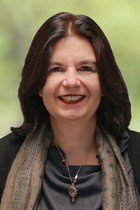
Area Storia e Filosofia
Competenze: filosofia, filosofia politica, filosofia sociale, religioni, storia del pensiero politico, studi di genere
Parole chiave: genere, populismo, post-coloniale/decoloniale, religione, secolarizzazione/post-secolarizzazione, sfera pubblica, società civile, teologia
Regione: ESTERO
Funzione/Ruolo
Professoressa di Teoria politica alla New York University di Firenze, attualmente Visiting alla facoltà di Studi Liberali presso la New York University di Shangai
Percorso professionale
Spini si laurea in Filosofia Politica presso l’Università di Firenze nel 1991. Nel 1995 si perfeziona in Storia dle Pensiero Politico presso la Scuola di Studi Superiori “Sant’Anna” di Pisa. Dal 1998 insegna Teoria politica alla Syracuse University di Firenze e alla New York University in Firenze. Fra il 2003 e il 2019 è più volte Professoressa a Contratto presso la Facoltà di Scienze Politiche dell’Università di Firenze in Filosofia Sociale, nel Corso di Laurea in Sociologia e Ricerca Sociale, dove insegna Filosofia sociale dal 2007 al 2011,e Filosofie della Sfera Pubblica dal 2003 al 2007.
Attualmente è Visintg Assistant Professor alla faclotà di Studi Liberali della New York University a Shangai.
Spini fa parte del Centro Studi «Confronti» (https://confronti.net), della Commissione Studi della Federazione Chiese Evangeliche in Italia (https://www.fcei.it/chiese-e-societa/)
e del Direttivo del Forum per i Problemi della Pace e della Guerra. (https://www.facebook.com/firenzeonlineforum/).
E' Presidente del Centro Culturale Protestante Pietro Martire Vermigli di Firenze (https://www.facebook.com/CentroCulturaleProtestanteVermigli/ e membro della società Italiana di Teoria Critica e della Società Italiana di Filosofia Politica.
Risultati scientifici
Le ricerche di Debora Spini si sono in un primo momento concentrate sulla teologia protestante e sul pensiero politico contrattualista nella prima modernità: l'interazione fra teologia e politica è una linea di ricerca tuttora presente nel suo lavoro. In seguito i suoi interessi si sono concentrati sulle trasformazioni della sfera pubblica nell'età della globalizzazione includendo un importante lavoro su Civil society in the European Unione il progetto GARNET Identity and Legitimacy coordinato da F. Cerutti e S. Lucarelli
Attualmente le sue ricerche concernono il ruolo dei gruppi religiosi nella sfera pubblica, secolarizzazione e post secolarizzazione, monoteismo e violenza, e ascesa del populismo xenofobo, con particolare attenzione ai problemi di genere. Spini ha inoltre lavorato sulla violenza di genere; ha organizzato varie conferenze su questo argomento per New York University in Florence, dando origine a una vasta rete di studios* e attivist*. Al momento si sta occupando del rapporto fra violenza di genere e migrazione, nel quadro del progetto Women and Migration coordinato da D. Willis e E. Toscano (New York University).
Ha anche sviluppato un interesse specifico sulla politica indiana in quanto terreno di sperimentazione specialmente significativo per molte contraddizioni della modernità; è spesso ospite di diverse istituzioni accademiche in India, per conferenze e convegni.
Attività editoriali e pubblicazioni
[2021]Civil religion, uncivil society. A reflection on Baba Sahib Dr. B.R. Ambedkar’s conception of a ‘religion for civil society’ in B.R. Ambedkar: The Quest for Justice edited by A. Rathore Singh, OUP.
[2020] Decolonizing Postsecularization, in «Annali di Studi Religiosi», 21, , pp. 167-179.
[2020] Post – secolarizzazione e regressione politica. Cosa possiamo imparare dal caso del populismo di destra, in «Iride», Gennaio 2020, pp. 369-381; Populismo e religione, in B. Henry, A. Loretoni, A. Pirni, M. Solinas, a cura di, Manuale di Filosofia politica, Milano, Mondadori, pp. 332-342.
[2019] Religion in the European Public Spheres, in L. Leonardi, G. Scalise, Social Challenges for Europe, pp. 127-141.
[2019] Unveiling Violence: Gender and Migration in the Discourse of Right Wing Populism in Women and Migration: Responses in Art and History, D. Willis, E. Toscano and K. Brooks Nelson (Openbook publishers, pp.135-154.
[2018] «Reformatio» and «Renovatio». A Relation between Sources and Future, in «Annali di Studi Religiosi», 19, pp. 95-111.
[2018] Elective Affinities and liaisons dangereuses. Luther’s Heritage and the New Spirit of Capitalism in «Journal of Interdisciplinary History of Ideas», vol. 7, n. 13 https://doi.org/10.13135/2280-8574/2836.
[2018] Dio del popolo o popolo di Dio. Appunti per un’analisi del rapporto fra populismo e religione in N. Urbinati, P. Blokker, M. Anselmi, a c.d, Populismo di Lotta e di Governo, Milano, Feltrinelli.
[2017] A call to loyalty. Women bodies, Playground and Battlefields, in «Soft Power. Revista Euro-americana de teoria y historia de la politica y del derecho».
[2016] La coscienza protestante, Claudiana, a c.d., (con Bein Ricco E.), Claudiana.
[2010] Civil society and international governance, a c.d., con Armstrong D, Bello V, Gilson J, Routledge.
[2006] La società civile post nazionale. Meltemi.
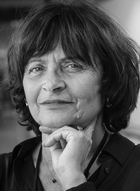
Funzione/Ruolo
Professoressa ordinaria di Teoria politica alla Columbia University di New York.
Percorso professionale
Nadia Urbinati. È Professoressa ordinaria di Political Theory alla Columbia University in the City of New York. Ha coinseguito la laurea in Filofia all’Unoversità degli Studi di Bologna e il Dottorato di Ricerca in Scienze Politiche e Sociali all’Istituto Universitario Europeo di Firenze. E’ stata fellow di importanti istituzioni inernazionali come l’Institute for Advanced Study di Princeton (School of Social Science) e il University Center for Human Values in Princeton. Ha insegnato presso NewYork University, The New School for Social Research, University of Pennsylvania, San Universidade Estadual de Campinas (UNICAMP) in Brasile, Sciences Po (Parigi), Università Bocconi e Università San Raffaele. E’ visiting professor permanente alla Scuola Universitaria Superiore Sant’Anna di Pisa. Ha tenuto lezioni nelle maggiori università europee, statunitensi, australiane e canadesi. E’ membro del consiglio scientifico di diverse istituzioni di ricerca e scientifiche e di riviste accademiche, in Europa e negli Stati Uniti, e consulente presso istituti di ricerca in Europa e negli Stati Uniti. Nel 2013 è stata nominate dal Presidente del Consiglio membro della Commissione di esperti per le Riforme istituzionali.
Risultati scientifici
Gli interessi di ricerca di Nadia Urbinati si concentrano sul pensiero politico moderno e contemporaneo, con particolare attenzione al liberalismo e alla democratica, le teoria della rappresentanza politica e della sovranità, e più di recente al populismo.
Ha contribuito alla rinascita della rappresentanza politica nella teoria democratica; ha elaborato una definizione del populismo al potere come forma di democratica fondata su una rappresentana diretta del leader.
Attività editoriali e pubblicazioni
Ha contribuito con numeri saggi a diversi volumi collettanei in inglese sulla rappresentanza, la partecipazione, la democrazia. Ha pubblicato numerosi articoli nelle riviste accademiche “American Political Science”, “Political Theory”, “Constellations”, “Philosophy and Social Thought”, “Micromega”, “Iride”, “Raison Politique”, “Lua Nova”, “Rivista di filosofia”, “Rivista critica di storia della filosofia”.
Libri di cui è sola autrice:
[2021] Me the People. How Populism Transforms Democracy, Harvard University Press.
[2020] I pochi contro i molti. Il conflitto politico nel ventunesimo secolo, Laterza.
[2019] Me The People: How Populism Transforms Democracy. Harvard University Press. (tradotto in italiano, in spagnolo e in arabo).
[2017] Articolo 1, Carocci.
[2015] The Tyranny of the Moderns, Yale University Press.
[2014] Democracy Disfigured: Opinion, Truth and The People, Harvard University Press (tradotto in italiano, in turco, in russo).
[201]. Democrazia in diretta. Le nuove sfide della rappresentanza, Feltrinelli.
[2011] La mutazione antieguaglitaria, Laterza.
[2011] Liberi e uguali. Contro l’ideologia individualista, Laterza.
[2007] Ai confini della democrazia. Oppurtunità e rischi dell’individualismo democratico (Donzelli) 2006. Representative Democracy: Principles and Genealogy, Chicago University Press (tradotto in italiano e spagnolo).
[1991] Le civili libertà. Positivismo e liberalismo nell’Italia Unita, Marsilio.
Libri di cui è coautrice:
[2020] (con L. Vandelli), Democrazia e sorteggio, Einaudi (alcuni capitoli tradotti in francese).
[2017] (con M. Marzano), La società orizzontale. Liberi senza padri, Feltrinelli.
Libri di cui è curatrice:
[2019] Thinking Democracy Now. Annale Feltrinelli edited, Feltrinelli.
[2000] (a cura di e introdotto da), Piero Gobetti, On Liberal Revolution, Yale University Press.
[1994] (a cura di e introdotto da), Carlo Rosselli,Liberal Socialism, Princeton University Press.
Libri di cui è co-editrice:
[2012] (con S. Luke), Condorcet: Political Writings, Cambridge University Press.
[2009] (con G. Recchia), Giuseppe Mazzini on Nation Building, Democracy, and Intervention, Princeton University Press (tradotto in italiano).
Riconoscimenti e premi
1991-92. Premio CNR per la miglior ricerca nella classe di Filosofia politica.
2002. Il suo libro Mill on Democracy: From Athenian Polis to Representative Government ha ricevuto il David and Elaine Spitz Prize come miglior monografia pubblicata in quell’anno sul pensiero democratico e liberale.
2008. Lenfest Distinguished Columbia Faculty per la ricerca e la didattica.
2008 il Presidente della Repubblica le ha conferito l’onoreficenza di Commendatore della Repubblica Italiana con la seguente motivazione: "Attraverso la sua attività accademica e le sue pubblicazioni ha dato un sifnificativo contributo all'approfondimento del pensiero democratico e alla promozione di scritti di tradizione liberale e democratica italiana all'estero".
2020. Premio Capalbio per la Saggistica politica al libro Io, il popolo come il populismo trasforma la democrazia.
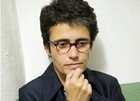
Funzione/Ruolo
Associata con incarico di ricercatrice emerita dell’ISEM–CNR. Docente del Dottorato di ricerca "Fino" e Professoressa ordinaria di Filosofia Teoretica all'Università di Genova e Alumna King's College London.
Percorso professionale
Nicla Vassallo si laurea presso l’Università di Genova e si specializza in Filosofia avanzata al King’s College - University of London. Dopo aver conseguito il dottorato di ricerca in Filosofia della Scienza, lavora prima come research fellow e poi come ricercatrice. Nel 2002 ottiene l'Idoneità da Professoressa Associata in Logica e Filosofia della Scienza presso l'Università di Catania, e nel 2004 l'Idoneità da Professoressa Ordinaria in Filosofia Teoretica presso l'Università di Bergamo. Tra il 2003 e il 2008 è Visiting Professor presso la facoltà di Psicologia dell’Università Vita-Salute di Milano, dove insegna Epistemologia. Dal 2005 ricopre il ruolo di Professoressa Ordinaria presso il Dipartimento di Filosofia (ora Dafist) dell'Università di Genova insegnando Propedeutica filosofica, Filosofia della Conoscenza ed Epistemologia. Attualmente insegna Filosofia Teoretica e fa parte del corpo docente del Dottorato in Filosofia denominato "Fino", un Consorzio che comprende quattro Università (Genova, Pavia, Piemonte Orientale, Torino). È Associata con incarico di ricercatrice emerita dell’ISEM–CNR e Alumna al King's College London.
Risultati scientifici
L’ambito di lavoro di Nicla Vassallo è la Filosofia analitica, in particolare le aree di ricerca e insegnamento su cui si è focalizzata sono Epistemologia, Metafisica, Filosofia della Conoscenza e Studi di Genere.
Negli ultimi anni è stata responsabile di sette progetti di ricerca per il CNR (Consiglio Nazionale delle Ricerche). È stata membro del consiglio direttivo della SIFA (Società Italiana di Filosofia Analitica), del Centro Studi Urbani, del CRESA (Centro di Ricerca in Epistemologia Sperimentale e Applicata); del comitato scientifico del Comitato permanente di consulenza del Forum per le politiche di genere dell'Università di Padova, di O.N. DA (Osservatorio Nazionale sulla Salute della Donna), di Sapere, del Portale Tematiche LGBT (Consiglio dei Ministri, Dipartimento Pari Opportunità, Ufficio Nazionale Antidiscriminazioni Unar), del Consiglio dei Referee del CIVR (Comitato per la Valutazione della Ricerca) per VTR (il primo Esercizio Italiano di Valutazione della Ricerca). Già referente del Miur per il "Programma per Giovani Ricercatori - Rita Levi Montalcini" nel 2010, per la VQR (Valutazione della Qualità della Ricerca delle Università) e per Futuro in Ricerca dal 2011 al 2013.
Attività editoriali e pubblicazioni
Oltre a contribuire regolarmente alle pagine culturali di vari giornali, riviste e blog, Nicla Vassallo ha lavorato e lavora come referee per pubblicazioni ed editori di rilievo nazionale e internazionale tra cui Carocci, Codice Edizioni, Dialectica: International Journal of Philosophy, Editori Laterza, Epistemologia: Rivista Italiana di Filosofia della Scienza, European Journal of Analytic Philosophy, FrancoAngeli, Giulio Einaudi Editore, il Saggiatore, Iride: Filosofia e discussione pubblica, Iris: European Journal of Philosophy and Public Debate, Mind & Society, Nordicum-Mediterraneum, Rivista di Estetica, Rivista di Filosofia Neo-Scolastica, Teoria politica, Ulisse Biblioteca.
È membro del comitato scientifico e di redazione di diverse riviste scientifiche nazionali e internazionali ed è autrice di più di centocinquanta articoli in italiano e in inglese apparsi in riviste filosofiche, curatele, atti di convegni ed enciclopedie; ha pubblicato trenta volumi.
Tra i suoi ultimi lavori come autrice unica:
(2019) Non Annegare: Meditazioni sulla conoscenza e sull'ignoranza. Mimesis, Milano.
(2015) Il matrimonio omosessuale è contro natura: falso!. Laterza, Roma-Bari.
(2015) Breve viaggio tra scienza e tecnologia, con etica e donne. Orthotes, Napoli-Salerno.
(2012) Conversazioni. Mimesis Edizioni, Milano.
(2011) Per sentito dire. Conoscenza e testimonianza. Feltrinelli, Milano.
Tra gli ultimi lavori come co-autrice:
(2021) Fatti non foste a viver come bruti. Brevi e imprecise itinerary per la filosofia della conoscenza, Mimesis, Milano.
(2019) Contextualism, Factivity and Clousure". Springer, Heidelberg, New York, Dordrecht, London.
(2015) Frege on Thinking and Its Epistemic Significance. Rowman & Littlefield, Lexington.
(2010) Piccolo trattato di epistemologia. Codice Edizioni, Torino.
Tra i più recenti lavori che ha curato:
(2022) Parla come mangi. Massa e potere. Mimesis, Milano.
(2021) Fatti non foste a viver come bruti. Mimesis, Milano.
(2017) La donna non esiste. E l'Uomo? Sesso, Genere e identità. Codice Edizioni, Torino.
(2009) Donna m'apparve. Codice Edizioni, Torino.
Tra i più recenti titoli che ha co-curato:
(2017), “Philosophy of sex and gender in gender-medicine”, Topoi: An International Review of Philosophy, 36 (3), Springer, Heidelberg, New York, Dordrecht, London.
(2016) Meta-Philosophical Reflection on Feminist Philosophies of Science. Springer, Heidelberg, New York, Dordrecht, London.
(2012) Reason and Rationality. Ontos Verlag, Frankfurt.
(2011) Terza cultura. il Saggiatore, Milano.
Nicla Vassallo ha anche pubblicato tre volumi di poesie:
(2021) Pandemia amorosa dolorosa. Mimesis, Milano.
(2017) Metafisiche insofferenti per donzelle insolenti. Mimesis, Milano.
(2013) Orlando in ordine sparso. Mimesis, Milano.
L'elenco completo e aggiornato delle pubblicazioni è disponibile online, qui: https://www.niclavassallo.net/
Riconoscimenti e premi
Nel 2011 è stata insignita del Premio Filosofico “Viaggio a Siracusa” in virtù della sua opera Per sentito dire. Conoscenza e testimonianza.
In quanto appartenente, in qualità di Professoressa ordinaria, al settore di Filosofia Teoretica dell’Università di Genova, è stata classificata dalla VQR (Valutazione della qualità della ricerca) al primo posto sul piano nazionale per gli anni 2004-2010.



